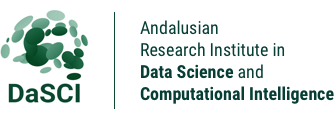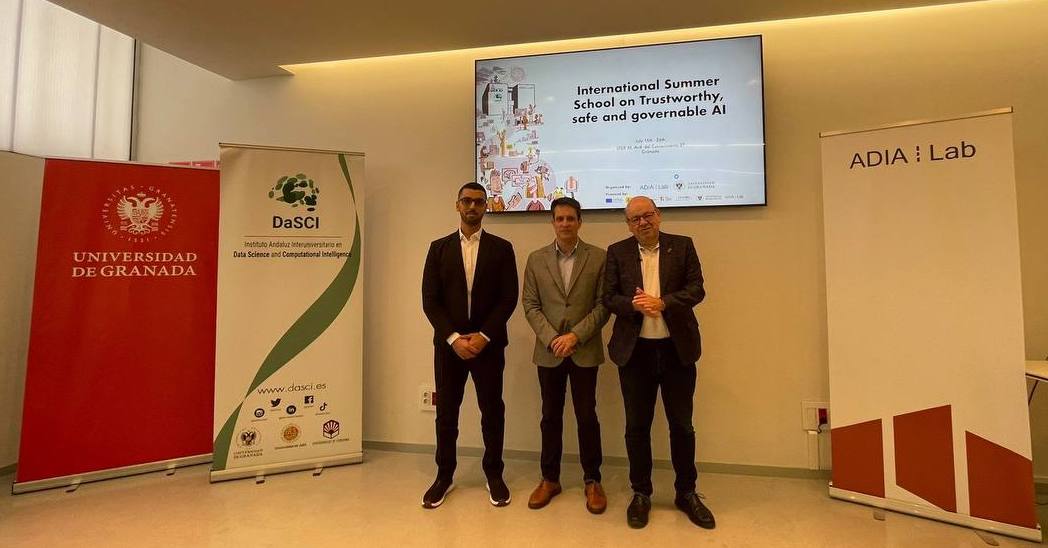
The International Summer School organised by the University of Granada and ADIA Lab will shape the future of safe and reliable AI
17 July, 2024
- An article published by DaSCI researchers four years ago on the same topic of the summer school has now reached more than 7,200 citations, which is a great impact in its field.
- More than fifty researchers from all over the world attend the international summer school, where some of the most prominent figures of the moment are giving lectures.
The city of Granada welcomes experts and students from all over the world to the International Summer School organised by ADIA Lab and the University of Granada with the theme Trustworthy, Safe, and Governable AI. The course was inaugurated by Manuel González Bedia, Director General of Strategic Planning for Digital Transformation, Enrique Herrera-Viedma, Vice Rector for Research and Transfer, Francisco Herrera, Director of DaSCI, professor at the UGR and PI of the INCIBE project in which these conferences are framed, and Abdulla AlKetbi, President of the ADIA Lab Operations Council.
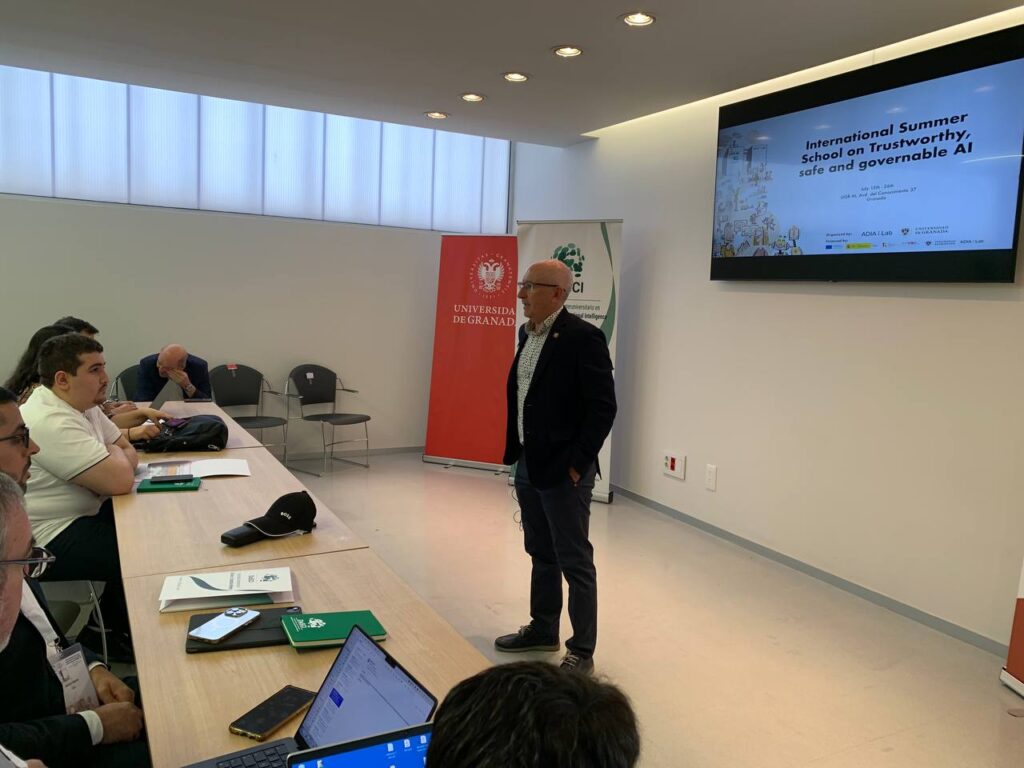
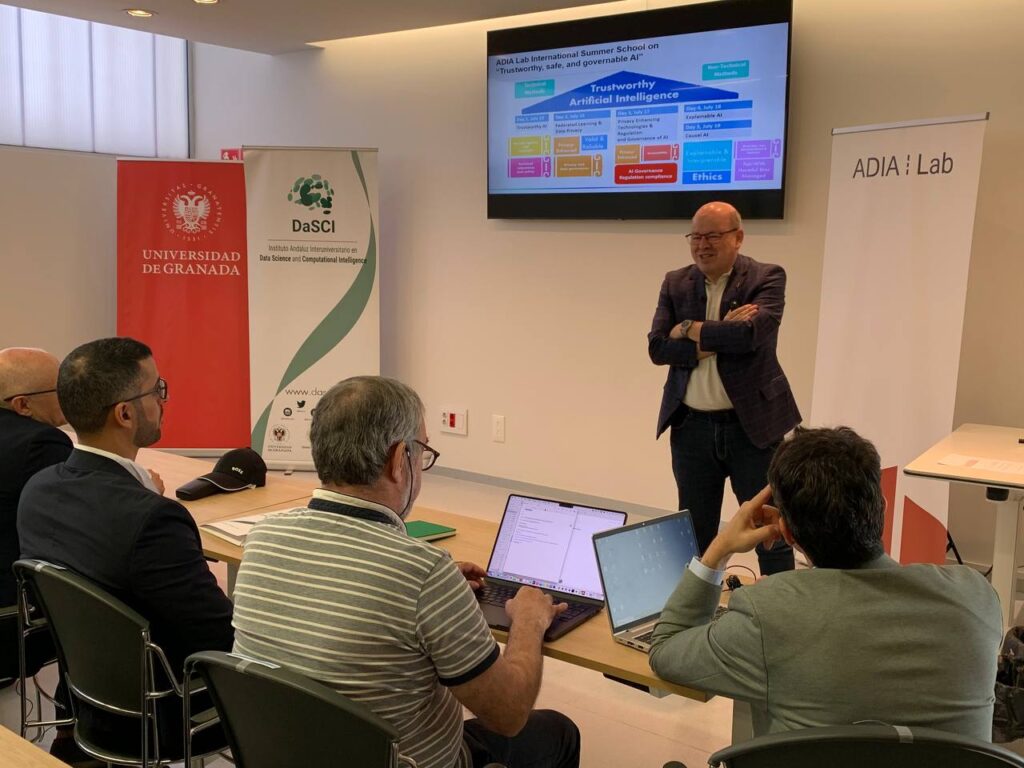
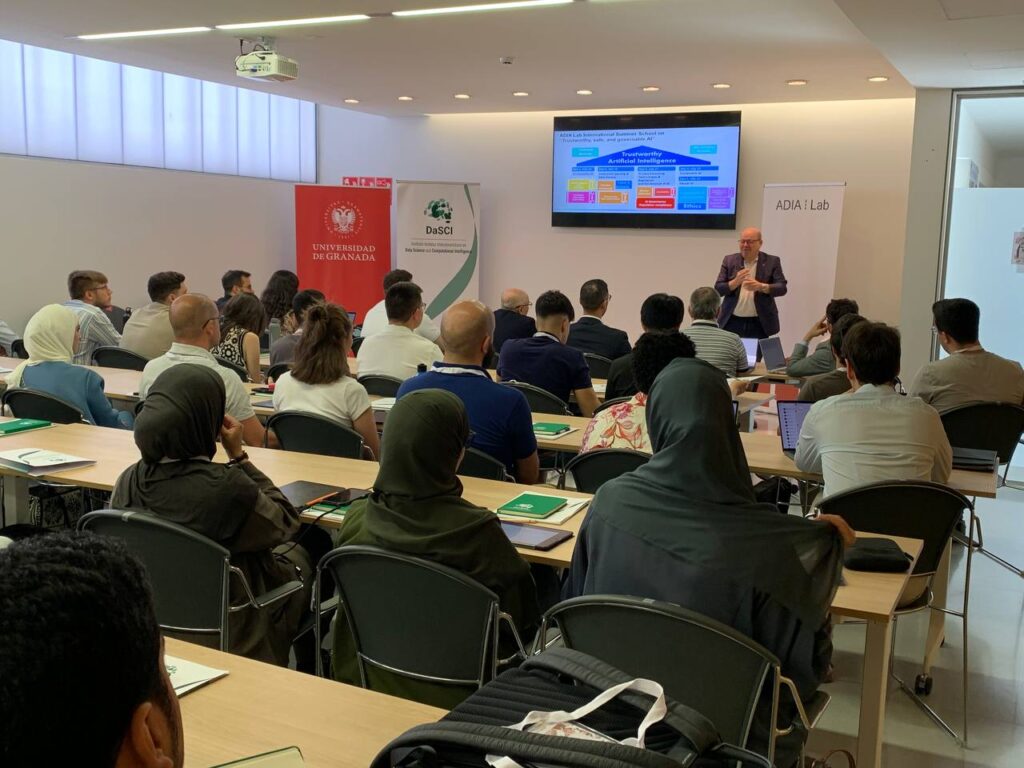
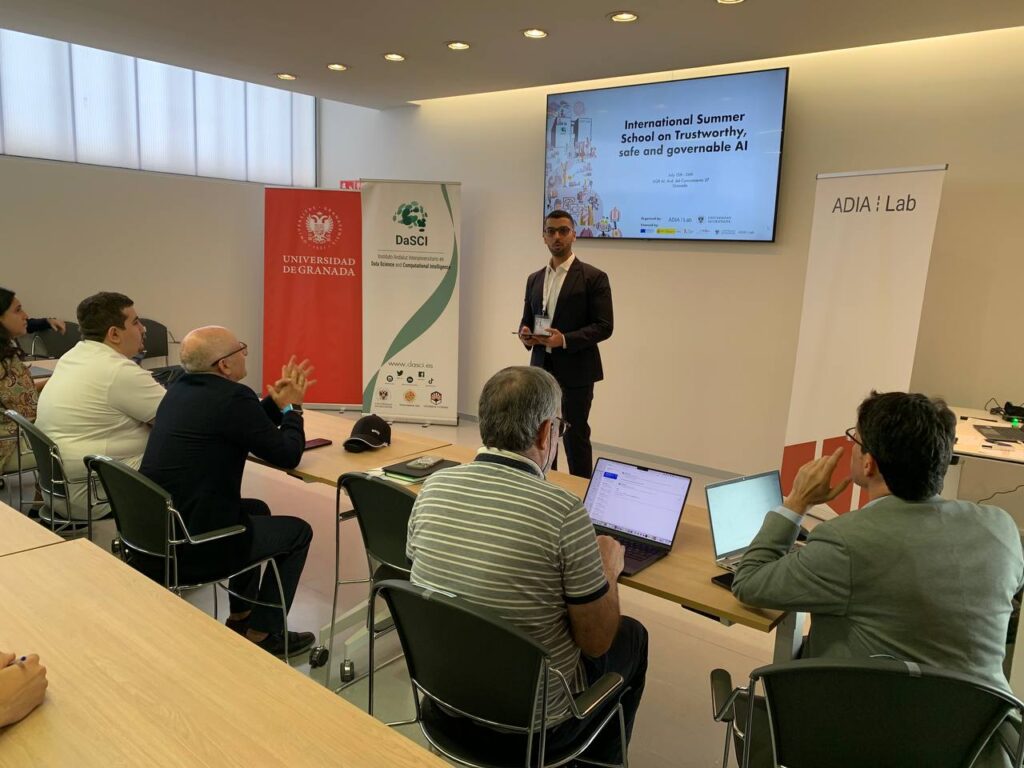
The summer school, which runs until 26 July, will address the challenges and opportunities in the field of explainable AI (XAI), an area that has become increasingly relevant in recent years. The growing interest in the subject is reflected in the number of citations and the attention received by articles in this area, such as the article Explainable Artificial Intelligence (XAI): Concepts, Taxonomies, Opportunities and Challenges toward Responsible AI, published four years ago by the team of researchers from Granada, led by Francisco Herrera, which has been a benchmark in this field, accumulating more than 7,200 citations to date.
The lectures will be held in the recently opened UGR IA building located in the Granada Health Technology Park, which is also the headquarters of the Andalusian Inter-University Institute in Data Science and Computational Intelligence and the AI Granada Foundation. The summer school is attended by more than 50 students from all over the world (17 from the United Arab Emirates, 11 from the University of Granada and the rest from places as diverse as the Universities of Deusto, Pablo de Olavide, Córdoba, Jaén, Politécnica de Madrid, Oberta de Catalunya, País Vasco or Navarra within Spain, and from Zurich, Cincinnati, Dakota, Coimbra or El Valle Colombia outside our country).
Programme and Objectives
The summer school programme will include keynote lectures, hands-on workshops and networking sessions, with the participation of leading researchers and industry professionals. Attendees will have the opportunity to explore topics such as the principles of trust and safety in AI, bias detection and mitigation, as well as ethical considerations in AI, the importance of explainability in AI systems, advanced topics in generative AI and their implications for trust as well as privacy and data governance and AI regulation.
Speakers include Francisco Herrera, Carme Artigas, co-chair of the United Nations Advisory Body on Artificial Intelligence and former Secretary of State for Digitalisation and Artificial Intelligence, Merouane Debbah, director of the 6G Research Centre, Computer and Communications Engineering at the Khalifa University of Science and Technology in Abu Dhabi (UAE) and Shafi Goldwasser, director of the Simons Institute for Computational Theory at UC Berkeley (USA), among others. The industrial sector will also be present with representatives from Minsait, Adigital, Google, Repsol, CausaLens, Nazaries and Thales.
UGR and Granada, epicentre of AI this summer
‘This Summer School is a crucial step in fostering international research on AI. Ensuring trust and security in AI systems is essential as they affect critical areas of our lives. This event brings together experts from around the world to explore the ethical, technical and social dimensions of AI, equipping participants with the tools they need to develop responsible AI technologies that benefit society,’ says Horst Simon, Director of ADIA Lab.
‘Building trust in AI models starts with understanding them, which makes explainable AI crucial. The ADIA Lab Summer School in Trustworthy AI, in collaboration with the University of Granada, offers a unique opportunity to learn from leading experts and gain hands-on experience in explainable and ethical AI’ says Chairman of the Board of Operations ADIA Lab.
Enrique Herrera-Viedma, Vice Rector for Research and Transfer, highlighted the role of Granada and its University in research and transfer of AI to society, especially in the research and teaching hub that is the Granada Health Technology Park.
For his part, Francisco Herrera stressed: ‘Granada becomes the epicentre of AI this summer, and we are proud to host such a relevant and necessary event in the current context’.
The Andalusian Inter-University Institute in Data Science and Computational Intelligence, known as DaSCI, is a collaborative entity between the universities of Granada, Jaén and Córdoba. It is dedicated to advanced research and training in the field of Artificial Intelligence, with a particular focus on Data Science and Computational Intelligence. The institute brings together an outstanding group of researchers working on joint projects, promoting the development and application of innovative technologies in various sectors. With the aim of becoming a benchmark in its field, the DaSCI promotes the transfer of scientific knowledge to the socio-economic environment, thus contributing to technological progress and the digitisation of industry. https://dasci.es/es/
More information:
– Explainable Artificial Intelligence (XAI): Concepts, Taxonomies, Opportunities and Challenges toward Responsible AI. Alejandro Barredo Arrieta, Natalia Díaz-Rodríguez, Javier Del Ser, Adrien Bennetot, Siham Tabik, Alberto Barbado, Salvador García, Sergio Gil-López, Daniel Molina, Richard Benjamins, Raja Chatila, Francisco Herrera . Information Fusion (2020). https://doi.org/10.1016/j.inffus.2019.12.012
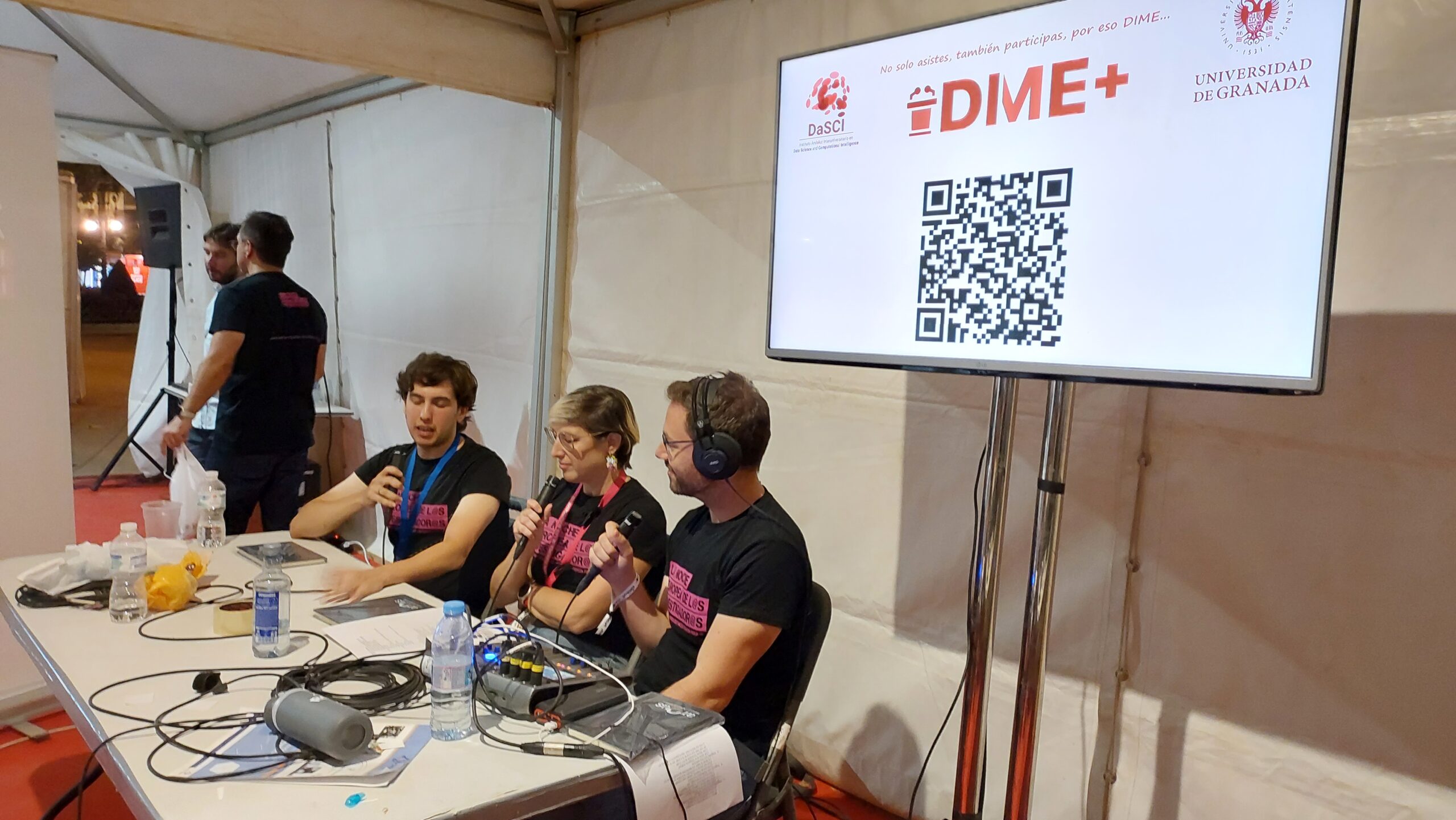
DIME+, a system for assessing the impact of public outreach and citizen science activities
8 July, 2024
- DIME+ is a decision support system for organisers of outreach events, especially Citizen Science events.
- An application developed at the University of Granada that allows to have and analyse the feedback of the attendees to the events, it has already been tested in the European Researchers’ Night.
Researchers at the University of Granada have developed an online linguistic decision support system based on citizen participation. One of the authors is researcher Jerónimo Durán, who will defend his doctoral thesis this week at the UGR IA building.
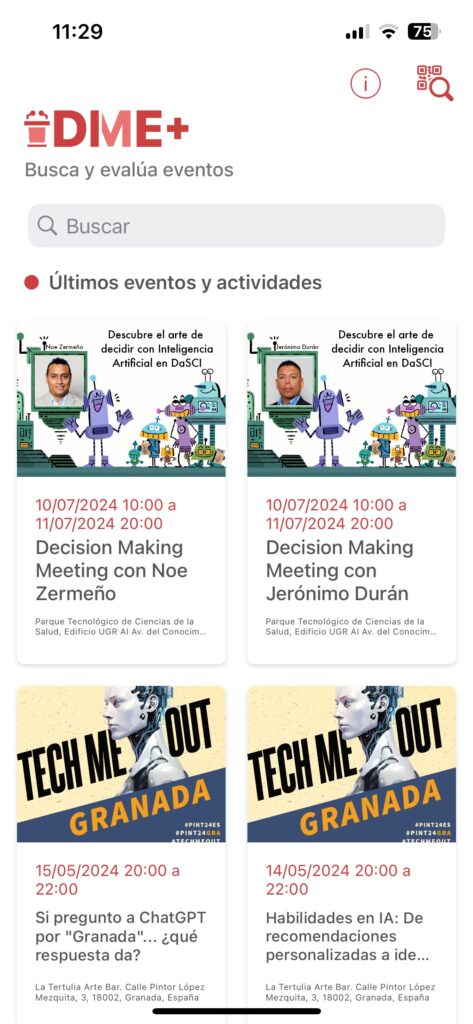
The science outreach and efforts to increase citizen participation have brought research closer to society and inspired new careers in STEM. In virtual events, it is now easier to monitor participation and obtain feedback through online surveys. However, in face-to-face events and crowded contexts, there is no technological solution for gathering attendee feedback on a given event.
DIME+ is the name of the mobile application and is a decision support system for organisers of outreach events, especially citizen science events. The system has already been tested in the European Researchers’ Night event and in the activities developed by the DaSCI institute in the cities of Granada, Jaén and Córdoba.
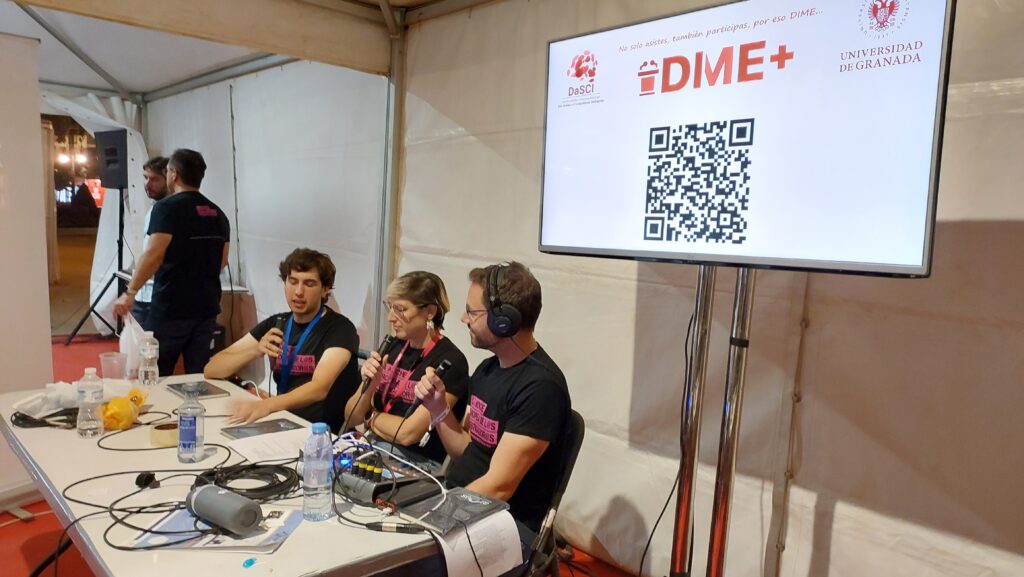
The European Researchers’ Night is the largest dissemination event held in Andalusia, coordinated by the Descubre Foundation and involving dozens of institutions that receive thousands of visits each year. An event in which to discover the more human side of research through direct contact with the experts themselves and which is attended each year, in Granada alone, by more than 15,000 people.
DIME+ is based on the Citizen Crowd Decision Making methodology as a model for evaluating dissemination activities, which focuses on the linguistic opinions of citizens. CCDM is replicable, extensible and adaptable to the context. The evaluation model provides Computation with Words, which allows citizens to express themselves with ratings that approximate natural language and under hesitation. In line with the principles of open research, stakeholders can download anonymised data from the web platform. In this way, future evaluation models could emerge that find alternative ways to explore citizens’ opinions, while providing a very interesting baseline for future analyses of the same type of events.
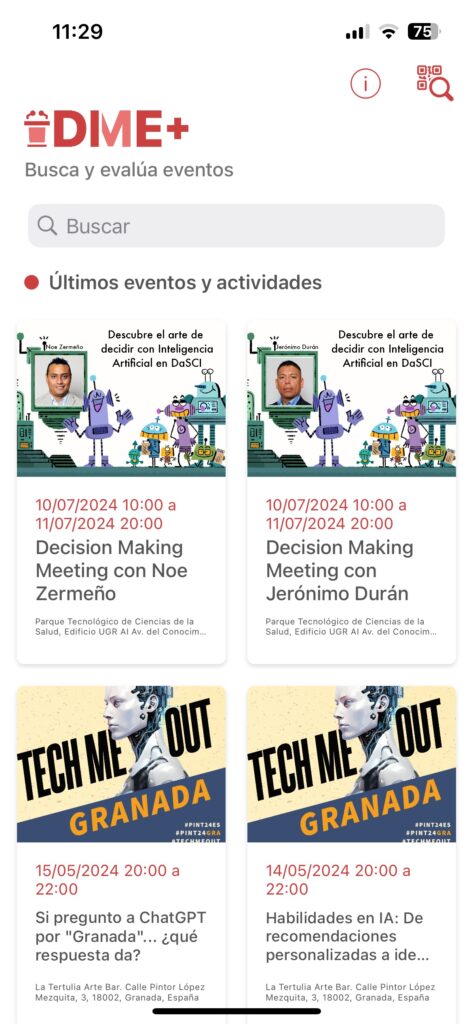
It is a highly flexible system in which organisers can choose various parameters. It also responds to a real need to evaluate the impact of outreach activities and helps us to perceive the opinion of citizens in a more direct way where citizens can express themselves freely. The evaluations are simple and almost transparent. It is also an adjustable, scalable and extensible system that allows for further studies with more complex linguistic variables such as dissemination models.
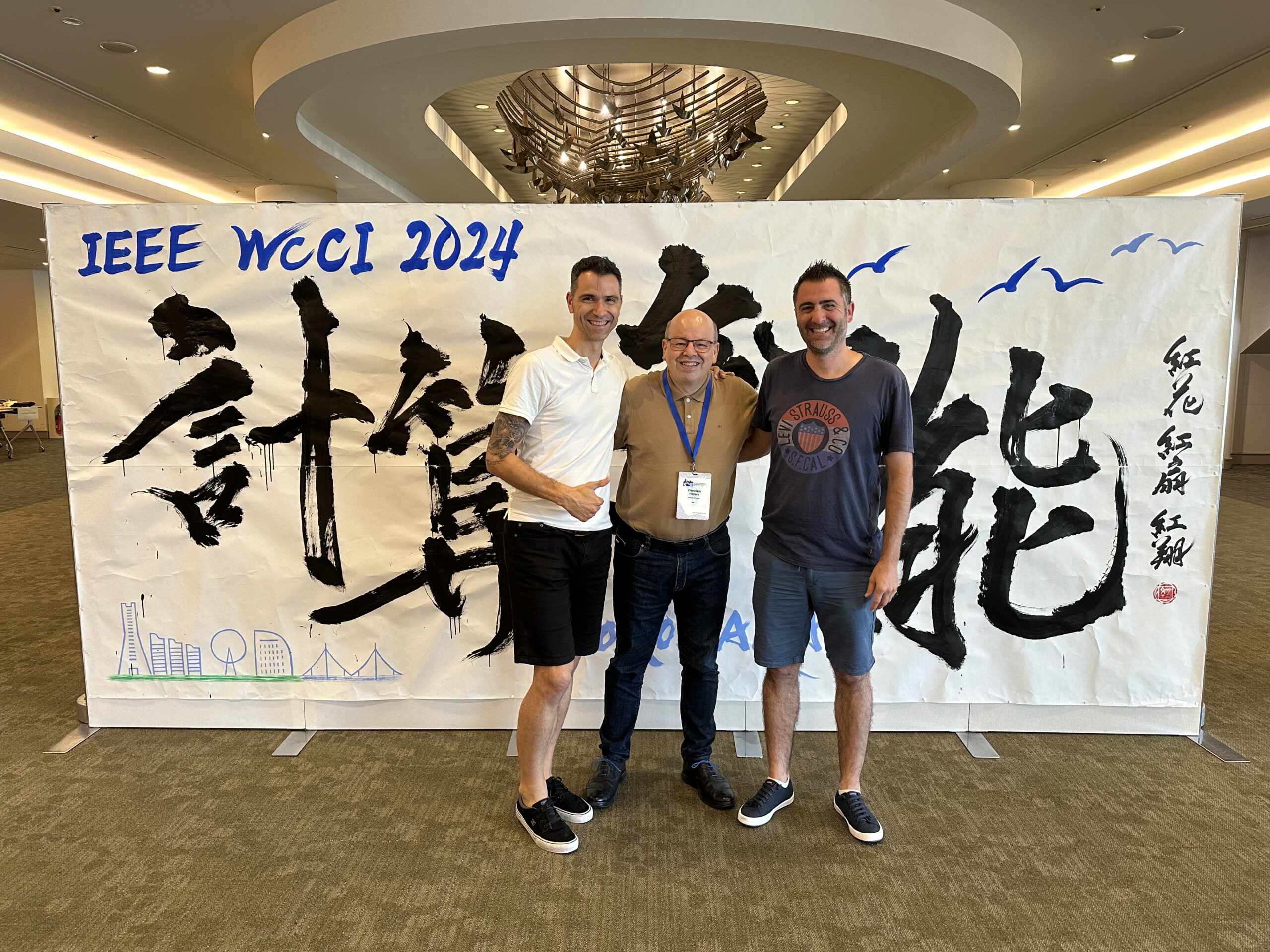
2 awards for DaSCI at the World Conference on Computational Intelligence 2024 in Japan
8 July, 2024
- The first prize went to a paper on one of the fundamental problems of AI, the robustness of an open system. The second prize goes to the direct application of AI to the early detection of ASD.
- The conference is one of the most important international conferences in the area of machine learning and neural networks, bringing together theory, analysis and applications in machine learning, with special emphasis on the field of neural networks and deep learning.
The Artificial Intelligence research carried out in Granada has been recognised once again. This time at the World Conference on Computational Intelligence 2024 held from 30 June to 5 July in Yokohama, Japan. The World Conference on Computational Intelligence 2024 includes the 3 most important conferences on computational intelligence technologies (neural networks and deep learning IJCNN, evolutionary computation CEC2024, and ensemble technologies and fuzzy systems Fuzz-IEEE2024).

The conference was the largest ever held with more than 3,250 papers received and 1,681 accepted, with authors from more than 80 countries and 20 tutorials and 5 parallel workshops. A total of more than 2000 AI researchers from all over the world have gathered for this conference. It is one of the most important international conferences in the area of machine learning and neural networks, bringing together theory, analysis and applications in machine learning, with special emphasis on the field of neural networks and deep learning.
Two award-winning works
The article that has received the first prize (2024 BEST PAPER AWARD IJCNN) entitled “Balancing Performance, efficiency and robustness in open-world machine learning via evolutionary multi-objective model compression” is a contribution that addresses a fundamental problem of Artificial Intelligence, its robust behaviour when an AI system interacts in an open world, where it interacts in dynamic scenarios that may change, and requires maintaining accuracy and robustness, that is, safe and reliable behaviour in the dynamic environment. A proposal has been developed based on the use of evolutionary algorithms (inspired by natural evolution) with multiple objectives to evaluate the accuracy, efficiency and robustness of machine learning models.
This work has been carried out in collaboration with TECNALIA, with whom important scientific work has been developed in recent years as a result of the collaboration agreement with the TECNALIA-UGR Chair in AI. The first author, Javier del Ser is technology director of OPTIMA (Optimization, Modeling and Analytics) at TECNALIA Research & Innovation, principal investigator and head of the Artificial Intelligence Platform. Javier del Ser has a long-standing collaboration with researchers at the DaSCI Research Institute. Francisco Herrera and Javier del Ser have jointly published more than a dozen scientific articles of significant impact in the field of AI.
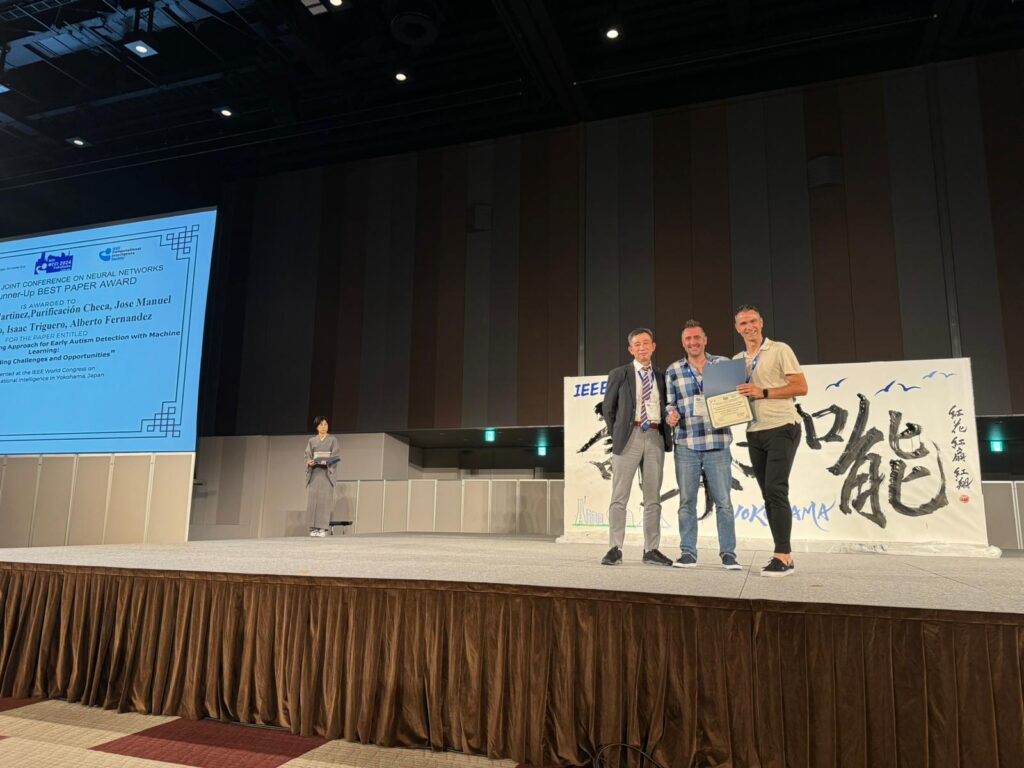
The article that has received the second prize (2024 Runner-up BEST PAPER AWARD IJCNN 2024) entitled “A wearable eye-tracking approach for early autism detection with machine learning: Unravelling Challenges and Opportunities” is a collaboration between researchers from the DaSCI Institute of the Dept. of Computer Science and AI and researchers from UGR departments such as Javier López Martínez (TSTC) and Purificación Checa (Developmental Psychology).
This work is associated with an applied research project of the 2023 own plan with FEDER funds on neurodevelopmental disorders. The first author of the article, Javier López-Martínez, carried out his TFM to initiate this line of work, where he developed a methodology to solve a case study in the diagnosis of ASD (Autism Spectrum Disorder).
ASD has a relatively high prevalence (1 in 36 children 2.8%), and it is very important to make an early diagnosis in order to implement good early care. The diagnosis of this condition has been made by means of psychological questionnaires (with a large subjective component) or by means of EEG or MRI tests, an expensive technique.
A very interesting alternative would be to use eye-tracking tests, a very low-cost and child-friendly test. Videos are played to capture the interest of the participants, and eye-tracking traces are obtained; the patterns are different between users with ASD and those who are neurotypical.
Additionally, the paper discusses two issues of interest in this field of study. Firstly by emphasising the benefits of wearables to obtain much more data to support early diagnosis (such as activity bracelets or sensors in the rooms where support tasks are performed), thus enabling a multi-modal approach that brings together different sources of information.
In addition, an analysis of how the qualities of reliable AI would be implemented in this area, transparency, ethics, privacy, etc., are addressed.
The success in obtaining the prize for the best articles in the area of machine learning, with the participation of researchers from different areas of knowledge and from two institutions that are a reference in AI at a national level such as the UGR and the TECNALIA Technology Centre (the main technology transfer centre in Spain), are a further recognition of the important scientific level of AI in Spain.
Francisco Herrera, director of DaSCI, participated as one of the invited plenary researchers with the Keynote Talk entitled “Fuzzy Systems for Safe and Reliable AI: Towards Responsible AI Systems”, which addresses the use of fuzzy systems for the design of AI systems that are reliable and safe.
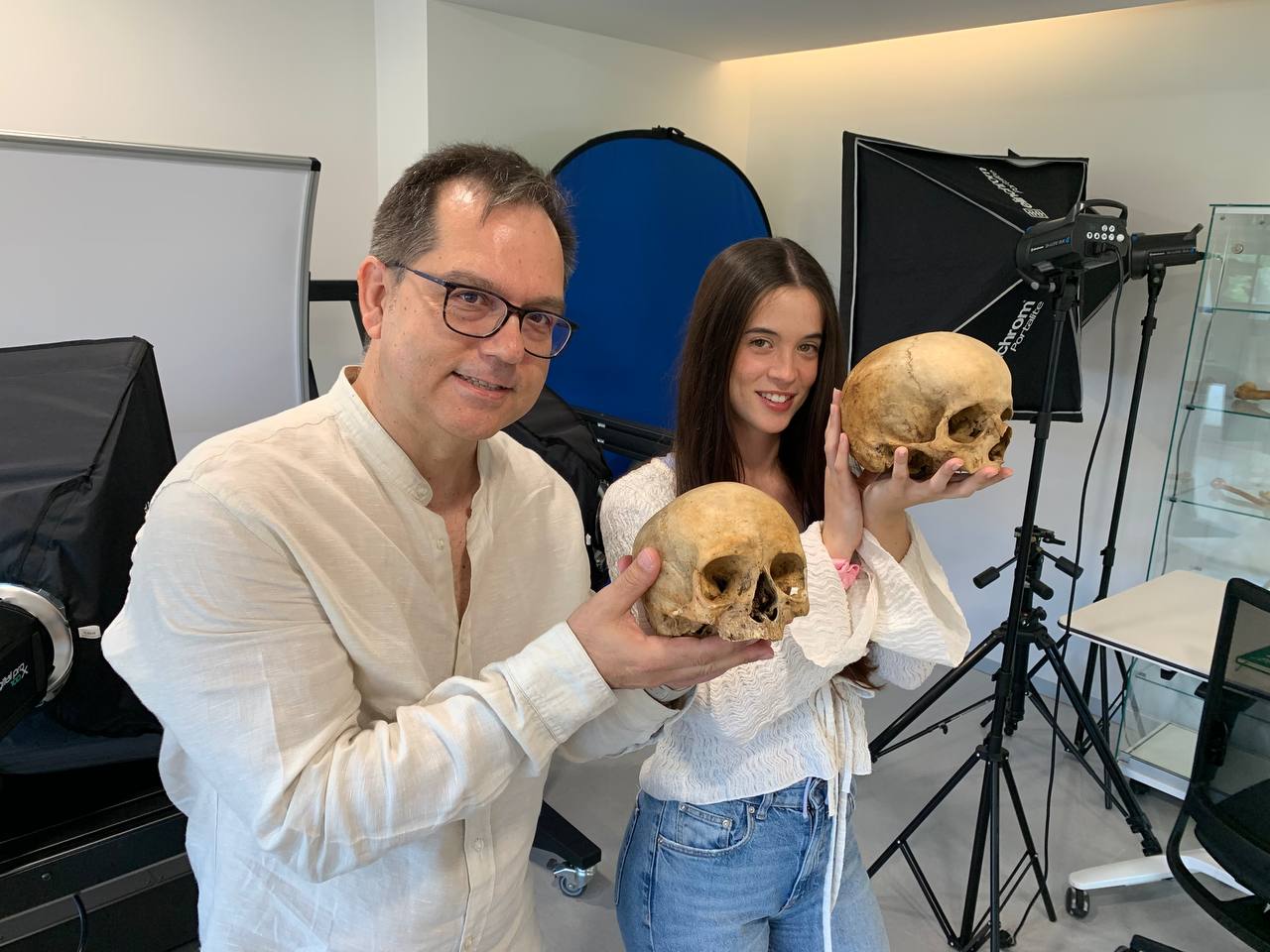
Researchers from the UGR propose an improvement in the identification of human remains thanks to craniofacial superimposition.
26 June, 2024
- It is a forensic identification technique based on the analysis of a skull (post mortem) with facial photographs of the person (ante mortem).
- This is an important step in making objective decisions based on being able to quantify the probability that a skull does or does not match the photographs studied.
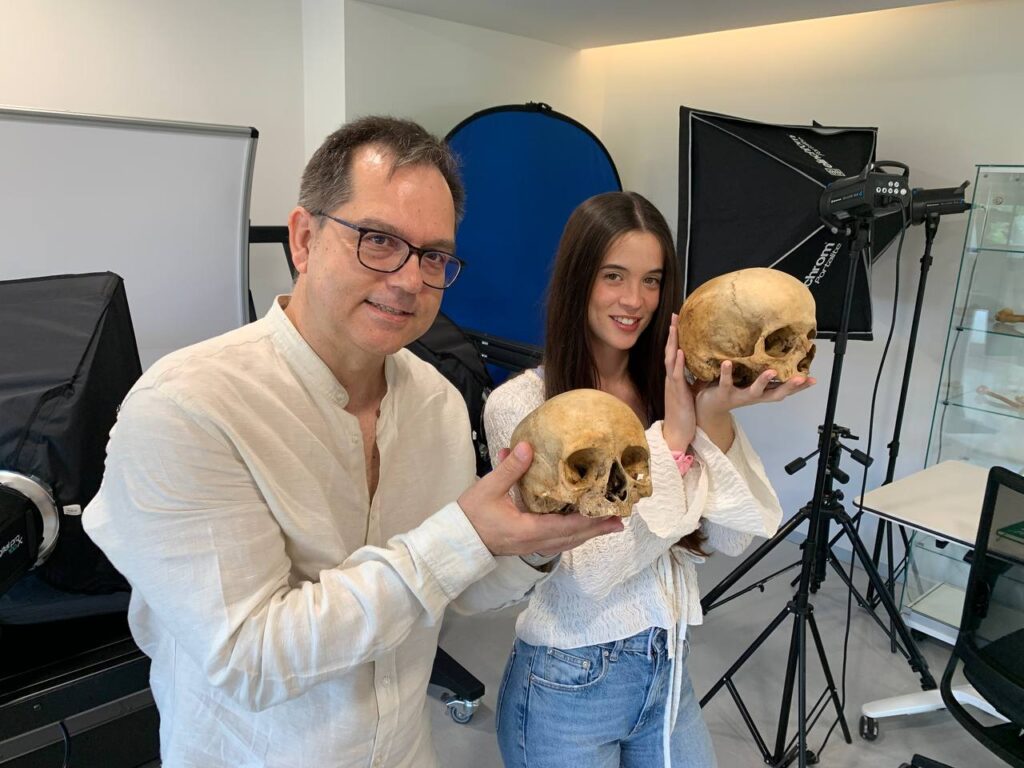
Researchers from the DaSCI Institute (University of Granada) and the CITIC centre (University of A Coruña), in collaboration with the company Panacea Coop, have published a study that demonstrates an improvement in the recognition of human remains by craniofacial superimposition, making decision making by forensic experts much more objective.
Craniofacial superimposition is a forensic technique that supports decision-making when it comes to identifying skeletal remains. Specifically, it is based on the analysis of the superimposition of a found, unidentified skull (post mortem) with facial photographs (ante mortem) of missing persons.
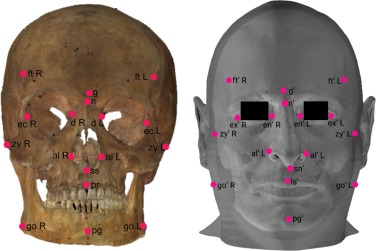
Despite its importance and wide applicability, the process remains complex and difficult to address. A variety of computerised methods have been proposed, but subjectivity and qualitative reporting persist in decision-making. This study presents a proposal for an evidence evaluation system based on Likelihood Ratios (LRs), previously used in other forensic fields such as DNA, voice or fingerprints, and recommended by the European Network of Forensic Science Institutes (ENFSI).
The paper proposes a pioneering application of this framework to craniofacial superimposition consisting of three experiments in which the system is trained and tested under different facial image conditions: the first uses frontal facial photographs, the second uses lateral facial photographs, and the last integrates both frontal and lateral facial photographs.
In all three experiments, the proposed LR system excels in terms of calibration and discriminative power, providing practitioners with a quantitative tool for test evaluation and integration.
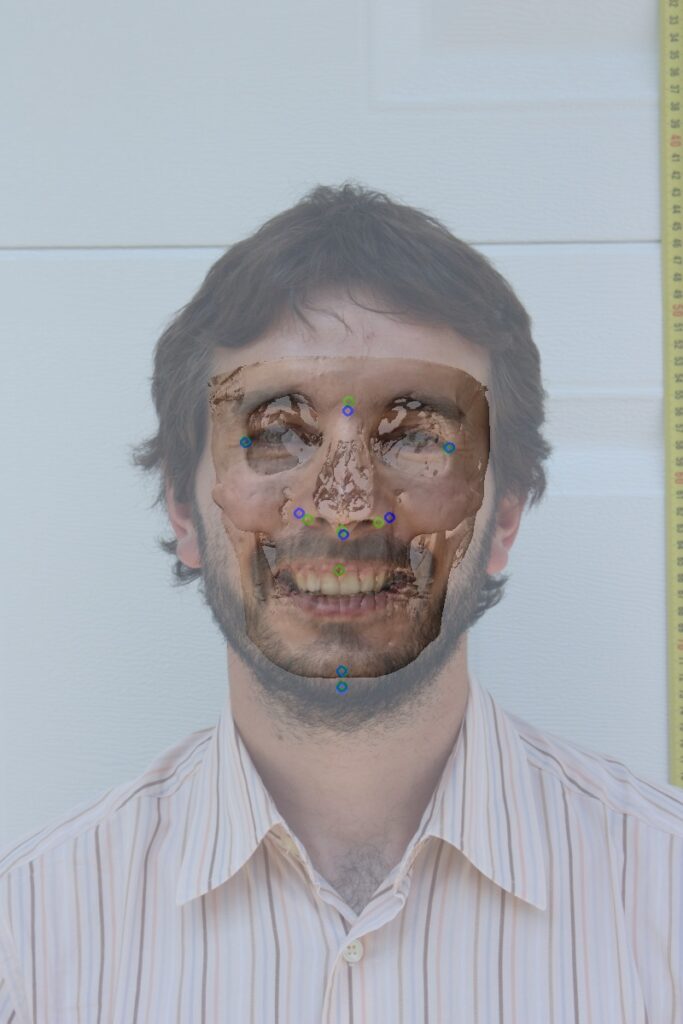
This is for now a proof of concept using synthetic data and will have to be tested with massive real data. Nevertheless, the resulting likelihood ratio system provides objective support for decision making in craniofacial superimposition.
Bibliographic reference:
Práxedes Martínez-Moreno, Andrea Valsecchi, Pablo Mesejo, Óscar Ibañez, Sergio
Damas. Evidence evaluation in craniofacial superimposition using likelihood ratios.
Information Fusion (2024). https://doi.org/10.1016/j.inffus.2024.102489
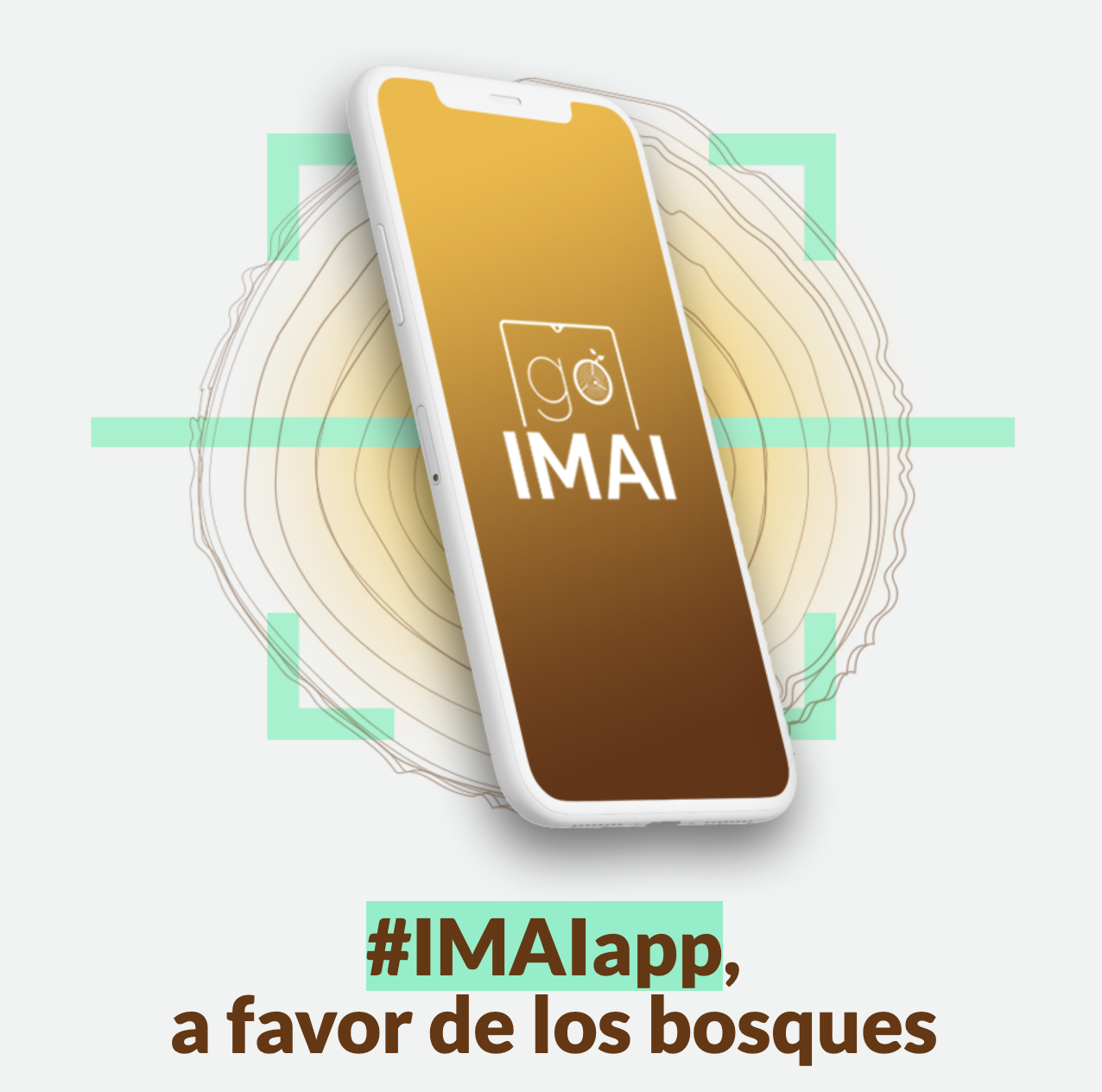
Award for the University of Granada’s app that allows the control of the timber trade with the mobile phone
21 June, 2024
- The Conference of the Spanish Association for Artificial Intelligence (CAEPIA) held these days in A Coruña, has awarded the first prize to the IMAIapp application, developed by researchers from the DaSCI Institute, the University of Granada, the Polytechnic University of Madrid and the Spanish Association of Trade and Industry of Wood (AEIM).
- The application for mobile devices developed by the IMAI Operational Group (GO IMAI) provides customs agents and law enforcement agencies with a tool that allows them to easily establish an early warning when faced with a suspicious shipment.
The Conference of the Spanish Association for Artificial Intelligence (CAEPIA), which in its 2024 edition will be held in A Coruña on 19-21 June, announces the 6th edition of the competition for the development of APPs based on AI techniques, with the aim of highlighting the practical importance of artificial intelligence, and due to the significant boom in the development of applications for mobile devices. Currently, the congress website announces the IMAIapp application as the winner of the first place in this competition (https://caepia24.aepia.org/awards.html).
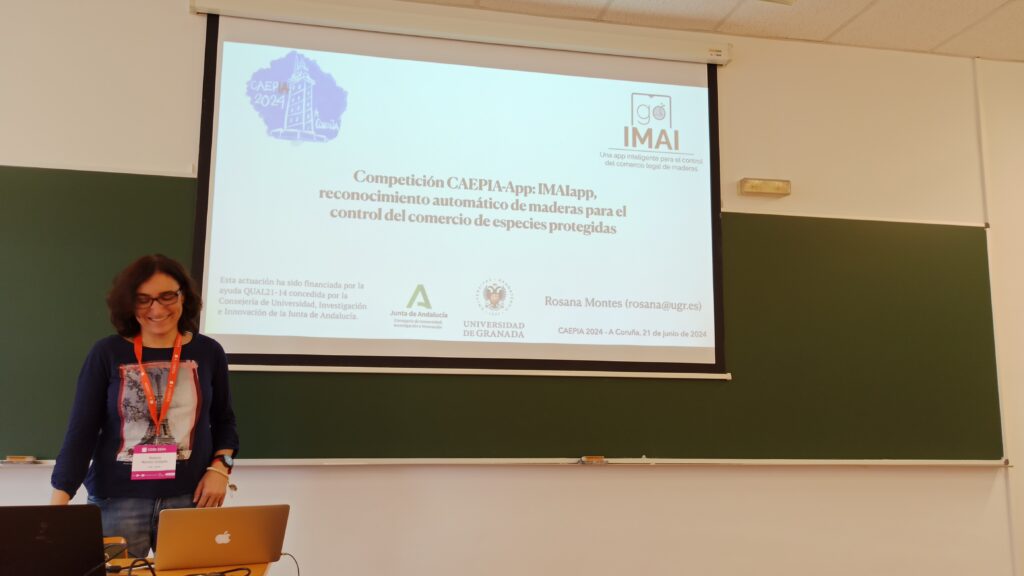
Currently, the identification of wood only at a macroscopic level is not possible and requires the intervention of highly specialised personnel for a guaranteed identification and expert use. In view of this, the combination of knowledge in macroscopic wood anatomy and artificial intelligence has allowed GO IMAI researchers to work on the design and implementation of a tool that facilitates this identification by the agents themselves in a simple and fast way.
Regulating trade in the timber sector at national and international level is essential to facilitate the control of the timber trade. The app developed for iOS and Android, IMAIapp, is aimed at specialised users such as customs agents, or state security forces, especially those with powers to control the trafficking of protected species (SEPRONA).
This tool, which is capable of running on a mid-range device, allows agents to establish an early warning when photographing a sample of a shipment and verifying that the identification of the timber species corresponds to the documentation provided. The identification is made in a matter of seconds after taking the photograph with IMAIapp and a magnifying lens, which obtains a macroscopic image with which the deep learning algorithm finds the specific characteristics for which it was trained.
The Polytechnic University of Madrid, the University of Granada and the Spanish Association of Wood Trade and Industry (AEIM) make up the research team that has developed this tool. The University of Granada has developed the intelligent model and integrated it into the mobile application, which has a native app for iOS and Android. The Polytechnic University of Madrid has provided the necessary information on the more than 400 commercial species, of which 37 are protected by the CITES agreement. The photographs that have provided the required dataset for the identification of protected species are available in an open dataset:
Montes, Rosana; Herrera-Poyatos, David; Herrera-Poyatos, Andrés; Herrera, Francisco; de Palacios, Paloma; De Marco, Antonio; García-Iruela, Alberto; Garcia-Fernández, Francisco; García Esteban, Luis (Jun 4, 2024). GOIMAI DataSet-Phase-I of high-resolution macroscopic images for the identification of wood species. Available for download at https://zenodo.org/doi/10.5281/zenodo.11092208.
GO IMAI members
The project is part of the National Rural Development Programme and is financed by the EAFRD (80%) and the General State Administration (20%). The Polytechnic University of Madrid (UPM), the University of Granada (UGR) and the Spanish Wood Trade and Industry Association (AEIM) are the beneficiaries. The Descubre Foundation, Everyware Technologies, Donosti Frame and José Luis Fermosel Álvarez are subcontractors of the initiative.
More information: https://goimai.es
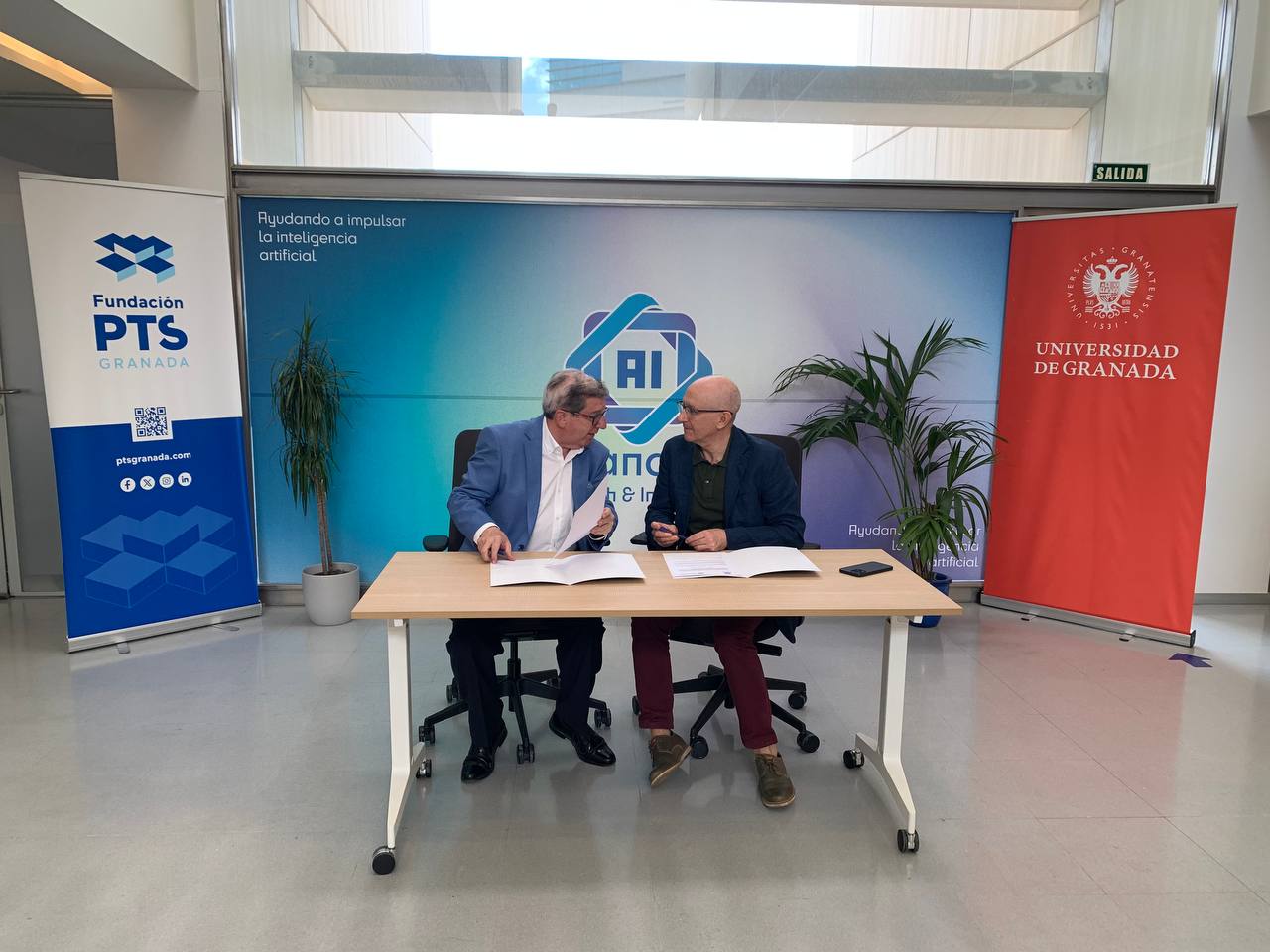
The PTS Foundation and the AI Granada Foundation sign an agreement to promote the development of artificial intelligence and its application to the bio-health sector
19 June, 2024
- The agreement establishes a stable framework of collaboration in which both entities undertake to develop initiatives in the areas of promotion, training and research.
The PTS Granada Foundation, a public entity supported by the Regional Ministry of Universities, Research and Innovation, and the AI Granada Research & Innovation Foundation, have today signed a collaboration agreement to carry out joint promotion, training and research activities aimed at fostering the development of artificial intelligence and its application in the bio-health sector in Andalusia.
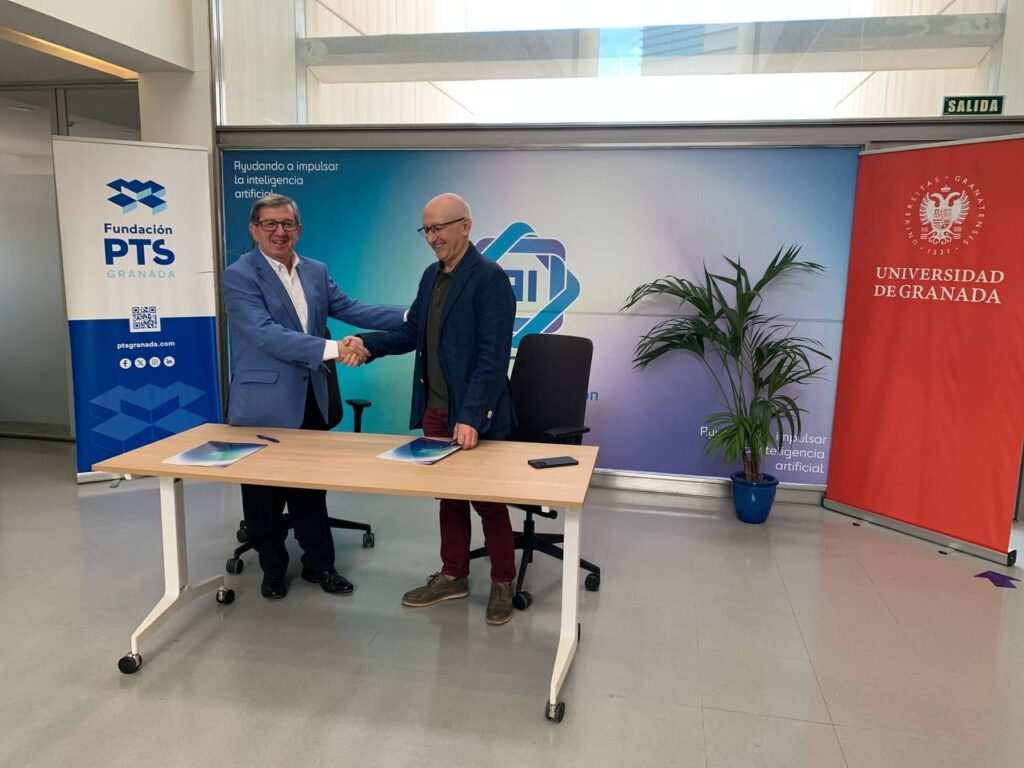
The signing took place in the UGR AI building, headquarters of the AI Granada Foundation, and was attended by the managing director of the PTS Granada Foundation, Luis González, and the vice-rector for Research and Transfer of the UGR and proxy of the AI Granada Foundation, Enrique Herrera Viedma.
The alliance will be valid for four years, and in order to select the activities in which the collaboration will be materialised, it will have a monitoring committee made up of a representative from each institution. Both will establish initiatives and actions for their dissemination, with the aim of guaranteeing the highest degree of knowledge by the public.
The collaboration between the PTS Foundation and the AI Granada Foundation represents a firm commitment and a sum of efforts of both institutions to promote the transfer of knowledge, the advancement of research and technological innovation. The agreement will give continuity to and expand common lines of action already in place, such as the “Matchmaking Experience“, which connects university students with skills in artificial intelligence with professional opportunities in local companies, thus strengthening Granada’s technological ecosystem.
This public-private collaboration is expected to contribute to consolidate and position the province as a national and international benchmark in research and innovation in artificial intelligence, contributing to economic development and improving the quality of life of the people of Granada. As well as creating a stable environment that fosters excellence, responsibility and equity, sustainability and social impact.
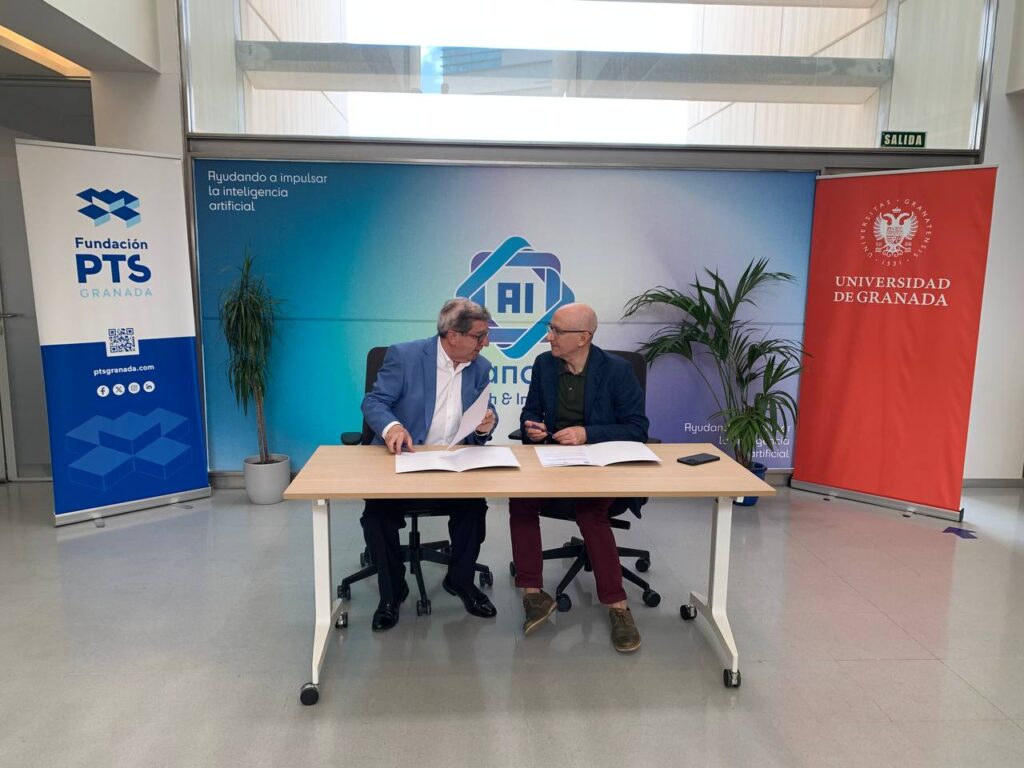
This new institutional agreement will not only benefit the entities involved, but will also have a positive impact on the scientific and technological community, companies and society in general at a key moment for the technological and biosanitary development of the region.
The PTS Granada Foundation is an entity of the Andalusian Public Sector and has a board of trustees that includes leading institutions in scientific and technological development, such as the Regional Ministry of University, Research and Innovation, the Ministry of Health and Consumer Affairs of the Andalusian Regional Government, the University of Granada, local councils in the region, as well as financial entities and collaborators from the business and scientific sectors. This conglomerate of institutions works together to promote entrepreneurship, the consolidation of quality employment, the training of highly qualified professionals and the improvement of the quality of life of citizens. The mission of the PTS Foundation is to be an axis of wealth generation, promoting the transfer of knowledge between the university, research centres and companies. Its long-term vision is to consolidate the Health Technology Park as a national and international benchmark in research, business innovation and technological development applied to Life Sciences and Health.
The main objective of the AI Granada Foundation is to boost and promote public and private activities related to research, innovation, technological development and knowledge transfer in the field of artificial intelligence and digital technologies, developing activities and integrating initiatives such as the AI Lab centre, aiMPULSA or AIR-Andalusia. The foundation is based on a public-private collaboration model in which the Junta de Andalucía through the Agencia Digital de Andalucía, the Granada City Council, the Granada Chamber of Commerce and different companies are integrated.
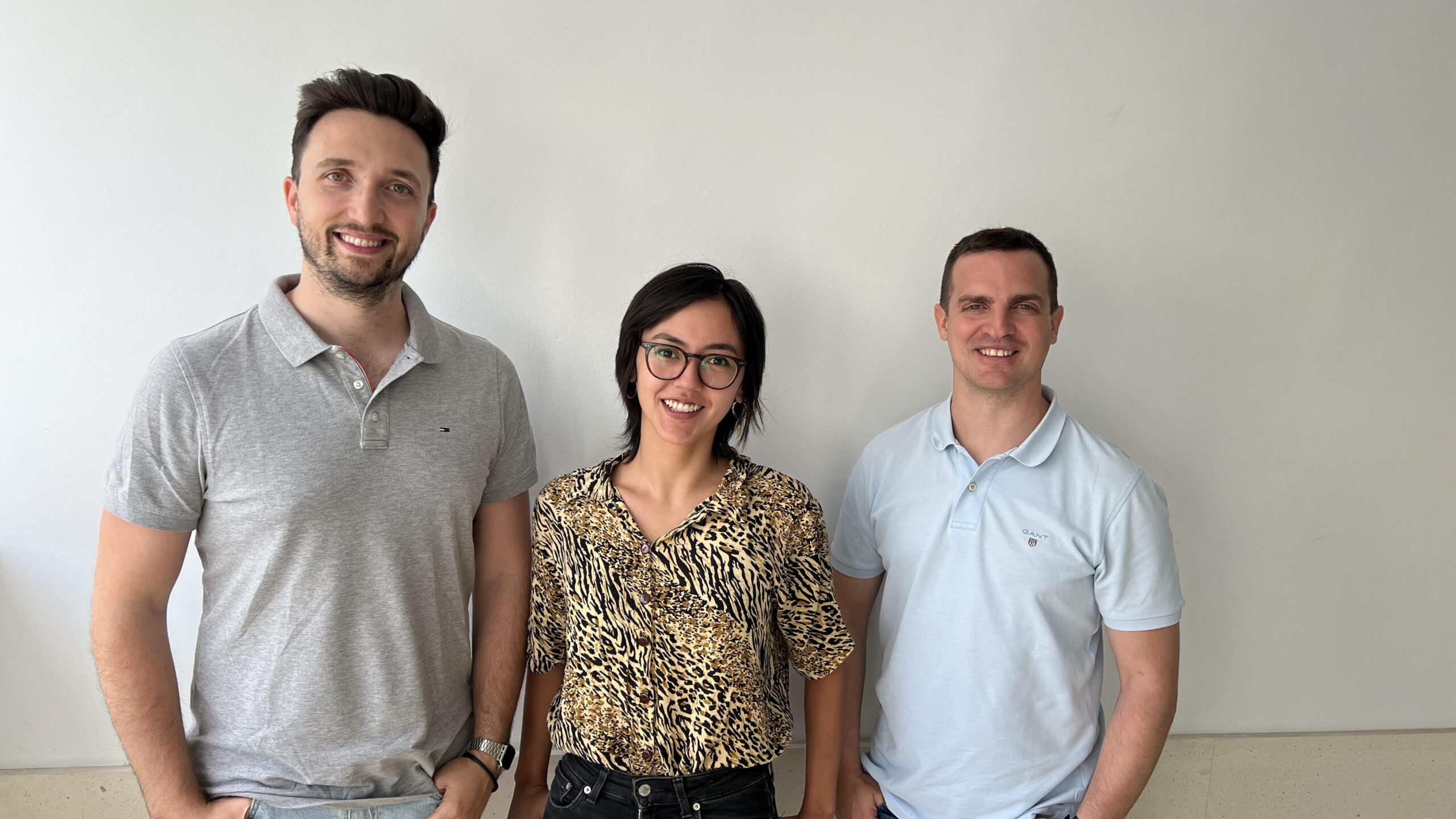
The gender gap is visible in research topics and impacts on scientific impact
6 June, 2024
A recent study carried out by DaSCI-UGR researchers and the University of Cadiz uses AI to analyse the majority of scientific publications by men and women in the field of library and information science. It is well known in the literature that there is a gender gap in scientific production and impact, where women tend to receive fewer citations than their male colleagues. The results of this study reveal a relationship between the topics addressed and the academic impact achieved, revealing gender disparities in academia.
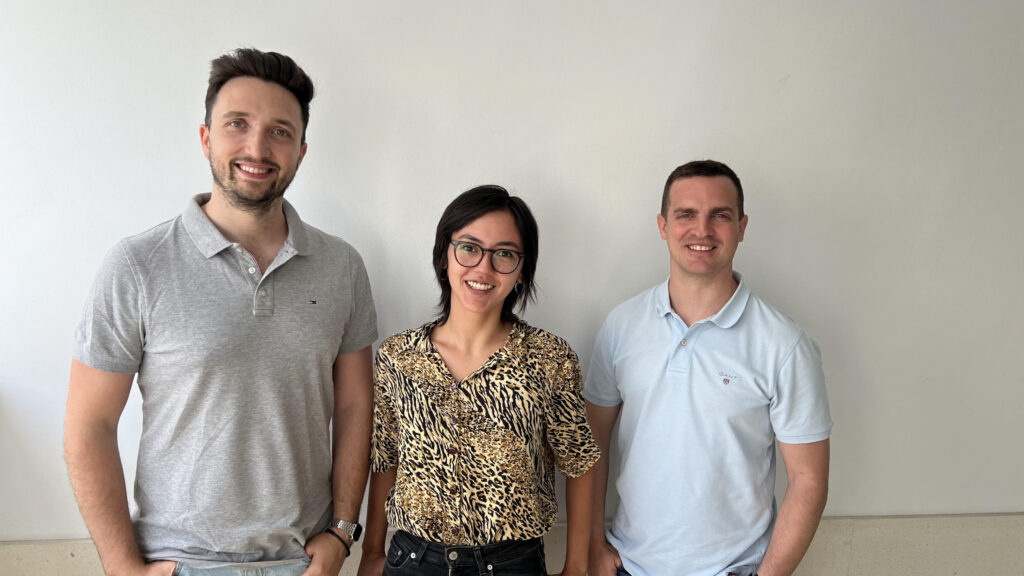
Previous research has pointed to different factors that help to explain this inequality. Possible factors include women’s late entry into the scientific field, productivity, lower levels of international collaboration, self-citation and the diversity of topics addressed. To find out whether research topics contribute to this gender gap, the researchers divided articles published in bibliometrics and documentation from 2007 to 2023 into two sets, those whose authors were mostly women and those whose authors were mostly men.
What they found was that, in the area analysed, men tend to favour more STEM (Science, Technology, Engineering and Mathematics) related topics, such as Machine Learning and computer science in general, which tend to have a greater scientific impact. Whereas women are more inclined towards more traditional library, social and health sciences subjects.
This in some ways mirrors the trends seen in the computer science and health sciences professions. According to the Women’s Institute, the presence of women among university graduates in Engineering and Architecture has risen from 9% in 1982 to 29.19% in 2021. In Health Sciences, the percentage of women has risen from 53.8% in 1982 to 71.87% in 2021.
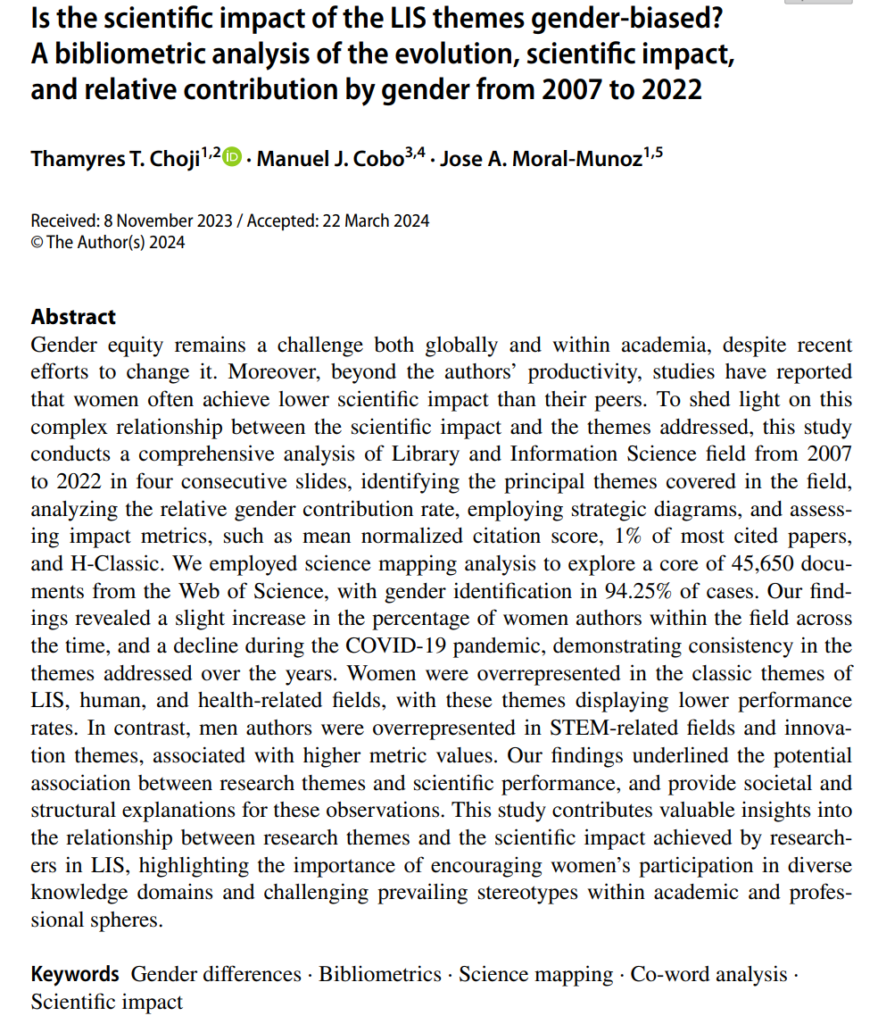
In addition, the article found that the number of female perpetrators, which has a slight increase over the years, declined visibly during the years 2019 to 2022, coinciding with the period of the COVID-19 pandemic. This finding is in line with other studies that identified that women were disproportionately affected during the pandemic due to, among other things, increased household and parental care work, which may have created cumulative disadvantages at the workplace.
The study analysed thousands of documents, in which the gender of most authors could be identified. Through an analysis of the scientific production and citations received in 4 periods from 2007 to 2023, an unequal gender representation in various topics was found. In each of the periods, about 20 topics were identified, with women overrepresented in traditional library and information science topics (such as Librarianship and Information-literacy), as well as topics related to the humanities and health. Meanwhile, the topics with the highest presence of men were those related to innovation and STEM, which received the highest number of citations compared to the previous topics.
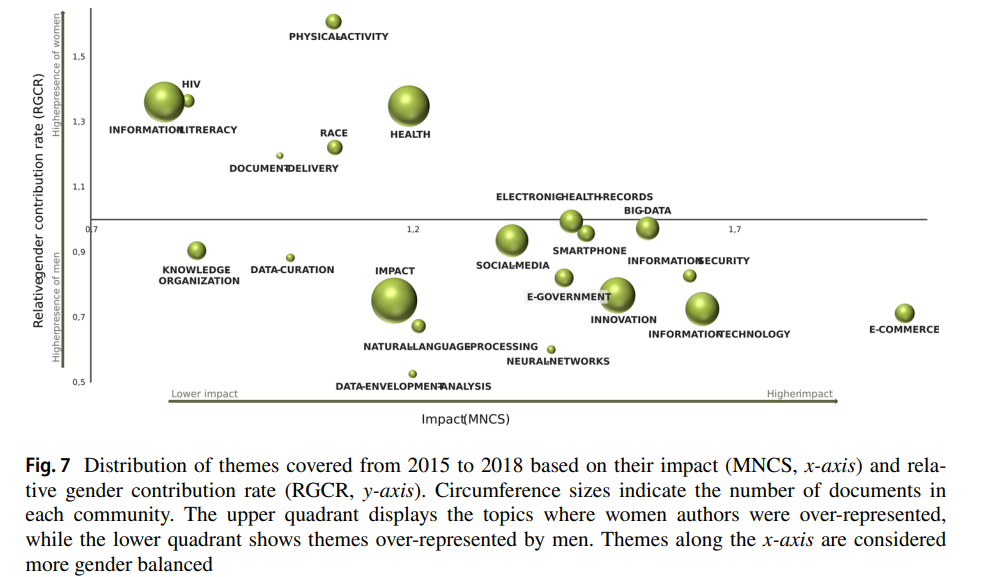
The Andalusian Inter-University Institute in Data Science and Computational Intelligence, known as DaSCI Institute, is a collaborative entity between the universities of Granada, Jaén and Córdoba. It is dedicated to advanced research and training in the field of Artificial Intelligence, with a particular focus on Data Science and Computational Intelligence. The institute brings together an outstanding group of researchers working on joint projects, promoting the development and application of innovative technologies in various sectors. With the aim of becoming a benchmark in its field, the DaSCI promotes the transfer of scientific knowledge to the socio-economic environment, thus contributing to technological progress and the digitisation of industry.
Contact:
- Manuel Jesús Cobo Martín mjcobo@decsai.ugr.es
More information:
- Choji, T.T., Cobo, M.J. & Moral-Munoz, J.A. Is the scientific impact of the LIS themes gender-biased? A bibliometric analysis of the evolution, scientific impact, and relative contribution by gender from 2007 to 2022. Scientometrics (2024). https://doi.org/10.1007/s11192-024-05005-3
- Link al artículo https://link.springer.com/article/10.1007/s11192-024-05005-3

Granada Salud expands its strategic collaboration network in the field of health sciences, technology and business
23 May, 2024
- IFMIF-DONES, AI Foundation, DaSCI, CIDAF, CITIC-UGR and Fundación Andalucía Emprende join this working group made up of more than thirty public and private entities.
- The new members will strengthen this initiative with the aim of joining forces and generating synergies that contribute to raising the profile of Granada’s scientific-technological ecosystem under the Granada Salud brand.
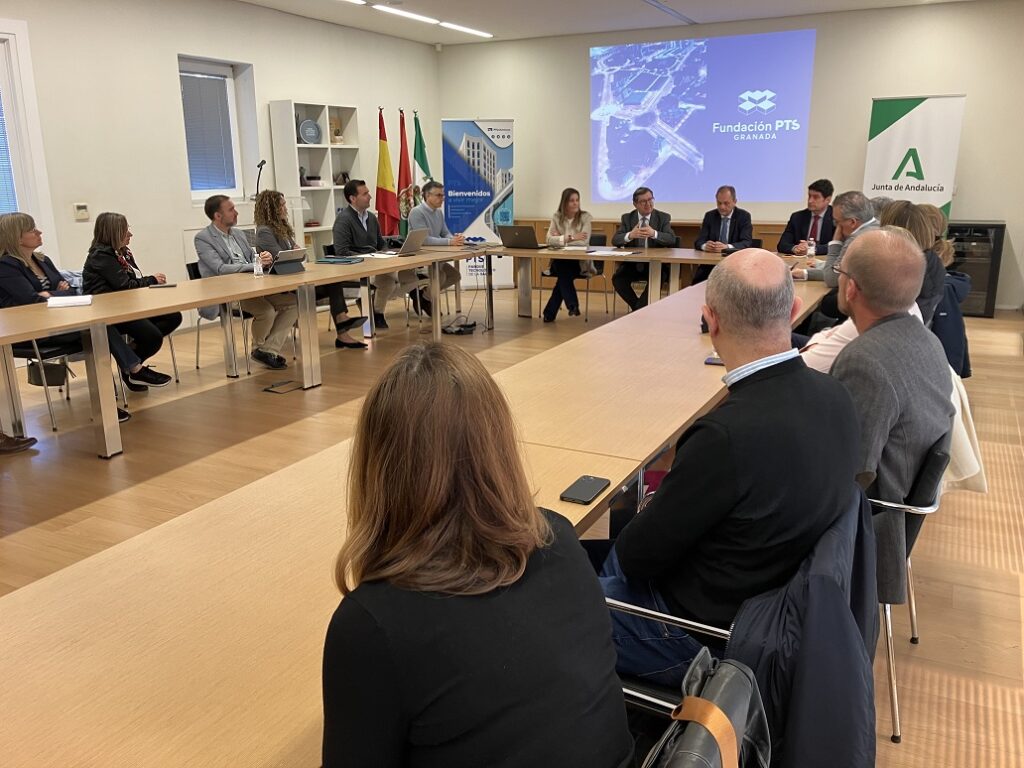
Granada, 23/05/24.
The Granada Salud initiative takes a significant step forward by expanding its network with the incorporation of new members, which will strengthen the development of this interdisciplinary working group at regional and local level. In addition to the thirty public and private entities that make up this network of resources, the involvement of new strategic entities for innovation and technological development in Granada in the field of health sciences, technology and business has been added.
Granada Salud forms part of the key objectives of the Regional Ministry of University, Research and Innovation to promote and coordinate scientific and technical research, knowledge transfer, support for innovation and business investment in technology, as well as the development of entrepreneurial culture and technological entrepreneurship in the region.
They are associated with this initiative as new partners of Granada Salud: the materials research infrastructure for future fusion power plants IFMIF-DONES; the AI Granada Foundation dedicated to connecting the university and research centres in artificial intelligence with the productive sector and society; the Andalusian Interuniversity Institute in Data Science and Computational Intelligence DaSCI, aimed at promoting the work of Andalusian researchers in Artificial Intelligence; the CIDAF Technology Centre, specialising in bioactive ingredients for agriculture, food, livestock and cosmetics; the Andalusian Research Centre in Artificial Intelligence and the Andalusian Institute for Data Science and Computational Intelligence DaSCI, aimed at promoting the work of Andalusian researchers in Artificial Intelligence; the CIDAF Technology Centre, specialising in bioactive ingredients for agriculture, food, livestock and cosmetics; the Centre for Research in Information and Communication Technologies of the University of Granada CITIC-UGR, an entity for the transfer of knowledge to the productive sector and the training of researchers who are drivers of socio-economic growth around ICT; and the Andalusia Emprende Foundation, whose mission is to promote entrepreneurship and business development to contribute to the revitalisation of the regional economy.
The expansion of Granada Salud is an example of strategic institutional collaboration to make visible and boost the potential of Granada’s health sector ecosystem. With the continued support of its members, its recent renewed commitment, and the involvement of new entities of interest, innovation is consolidated and strengthened as an important driver of socio-economic development for the province.
Granada Salud work agenda
On 30 April, the headquarters of the PTS Granada Foundation hosted a meeting of the Granada Salud working group, with the aim of resuming and coordinating its activity, sharing proposals, and establishing a roadmap for the coming months. A working agenda for the implementation of actions aimed at promoting the strategic projection of the Granada Salud brand.
Among the first lines of action developed, a system of joint work has been initiated with the aim of positioning Granada as a benchmark for innovation in health through the website and social networks of Granada Salud and those of its members. To this end, a Manual of Good Practices has been created and shared to establish a practical guide for the dissemination of news, organisation of events and milestones generated in this field. A series of recommendations that will serve to promote the projection and impact of Granada Salud’s communication through the coordination and cooperation of its members.
In addition, several scientific and technical commissions have been created, which have already taken their first steps towards the launch of the 3rd PTS Research Congress in the coming weeks. An event that hopes to repeat the success of previous editions, and which will serve to showcase the research potential of Granada’s health ecosystem.
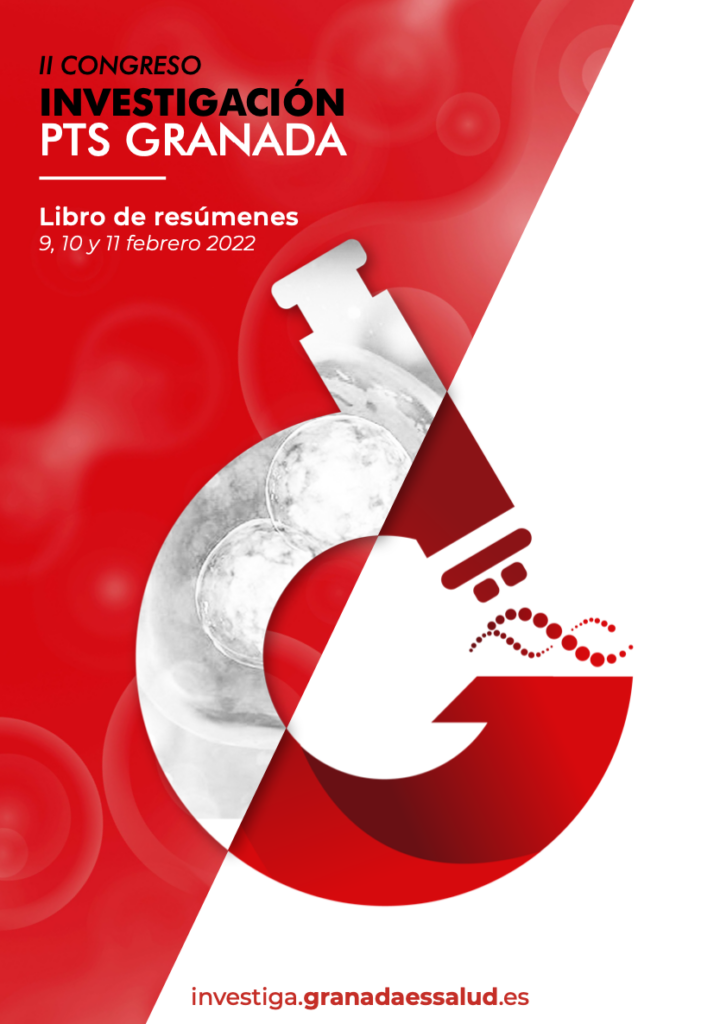
About Granada Salud
Granada Salud is made up of a network of resources for the development of the health sector available to any company, researcher, entrepreneur or citizen. Its members include UGR emprendedora, OTRI-UGR, Centro de Investigación Biomédica (CIBM), Instituto de Parasitología y Biomedicina López-Neyra (IPBLN), MEDINA Fundation, Centro Pfizer de Genética y Oncología (GENYO), IAVANTE Fundation, Biobank of the Andalusian Public Health System, Instituto Mixto Universitario de Deporte y Salud (IMUDS), Hospital Universitario Clínico San Cecilio, Hospital Virgen de las Nieves, Fundación de Investigación Biosanitaria Andalucía Oriental (FIBAO), Instituto de Investigación Biosanitaria (ibs. GRANADA), the Andalusian School of Public Health (EASP), the Experimental Station of Zaidín (EEZ-CSIC), the Granada Confederation of Entrepreneurs (CGE), the Association of Young Entrepreneurs (AJE), the Science Park, the Biological Air Quality Unit (UCBA-UGR), onTech Innovation, the Granada Technological Circle, the Granada Chamber of Commerce and Andalucía TRADE.
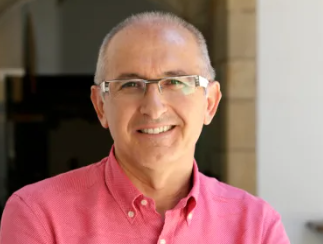
Enrique Herrera talks to Granada Digital about the design of an innovative science outreach centre to enrich the visit to the Alhambra
8 May, 2024
#News #InMedia
“The professor of Computer Science and Artificial Intelligence of the UGR highlights the great impact that the projects of this institution have on Granada and its province”.
All information in:

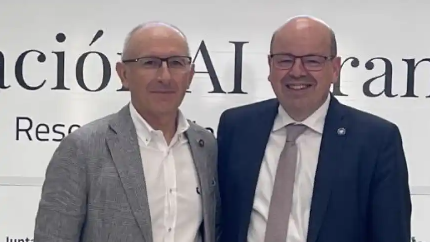
Francisco Herrera and Enrique Herrera, among the world’s most highly regarded scientists in Computer Science
8 May, 2024
#News #InMedia
“Among the 82 outstanding scientists, Francisco Herrera – ranked second in the world and first in Spain in Computer Science – and Enrique Herrera – ranked 116th in the world and second in Spain in this field – stand out in notable positions among the 1,000 most renowned scientists in the world in their disciplines“
All Information in:

(in Spanish)
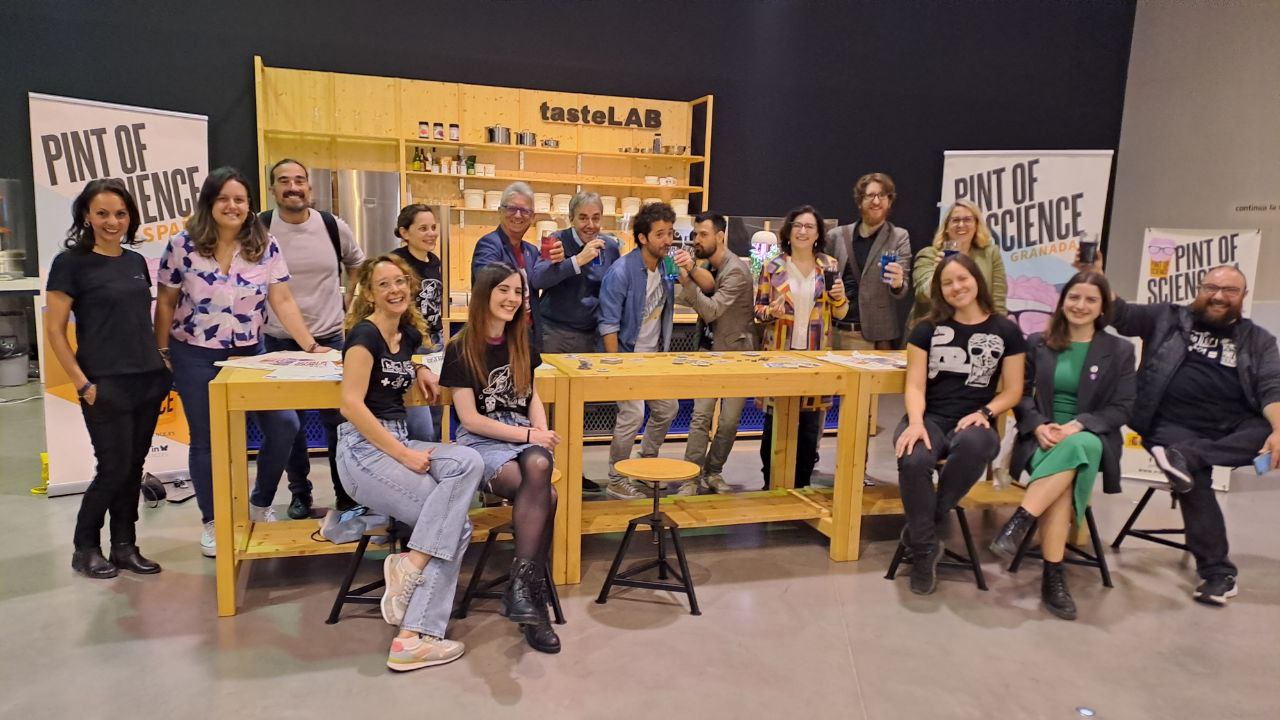
DaSCI joins the Pint of Science festival that organizes 18 science talks in the bars of Granada
6 May, 2024
- The international popular science festival will be held on May 13, 14 and 15 throughout Spain, with free admission.
- In Granada, Pint of Science will be held in the bars La Tertulia, Lemon Rock and Sala Premier.
- The complete program can be consulted at https://pintofscience.es/events/granada
Grenada, May 6, 2024
This morning the international science outreach festival Pint of Science, to be held on May 13, 14 and 15 in Granada, was presented at the Science Park. During these three days, researchers from the city will take science out of the laboratories and share their knowledge with the public in the bars. In this sixth edition, the talks have been organized around three themes with the participation of scientists from different centers of the University of Granada such as the Artificial Intelligence Institute (DasCI-UGR) or the Mind, Brain and Behavior Research Center (CIMCYC-UGR), and the Astrophysics Institute of Andalusia (IAA-CSIC). “From atoms to galaxies”, proposes a journey from subatomic particles to black holes; “Tech me out” dares to address technological innovations and the implications of the development of Artificial Intelligence; and “Our society” collects various research related to our daily lives, such as Nutrition, Democracy or Sex.
“In Granada, this year we celebrate the sixth edition going from two to three bars. To the venues of Lemon Rock and La Tertulia, which repeat participation, we add this year the Sala Premier. It is an event that always has a great reception in the city and the local organizing team has opted to continue expanding the range of talks,” explains Antonio Gomez, local coordinator of Pint of Science Granada. For his part, the national coordinator, Carlos Peris, points out that “worldwide, 560,000 people have attended the festival. In Spain, 93,500 attendees have enjoyed the science talks in one of the 325 bars that have organized events”. Peris thanked the 400 volunteers in Spain who organize the local festivals, with the aim of bringing science closer to society.
Rosana Montes, researcher at DasCI-UGR and speaker at Pint of Science 2024, stressed the importance of taking science out of the laboratories “because it is important that society understands what we do, and we must adapt the message not only to speak in a way that we are understood but also to speak where we are listened to”.
Pint of Science 2024 is a free event for all attendees and in Granada is possible thanks to the sponsorship of the Science Park of Granada, the patronage of the Institute of Astrophysics of Andalusia (IAA-CSIC), the Artificial Intelligence Institute (DaSCI-UGR), the Vice-Rectorate of University Extension, Heritage of the University of Granada and Institutional Relations, and the collaboration of the Association of Biotechnologists of Andalusia (AsBAn).
Pint of Science at national and global level
Spain leads the world participation in the Pint of Science festival, with 850 talks in the bars of 67 cities. As a novelty, this year the national organization has reinforced and supported the importance of basic science, which has made it possible to achieve milestones such as vaccines or space travel. In the same way, topics of current social interest such as science policies and energy transition, which directly affect the welfare, economy and growth of the country, have been highlighted.
Pint of Science was born in May 2013 in the United Kingdom when researchers Michael Mostkin and Praveen Paul organized an event in their laboratories in order to show the research they were doing to people affected by different mental illnesses. They themselves saw the great impact it had on those patients, and thought, “if people go to labs… why not bring science to where the people are, the pubs?” Little did they know that a few years later, their idea would travel around the world, being held simultaneously in 2024 in the 5 continents, with 25 participating countries.
The 13th, 14th and 15th of May will be a toast in the bars for science and its dissemination!
The program of Pint of Science in Granada is composed of the following talks:
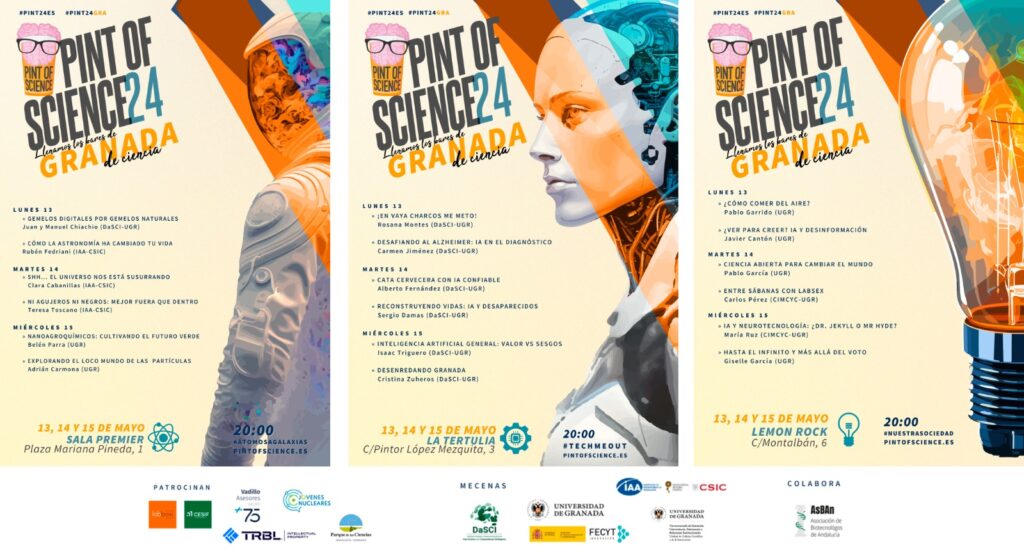
“Tech me Out”. La Tertulia
Lunes 13 de mayo:
» ¡EN VAYA CHARCOS ME METO! Rosana Montes (DaSCI-UGR)
» DESAFIANDO AL ALZHEIMER: IA EN EL DIAGNÓSTICO Carmen Jiménez (DaSCI-UGR)
Martes 14 de mayo:
» CATA CERVECERA CON IA CONFIABLE. Alberto Fernández (DaSCI-UGR)
» RECONSTRUYENDO VIDAS: IA Y DESAPARECIDOS Sergio Damas (DaSCI-UGR)
Miércoles 15 de mayo
» INTELIGENCIA ARTIFICIAL GENERAL: VALOR VS SESGOS. Isaac Triguero (DaSCI-UGR)
» DESENREDANDO GRANADA. Cristina Zuheros (DaSCI-UGR)
“De átomos a galaxias”. Sala Premier
Lunes 13 de mayo:
» GEMELOS DIGITALES POR GEMELOS NATURALES. Juan y Manuel Chiachio (DaSCI-UGR)
» CÓMO LA ASTRONOMÍA HA CAMBIADO TU VIDA. Rubén Fedriani (IAA-CSIC)
Martes 14 de mayo:
» SHH… EL UNIVERSO NOS ESTÁ SUSURRANDO. Clara Cabanillas (IAA-CSIC)
» NI AGUJEROS NI NEGROS: MEJOR FUERA QUE DENTRO. Teresa Toscano (IAA-CSIC)
Miércoles 15 de mayo:
» NANOAGROQUÍMICOS: CULTIVANDO EL FUTURO VERDE. Belén Parra (UGR)
» EXPLORANDO EL LOCO MUNDO DE LAS PARTÍCULAS. Adrián Carmona (UGR)
“Nuestra sociedad”. Lemon Rock
Lunes 13 de mayo:
» ¿CÓMO COMER DEL AIRE? Pablo Garrido (UGR)
» ¿VER PARA CREER? IA Y DESINFORMACIÓN. Javier Cantón (UGR)
Martes 14 de mayo:
» CIENCIA ABIERTA PARA CAMBIAR EL MUNDO. Pablo García (UGR)
» ENTRE SÁBANAS CON LABSEX. Carlos Pérez (CIMCYC-UGR)
Miércoles 15 de mayo:
» IA Y NEUROTECNOLOGÍA: ¿DR. JEKYLL O MR HYDE? María Ruz (CIMCYC-UGR)
» HASTA EL INFINITO Y MÁS ALLÁ DEL VOTO. Giselle García (UGR)
Pint of Science 2024 is a free event for all attendees, and could not be made possible if it were not for the collaboration of organizations that sponsor the festival, such as Labbox, CESIF, TRBL, JJNN and Vadillo Asesores at the national level or many other collaborating entities at the local level.
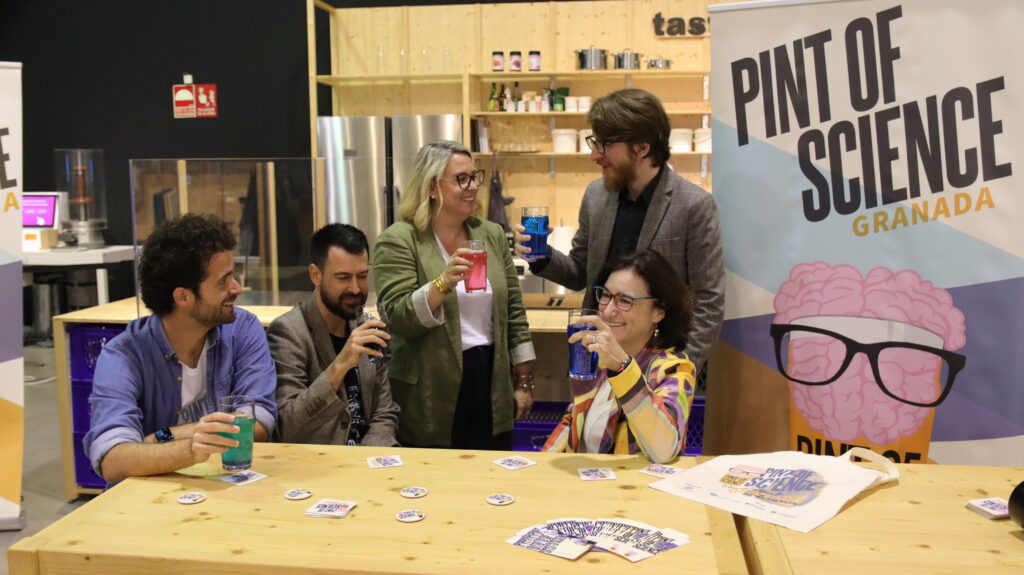
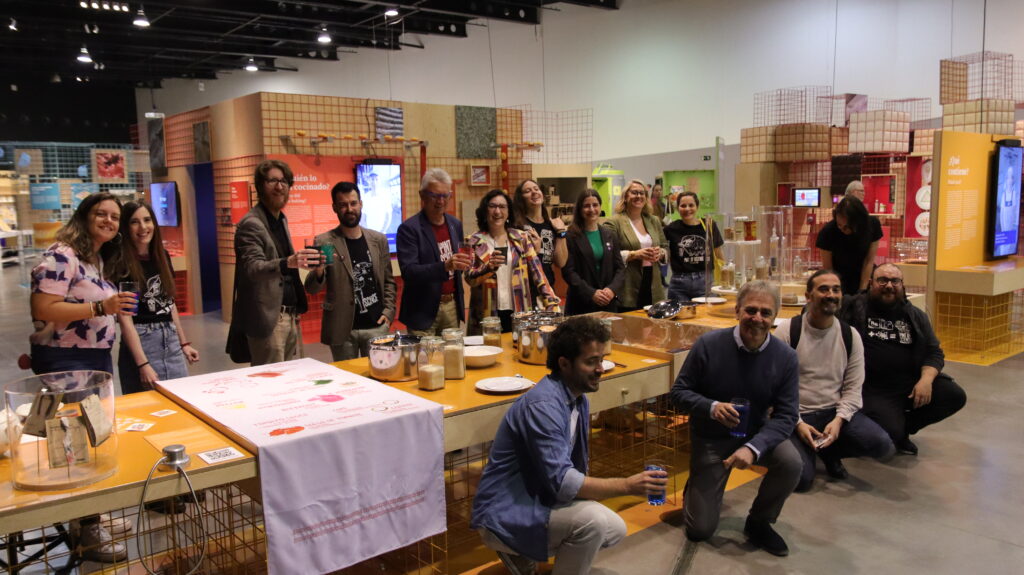
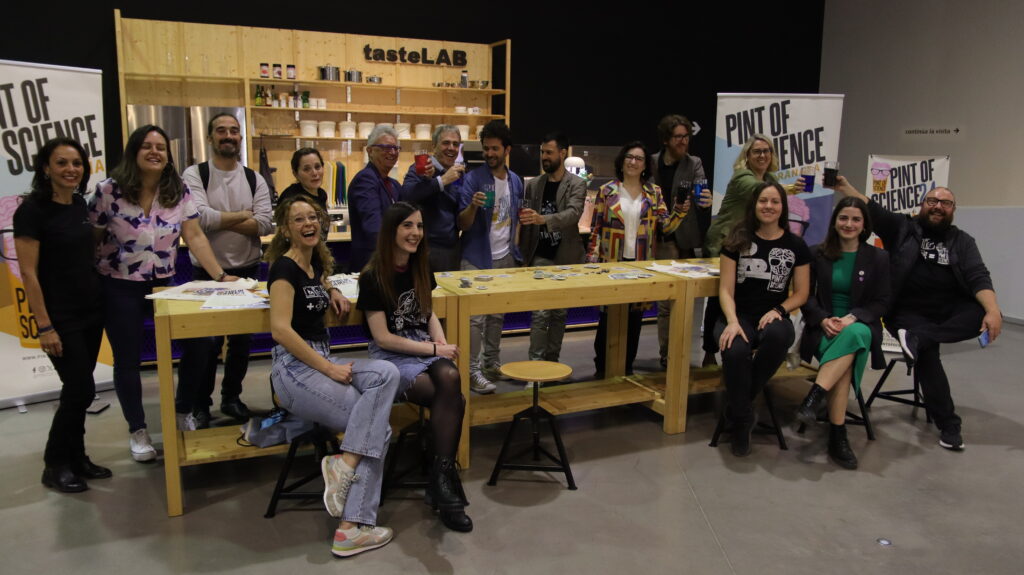
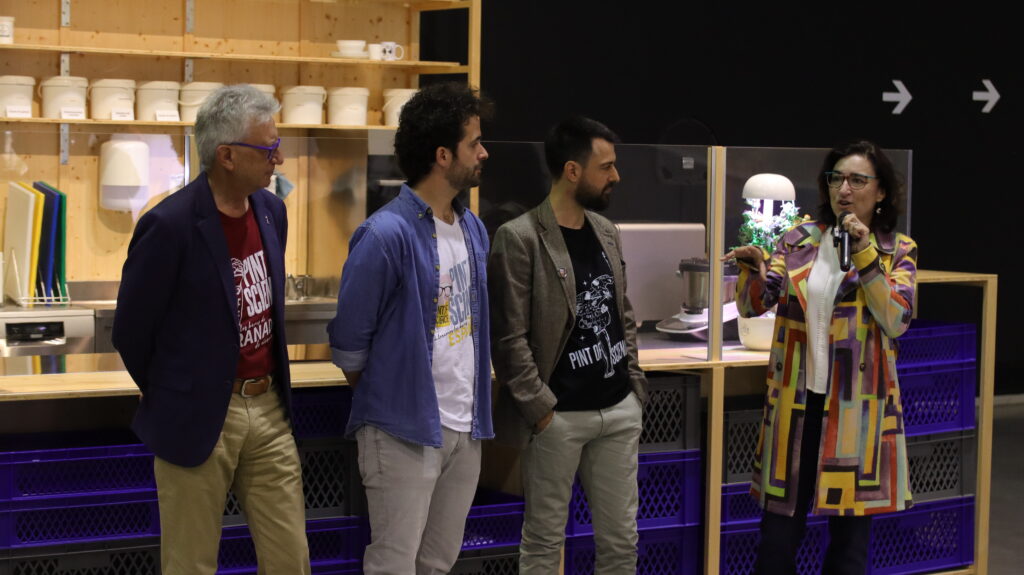
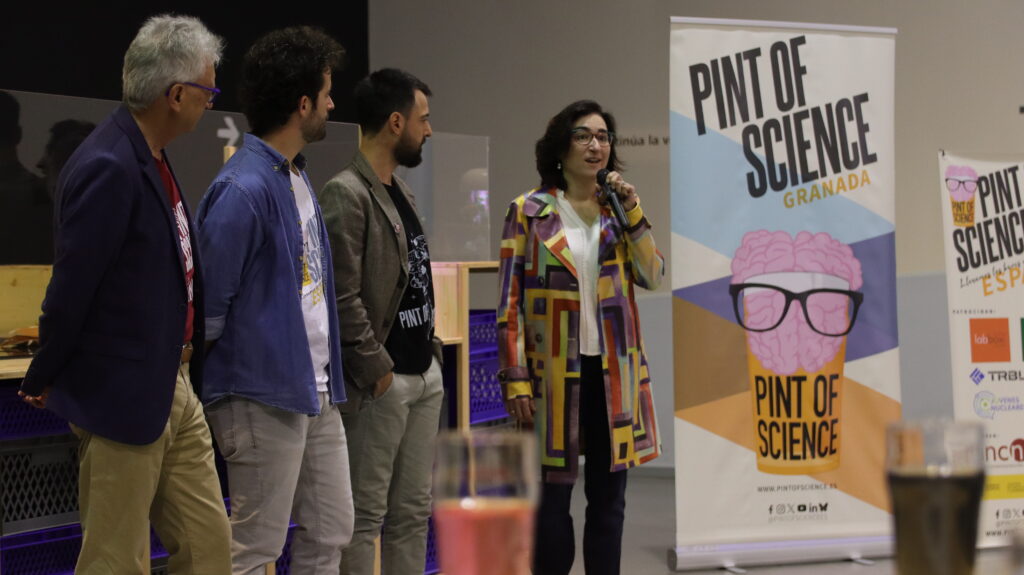
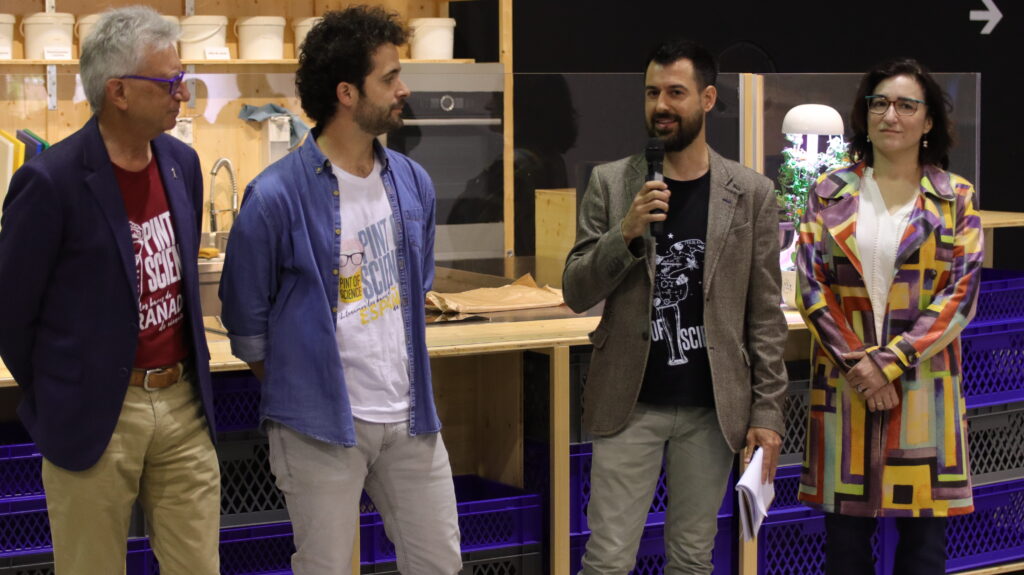
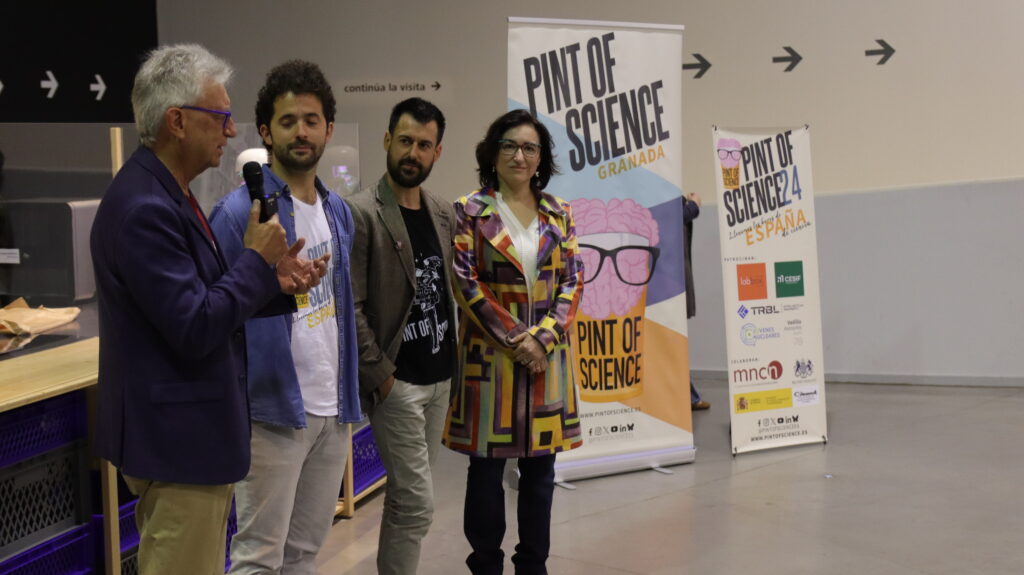
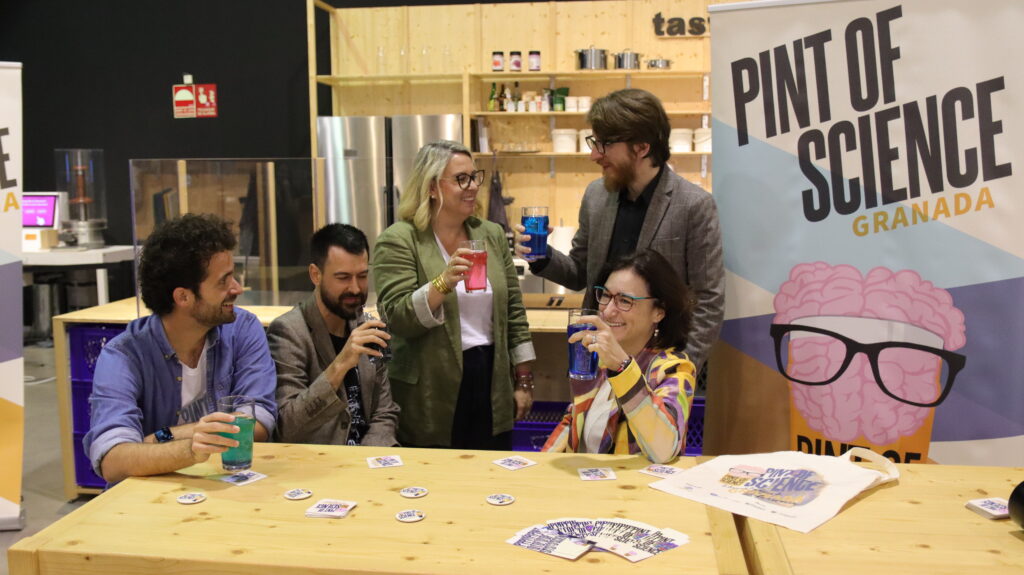
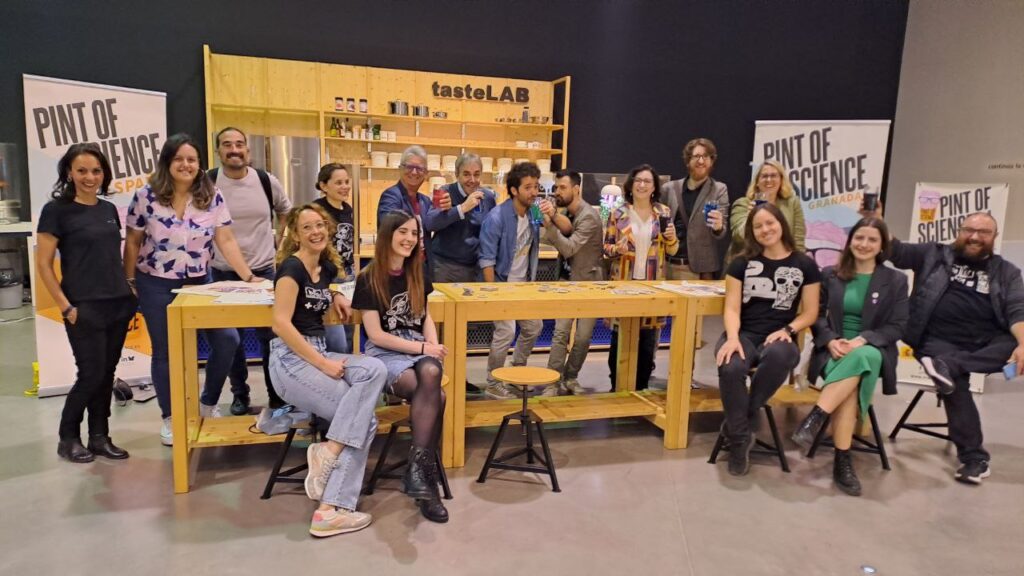
Responsables Locales de Comunicación y Prensa
Ana Tamayo: +34 651317645
Víctor Aníbal López: +34 655394975
LINK RECURSOS DE PRENSA: Prensa | Pint of Science ES
MÁS INFORMACIÓN: Inicio | Pint of Science ES
REDES SOCIALES:
Pint of Science ES (@pintofscienceES) / Twitter
Pint of Science ES (@pintofsciencees) | Instagram

Responsible use of Artificial Intelligence
19 April, 2024
The enormous potential of generative artificial intelligence (GAI) is now recognized across all sectors, as are the challenges and risks that must be addressed responsibly and ethically when implementing it. With this in mind, this study has been created as a guide that includes recommendations, in-depth analysis of the tools available on the market, and use cases and best practices in the public and private sector. The study is the result of the work of the Cotec working group, coordinated by Repsol and Tecnatom, in which more than 40 representatives of the Foundation’s member organizations participated, including researchers from our DaSCI institute.
This article explores the topic of artificial intelligence and large-scale language models (LLM), explaining what they are and how they differ from other forms of artificial intelligence. It also describes how IAG works, what advantages it offers over other GLM-based dialog systems, and what precautions should be taken when using it. It also includes a comparison of the most important vendors of these tools and gives advice on when it is appropriate to use commercial or open source software. Finally, it describes the organization profiles according to the proposed use case: adapter, user or developer.
The publication identifies six key aspects of IAG implementation: identifying use cases, assessing business readiness, building a partner and vendor ecosystem, managing risk, understanding financial models, and knowing how to scale and manage use cases.
Over six months of working group meetings, success stories were identified and included in the document in various fields: entertainment, education, healthcare, marketing, customer care, manufacturing and IT or law, among others.
Among the proposals made in the paper is the establishment of strong governance at various stages of the IAG development lifecycle. “In any development where we implement solutions of this type, we must consider the ethical and social implications of this technology and recognize that maintaining the privacy or security of the data we use is important,” the authors state.
They also stress the importance of “ensuring that the IAG systems implemented are used responsibly and do not contribute to discrimination, inequality or environmental degradation, as these systems result in intensive consumption of resources.”

The report was presented in February with the presence at the closing ceremony of the Director General of Digitalization and AI of the Ministry of Digital Transformation and Public Function, Salvador Estevan, who in his speech announced the intention to generate a sandbox framework that “helps to generate guidelines that allow SMEs and companies in general to address the implementation of AI with the greatest guarantees and in the most efficient way possible”.
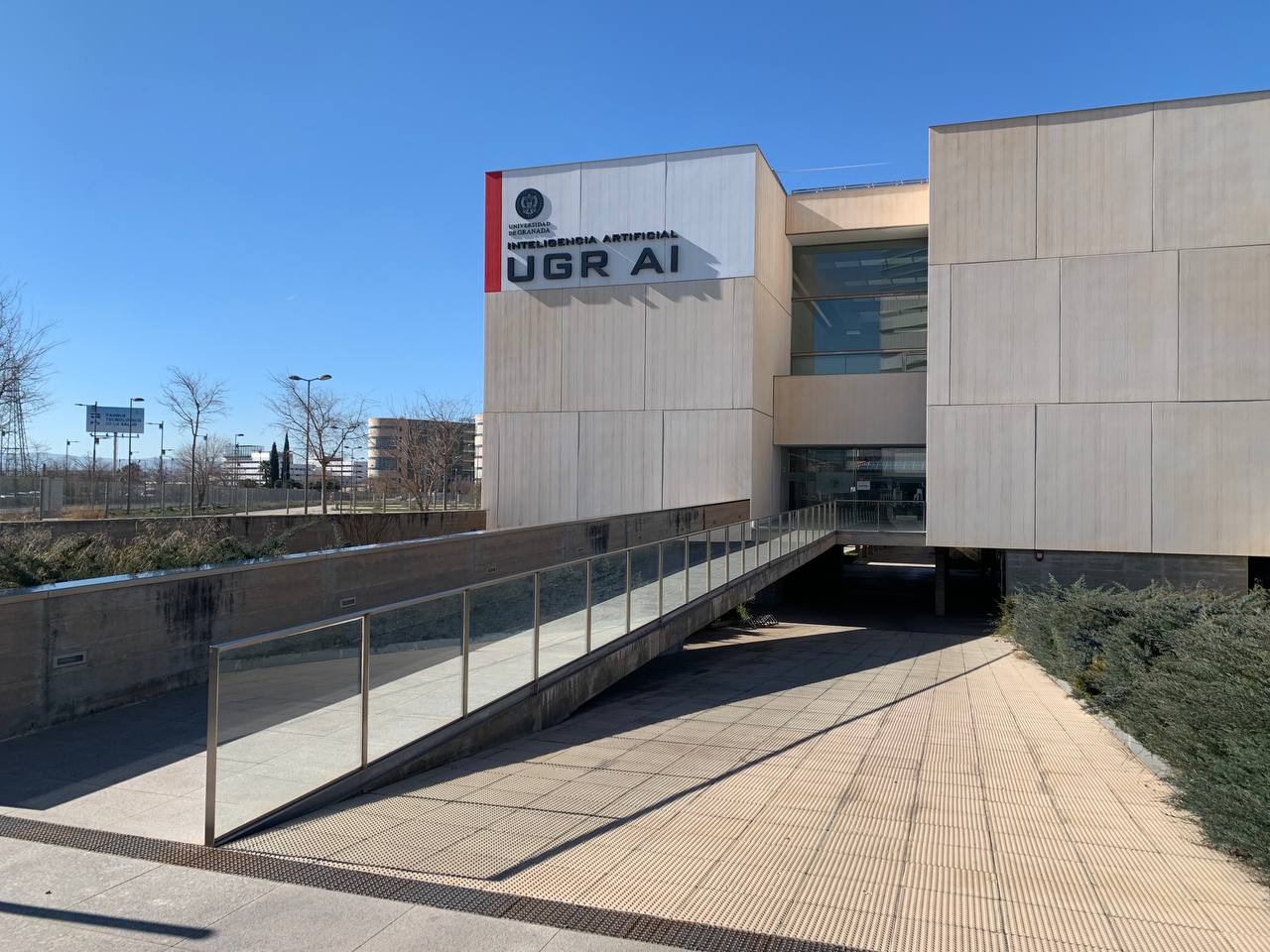
University-Business Chair in AI – UGR-Repsol
24 January, 2024
The UGR obtains, in collaboration with Repsol, one of the university-business chairs in Artificial Intelligence awarded by the Ministry of Economic Affairs and Digital Transformation.
It is financed with 1.6 million euros over four years and will allow the development of the project ‘Ethical, Responsible and General Purpose Artificial Intelligence: Applications in Risk Scenarios’
The University of Granada, in collaboration with Repsol, has obtained funding of 1.6 million euros to create a university-business chair that, in the next four years, will develop the project Ethical, Responsible and General Purpose Artificial Intelligence: Applications in Risk Scenarios. The UGR presented its project in November to a call from the Ministry of Economic Affairs and Digital Transformation that, within the framework of the National Artificial Intelligence Strategy (ENIA), will finance university chairs dedicated to research, dissemination, teaching and innovation on Artificial Intelligence ( AI) and cybersecurity. This January 23, the resolution was made public and the project was the best valued of all those presented, obtaining the maximum possible financing.
Ethical, Responsible and General Purpose Artificial Intelligence: Applications in Risk Scenarios is a project co-financed by Repsol, which will contribute 400,000 euros to the chair, in addition to the 1.2 million financed by the Ministry. This chair represents a new milestone in the collaboration between the UGR and Repsol, which for five years has maintained a close and uninterrupted collaboration through various research projects and technology transfer based on Artificial Intelligence.
In this case, it is an ambitious project where progress is made in one of the great challenges of Artificial Intelligence (AI), such as the development of intelligent technologies with an ethical dimension and responsible use that fall within the so-called trustworthy AI (Trustworthy Artificial Intelligence). , in English). The project includes an extensive scientific dissemination program to publicize this reliable AI, as well as a training space that will address the creation of specialized courses on this topic.
This university-business chair also has an international projection with the inclusion of two researchers from the University of Modena, Rita Cucchiara and Lorenzo Baraldi, with extensive experience in the field of explainability of AI algorithms. These join an interdisciplinary team of researchers from Repsol and the University of Granada (Francisco Herrera, Enrique Herrera, Sergio Damas, Natalia Díaz, Coral del Val, Daniel Molina, Francisco Lara, Isaac Triguero, Victoria Luzón, Rosana Montes, Siham Tabik and Rocío Romero). All participants have extensive experience in this area of research.
The development of trustworthy AI systems entails a series of ethical and regulatory requirements that must be taken into account. These issues require diving into philosophy (in terms of ethics), law (in terms of regulation and user rights) with compliance with the European regulatory standards for artificial intelligence that will be approved in 2024 and compliance for two years. later (the so-called Artificial Intelligence Act) and sociology (exploring the social implications of new technological developments). The chair will address a pressing challenge in our society for the development of artificial intelligence that complies with ethical principles as well as the associated regulation.
The development of reliable AI systems is a multidimensional challenge that must be addressed from multiple perspectives. From a technical point of view, systems must be robust, fair, guarantee data privacy and be transparent and explainable. Many of these properties transcend their mere technical aspect, since they must be validated in a specific scope of application. For example, the concepts of explainability and fairness may be different in a scientific context than in a social context, or robustness depends on the specific use case, etc.
At the level of the scenario applied in the area of development of Repsol, a line of research is proposed to develop artificial intelligence models for use in critical infrastructures, such as an oil refinery, that are robust and that guarantee safety in taking decisions. decisions of intelligent systems. Application domain experts will define validation procedures and evaluate the quality of these procedures. Repsol will facilitate this real scenario for the application of the systems and processes that will be developed in the project. This is one of the so-called high-risk scenarios for the use of artificial intelligence in European regulation and therefore requires the development of reliable artificial intelligence models.
On the other hand, AI research is advancing at an accelerated pace and new lines appear that take on special relevance. One of them is known as General Purpose AI (GAIA), which deals with the development of AI technologies that can adapt to different problems and contexts in an almost automatic way. This project addresses these advanced models that can be applied to different prediction problems present in a refinery through the transfer of knowledge from one problem to another.
During the four years of execution of the chair, both engineers will be hired who will be able to carry out their doctoral thesis in the different lines proposed by the project, as well as postdoctoral researchers who can add their experience in the area.
This call from the Ministry of Economic Affairs and Digital Transformation will mobilize around 59 million euros through public-private contributions that will allow scholarships for around 150 researchers in the next four years. The program is part of the National Artificial Intelligence Strategy (ENIA), the Digital Spain 2026 agenda, as well as the Recovery, Transformation and Resilience Plan.
Photos: Francisco Herrera, director of the Chair and in another image, Chair members Sergio Damas, Enrique Herrera and Rocío Romero.
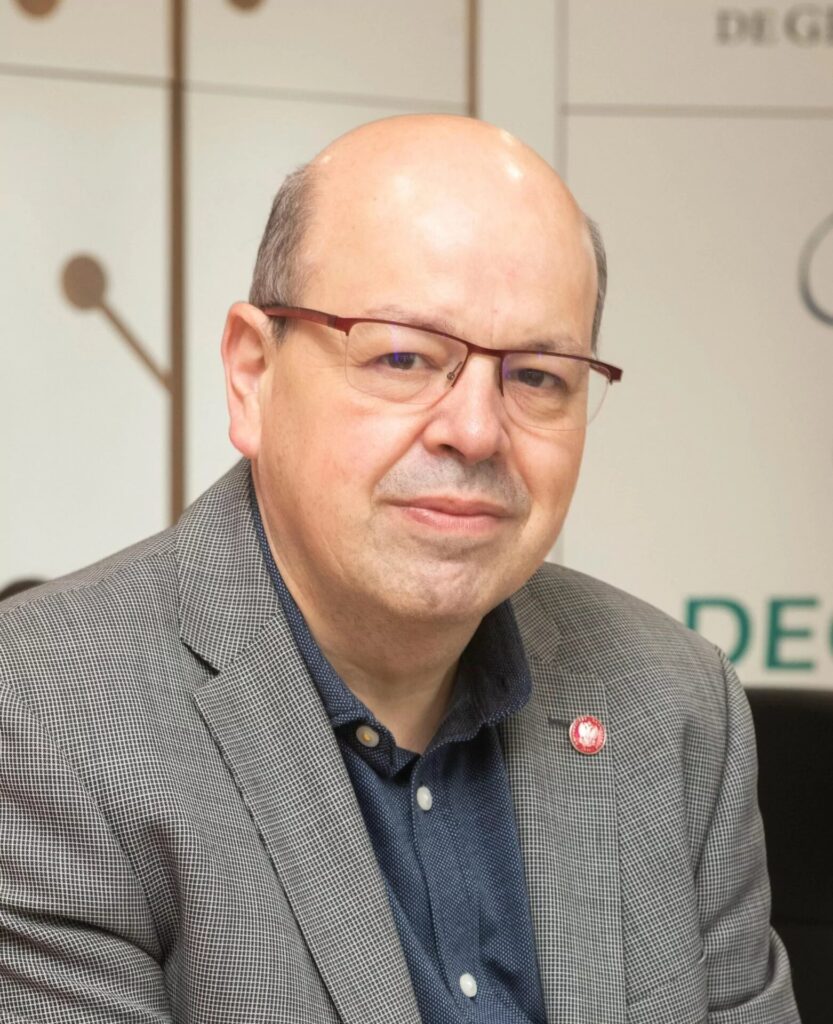
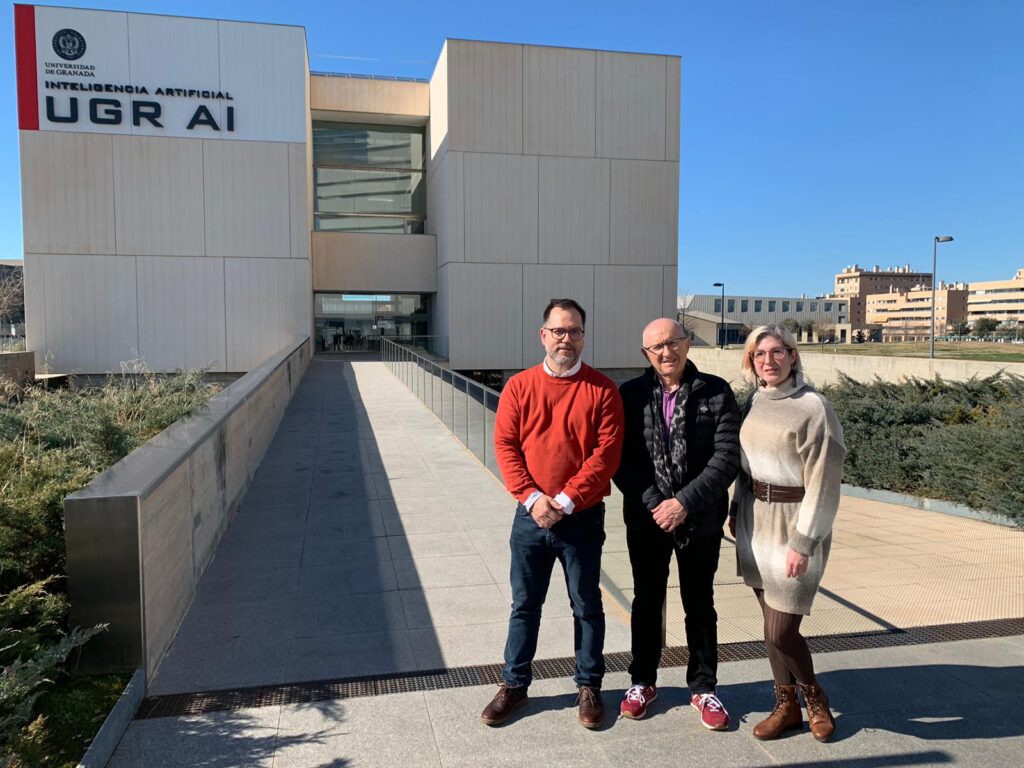
Conferences and activities on the other side of the Atlantic Ocean
27 November, 2023
#Outreach #November
November has allowed DaSCI researchers to visit university centers in Cuba and Brazil, with the aim of joining ties between Spain and Latin America, to publicize the institute’s research areas and to promote future lines of collaboration.
Plenary talk by Francisco Herrera “Secure and reliable artificial intelligence: Risk and auditability scenarios” at the II International Symposium on “Generation and Transfer of Knowledge for Digital Transformation” (SITIC2023, November 15 – 17, 2023) in the framework of the IV International Scientific Convention UCLV 2023. Central University “Marta Abreu” of Las Villas, Cuba.
In addition, this event was the setting for the awarding of the title of Visiting Professor to Dr. Francisco Herrara Triguero in recognition of his scientific career and collaboration with Cuba and especially with the Faculty of Mathematics, Physics and Computer Science of the UCLV.
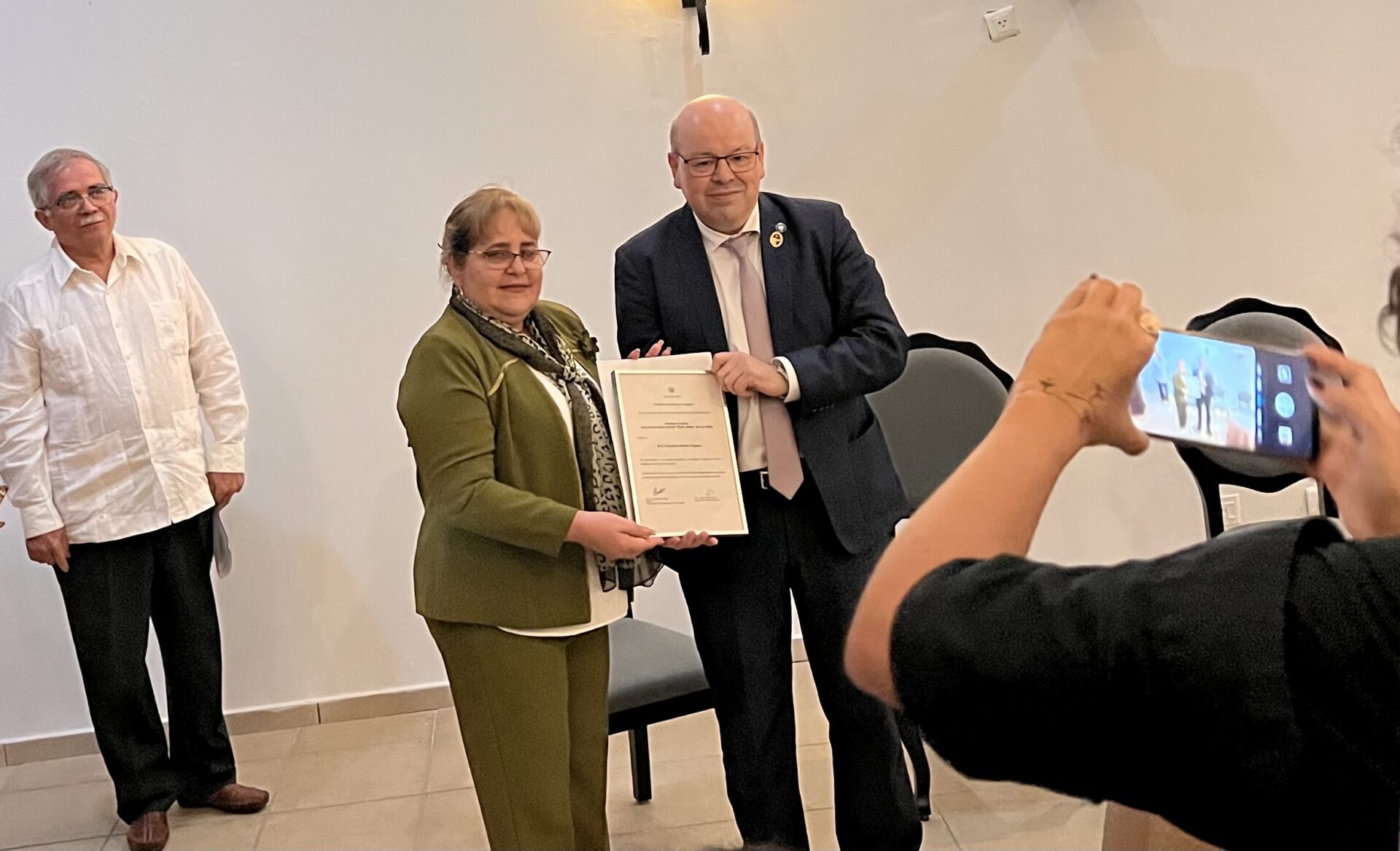
Talk “Artificial Intelligence in the 21st Century: What it can offer us, and what we have to be careful of” by Daniel Molina at the State University of Londrina (Universidade Estadual de Londrina), Brazil.
- Get access to the presentation at zenodo.
- See announcement at State University of Londrina.
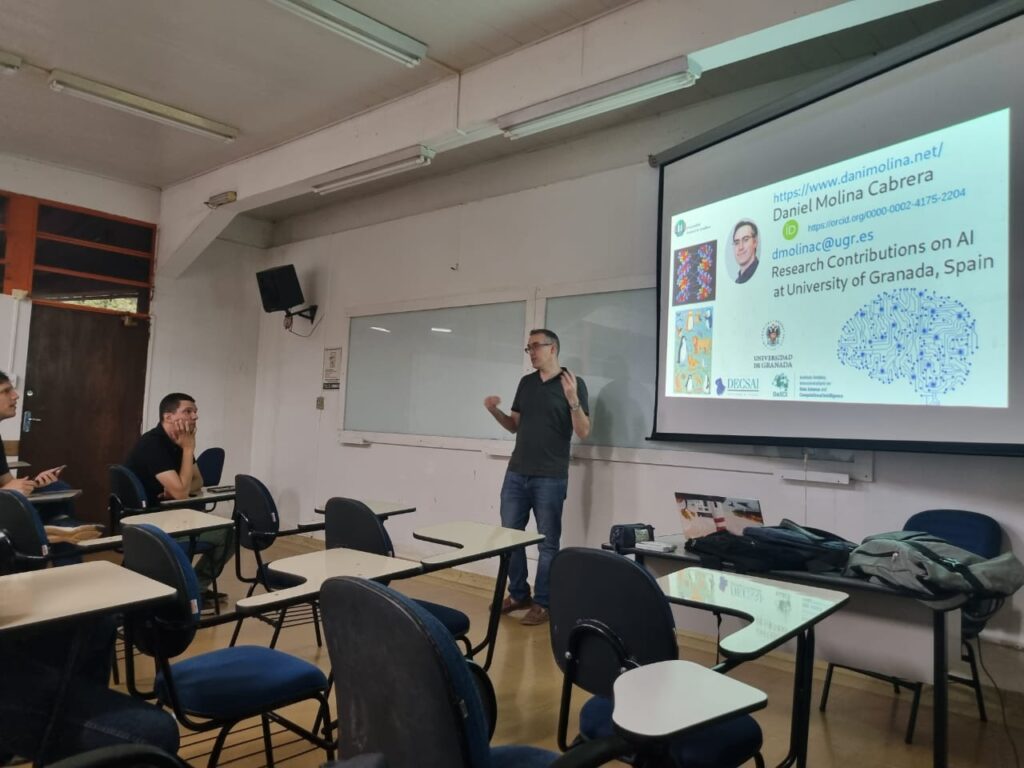
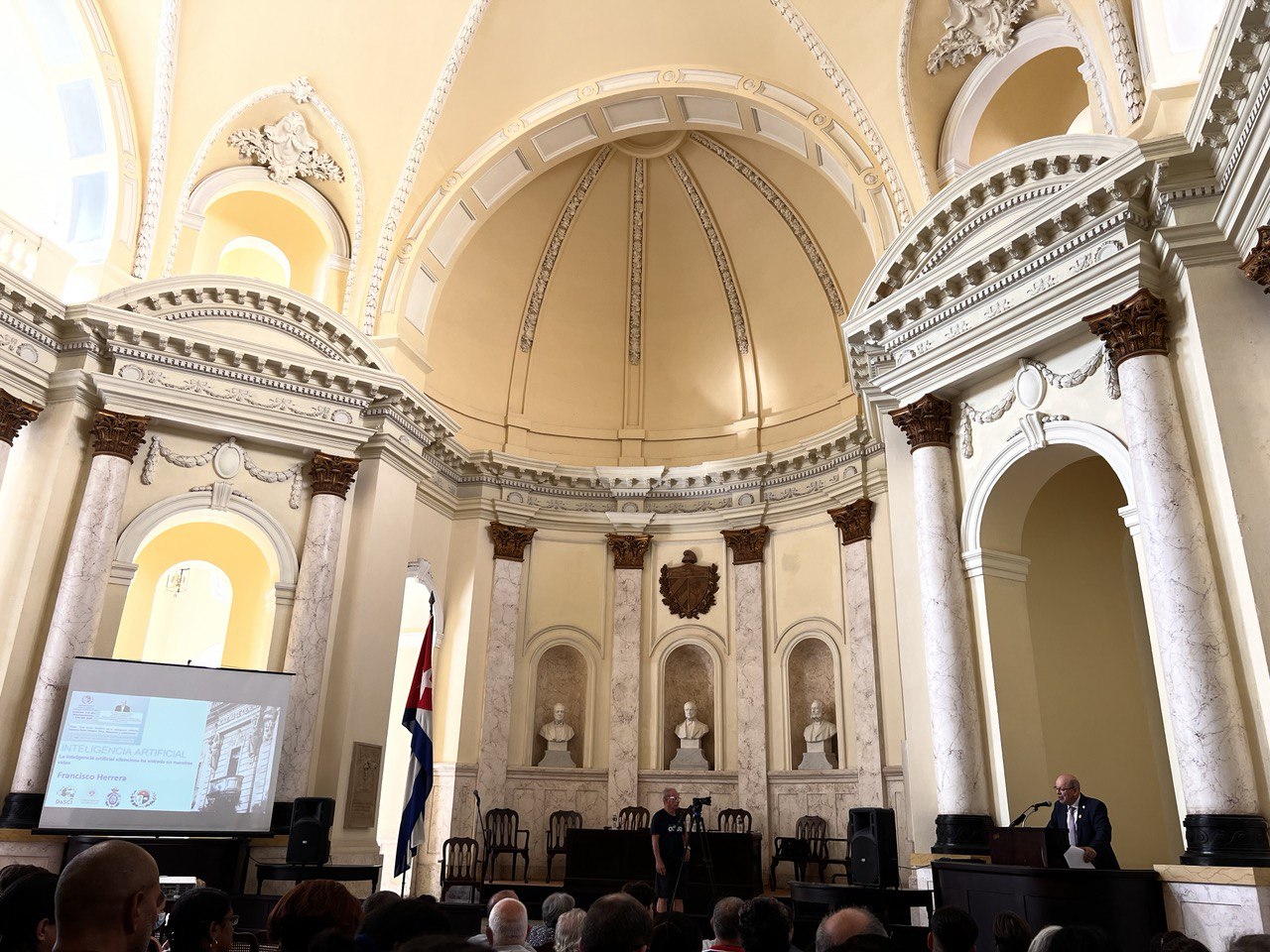
Francisco Herrera, receives his designation as a member of the Academy of Sciences of Cuba
16 November, 2023
#InMedia #Awards #November 2023
Last Monday at the Open Days of the Academy of Sciences of Cuba (ACC) in an open session on Artificial Intelligence, the Director of the DaSCI Institute gave a lecture entitled “A Holistic Vision of Artificial Intelligence. Safe and Reliable: Risks, Ethics, Regulation and Auditability”.
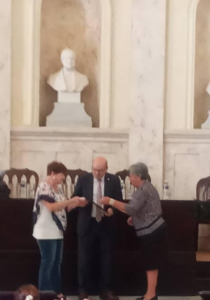
At the same event, he was officially awarded the status of Academician of the Academy of Sciences of Cuba, which was granted to him in August 2022 together with the researcher José Luis Verdegay, also from the University of Granada.
This appointment comes in recognition of his extensive research career and the promotion of knowledge and technology transfer in international and national projects as well as with companies at all levels.
Both researchers have more than 1,000 scientific productions, including more than 50 books and more than 700 articles in leading journals.
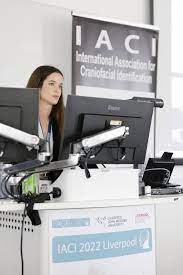
UGR doctoral student, Práxedes Martínez Moreno, awarded at the Spanish Scientific Computer Society Awards
9 October, 2023
#InMedia #Awards #October2023
The award recognizes the contribution of women pursuing doctoral studies in the area of computer science to encourage their start in the research career and create references for new generations.
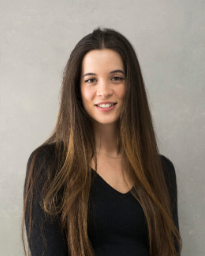
The Spanish Computer Science Society (SCIE) has awarded a runner-up prize in the third edition of the SCIE-ZONTA-SNGULAR awards to Práxedes Martínez Moreno, a PhD student at DaSCI Institute, University of Granada. The research line of the winner is New Methods of Human Identification by Craniofacial Superposition Based on Artificial Intelligence, and is directed by Sergio Damas, professor of the Department of Computer Languages and Systems, and Pablo Mesejo, professor of the Department of Computer Science and Artificial Intelligence.
In the resolution of the second prize to Práxedes Martínez Moreno, the jury explains that the winner develops “a very promising research activity and also a very active commitment in activities aimed at promoting the participation of women in the field of technologies, being aware of the personal effort that sometimes this means for women”.
All Information in the following links (In Spanish):
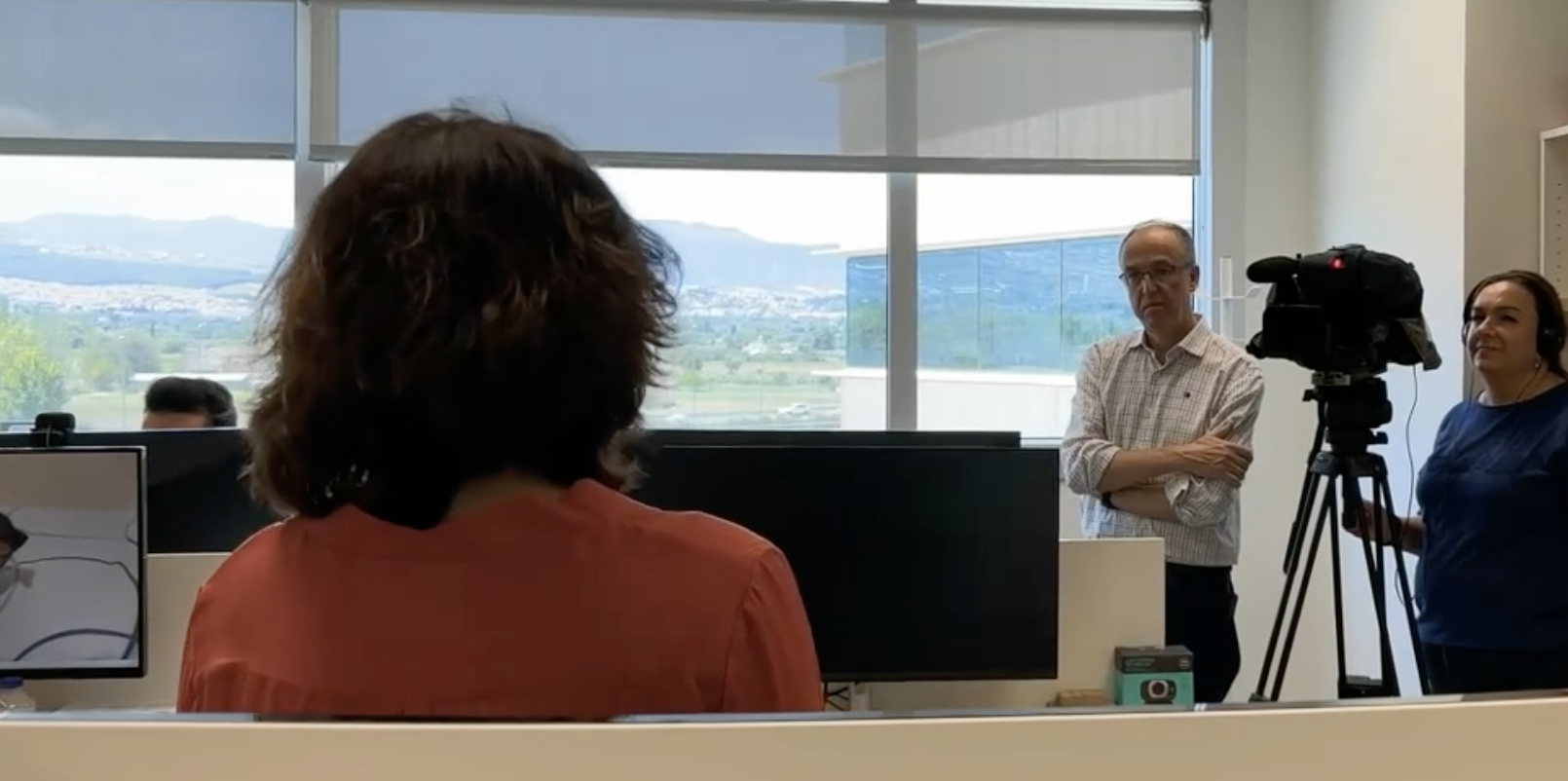
Artificial Inteligente Revolution In Andalusia Spain
1 August, 2023
CANAL SUR MEDIA | July 8, 2023
In the public television program Los Reporteros, Canal Sur journalists offer a space of analysis on the pros and cons of solutions based on Artificial Intelligence. It is shown as a new tool that can add great value for Andalusia. In the program, Andalusian researchers are interviewed with focus on Granada and Seville.
In the case of Granada and the spaces associated with the PTS and the DaSCI institute, Professor Francisco Herrera and the researchers and members of DaSCI, Rosana Montes and Isaac Triguero, are interviewed from minute 7:18 onwards.
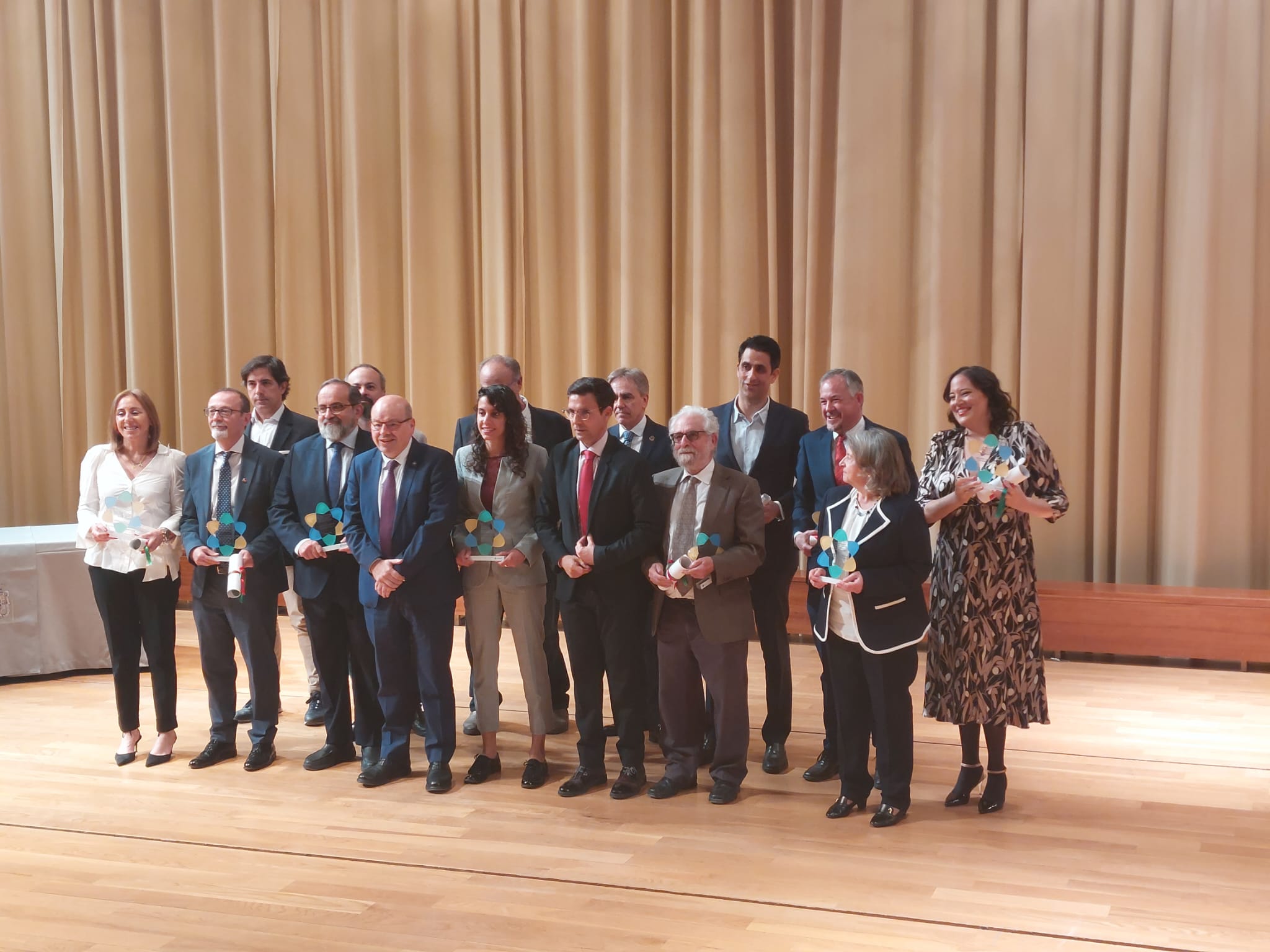
Oscar Cordon awarded in the fourth edition of the “Granada, City of Science and Innovation” Awards
14 March, 2023
InMedia #Awards #March2023
The awards ceremony of the prizes ‘Granada. City of Science and Innovation 2022, was held last Friday at the Manuel de Falla Auditorium. We accompanied Óscar Cordón, DaSCI researcher who received an award in the category of Innovation to Knowledge Transfer.
It has been an afternoon in which science and its dissemination has occupied a protagonist space and in which the great scientific talent of all those recognized with these awards given by the City of Granada has been valued.
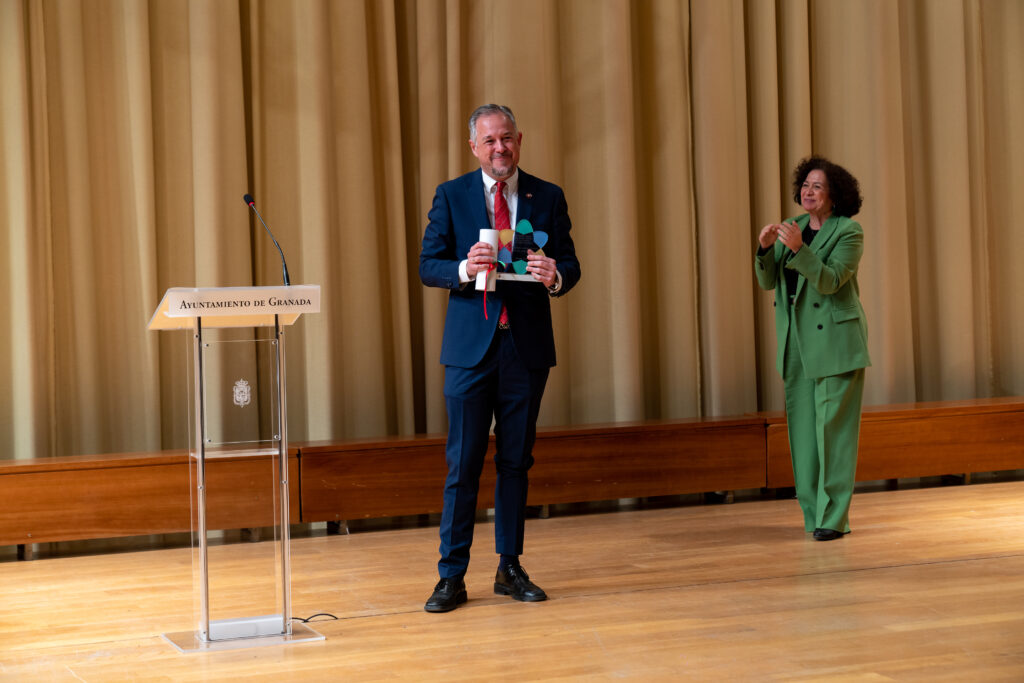
More information (In Spanish):
Ten Granada research projects to keep track of in 2023
20 February, 2023
#News #InMedia
The IDEAL newspaper of Granada publishes in its publication of Sunday, February 19, 2023 a news item that lists ten cutting-edge researches that will be of interest for their results. They refer to projects of the University of Granada, DaSCI, CSIC and Genyo among others. Two of those mentioned are GOIMAI (https://goimai.es) and the Forensic Lab, research carried out by DaSCI members.
Home page: https://www.ideal.es/ciencia/diez-investigaciones-granadinas-20230219174042-nt.html
Downloadable:
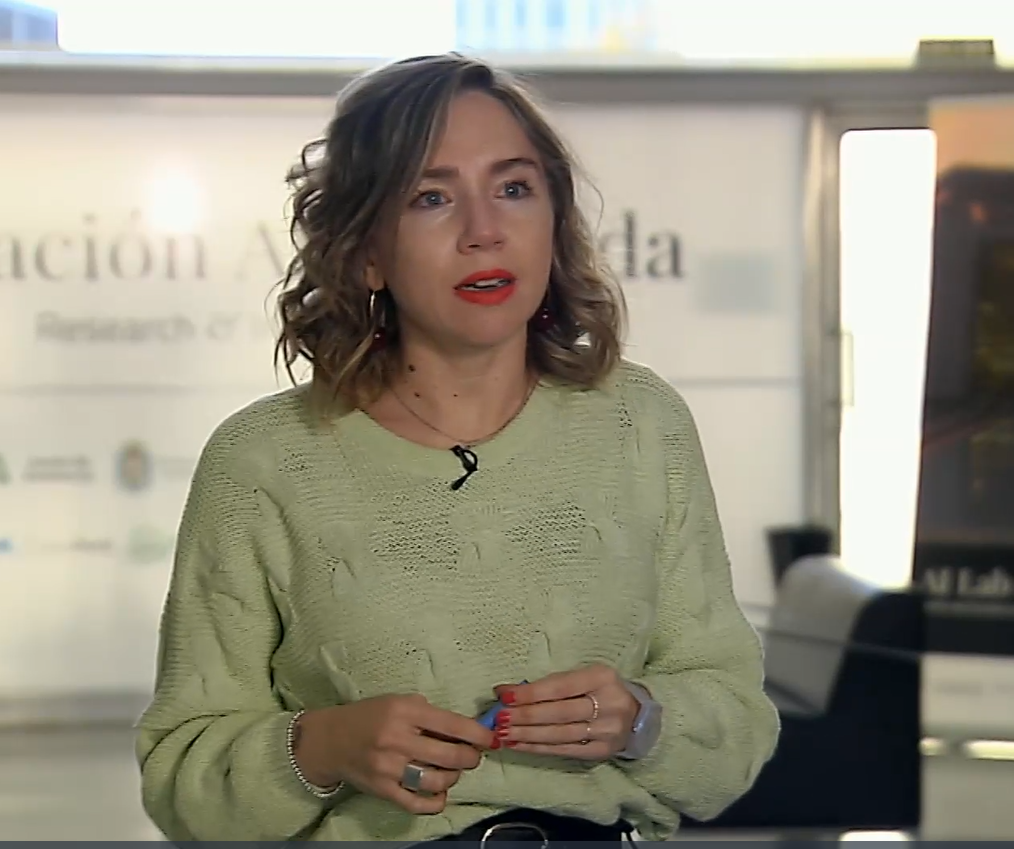
Natalia Diaz: “I want to make the right AI for the right reasons”
17 January, 2023
CANAL SUR #InMedia
Last Monday, January 16, Natalia Diaz (DaSCI researcher) participated in the program Conciencia of Canal Sur to talk about explainable, reliable and responsible Artificial Intelligence.
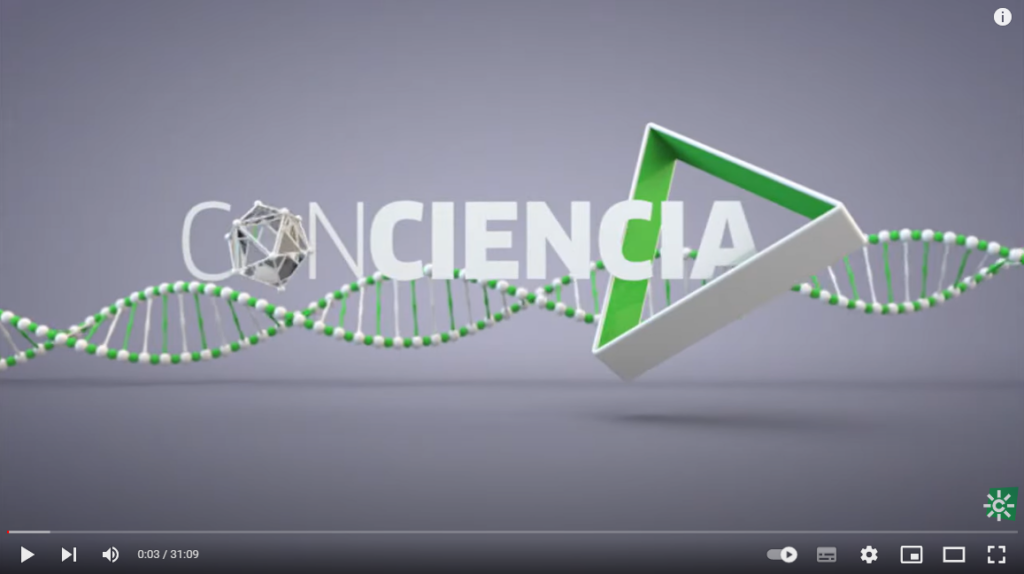
(Minute 13.30 of video. In Spanish)
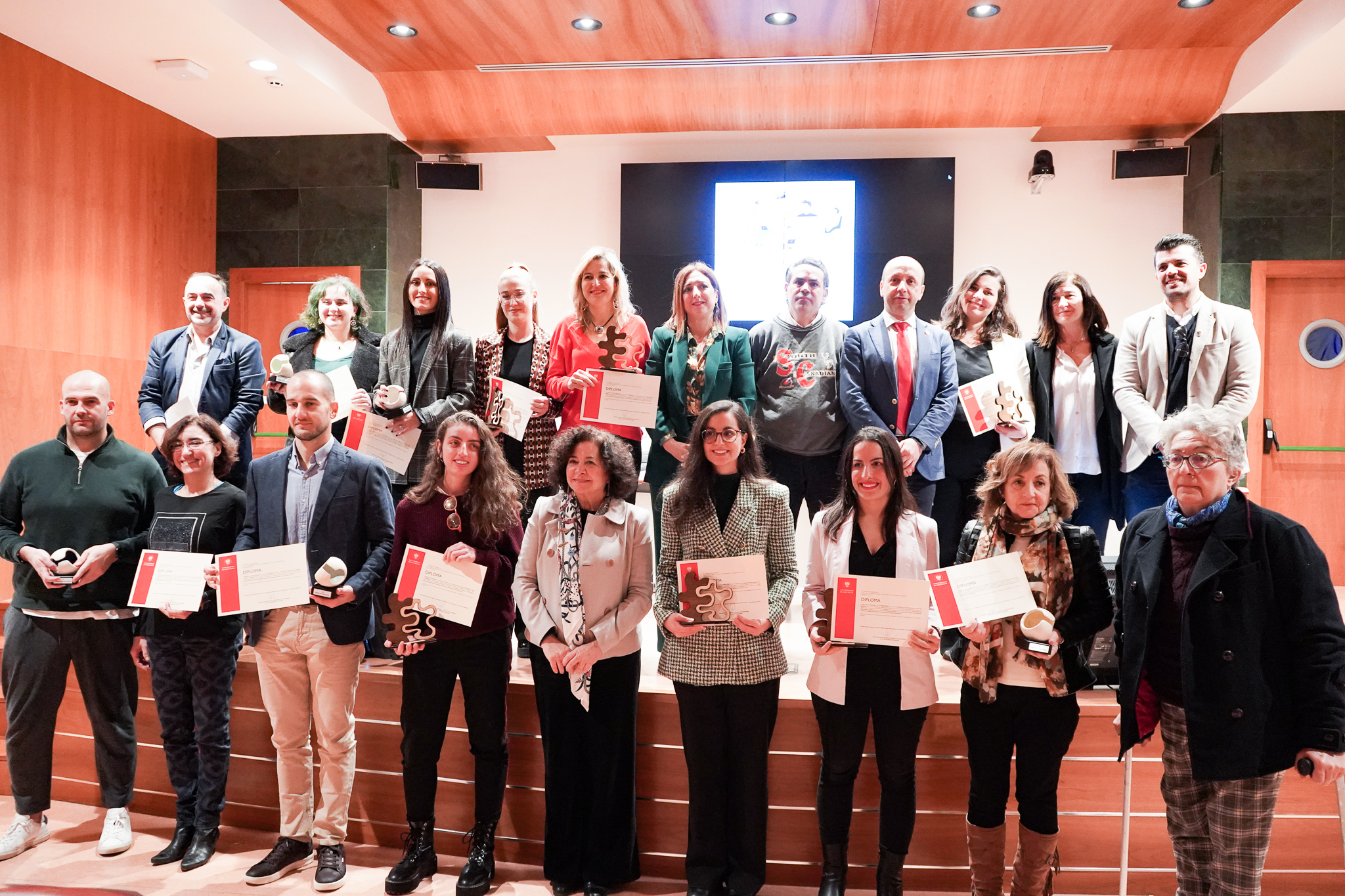
Inclusion Award to a DaSCI doctoral thesis
11 January, 2023
#Media #Awards #January 2023
The rector of the University of Granada, Pilar Aranda, presided last January 11 the award ceremony of the first edition of the awards and runner-up prizes for the best bachelor’s, master’s and doctoral theses in the field of equality and inclusion. In total, 12 awards have been granted: 4 for TFG, 4 for TFM and 4 for doctoral thesis.
The inclusion prize for a doctoral thesis was awarded to Liliana Beatriz Herrera Nieves for the research entitled ‘Evaluation of Moodle Usability. Ambientes Educativos Virtuales Inclusivos a partir del Diseño Universal de Aprendizaje’ and directed by the directors Emilio Crisol and Rosana Montes, secretary of DaSCI.
Post in CanalUGR: https://canal.ugr.es/noticia/la-ugr-concede-los-premios-a-los-mejores-trabajos-fin-de-grado-fin-de-master-y-tesis-doctorales-de-igualdad-e-inclusion/
Photo gallery of the awards ceremony: http://sl.ugr.es/0d1w
Post in GranadaHoy Press: https://www.granadahoy.com/granada/Entrega-fin-doctorales-inclusion-UGR_3_1756054397.html
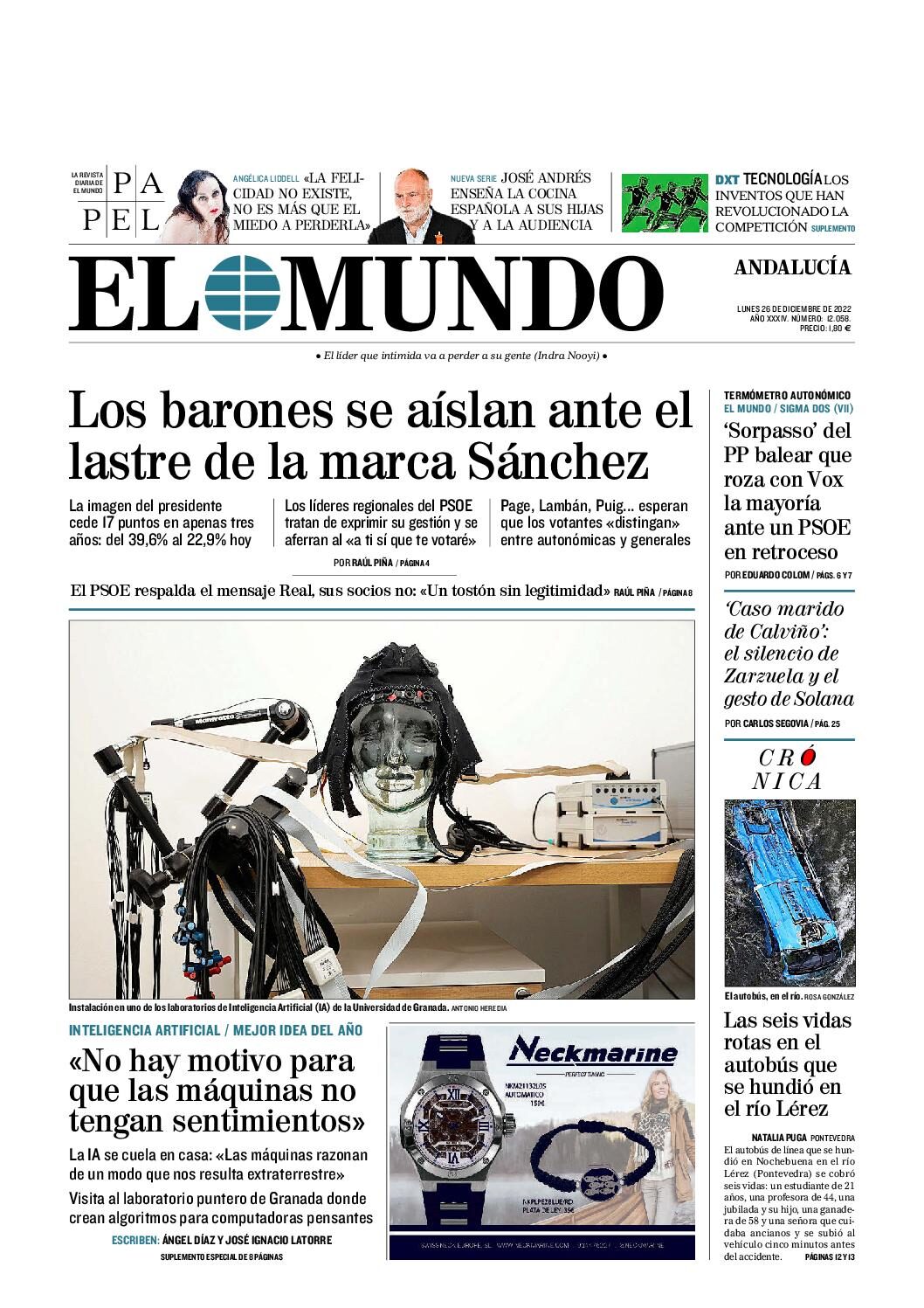
Artificial Intelligence: the Idea of the year 2022
27 December, 2022
#News #InMedia
In the special supplement of the newspaper El Mundo of Monday, December 26, 2022, Artificial Intelligence is presented as the idea of the year. With the title “The great leap forward of Artificial Intelligence” and the support of the Dall.E image generator that illustrates the 8 pages of this special, three questions are covered, which will be answered by specialists and also by the OpenAI chatbot.
For this issue, journalist Angel Diaz interviewed three DaSCI researchers: Natalia Diaz, Rosana Montes and Sergio Damas.
Home page: https://www.elmundo.es/television/medios/2022/12/25/63a8bde9e4d4d855188b4588.html
Downloadable supplement: https://dasci.es/wp-content/uploads/2023/01/2022-12-26_especial_IA_ElMundo.pdf
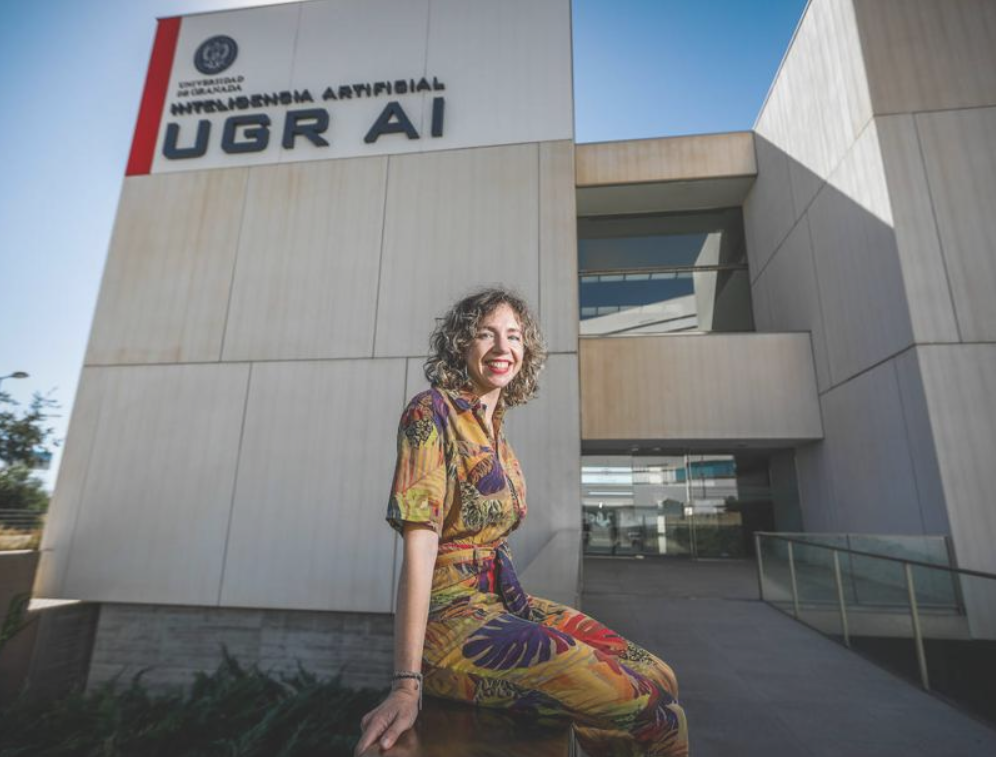
Interview in the local press to DaSCI researcher Natalia Diaz
19 December, 2022
#News #InMedia
“Artificial Intelligence products will come with a prospectus, like medicines”
After 11 years between Paris, California and the Netherlands, Natalia Diaz joins the group of experts in AI at the University of Granada.
IDEAL de Granada (In Spanish)
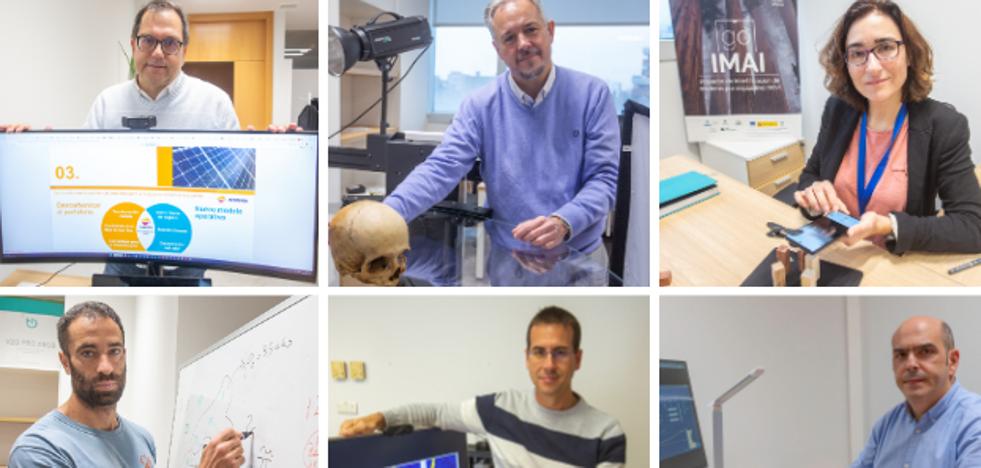
Six AI projects from Granada that go to the market
5 December, 2022
#News #InMedia
Six DaSCI researchers share their projects in IDEAL newspaper
These tools show how Science leaves the laboratories to have a direct impact on companies and administrations by providing solutions.
IDEAL de Granada (In Spanish)
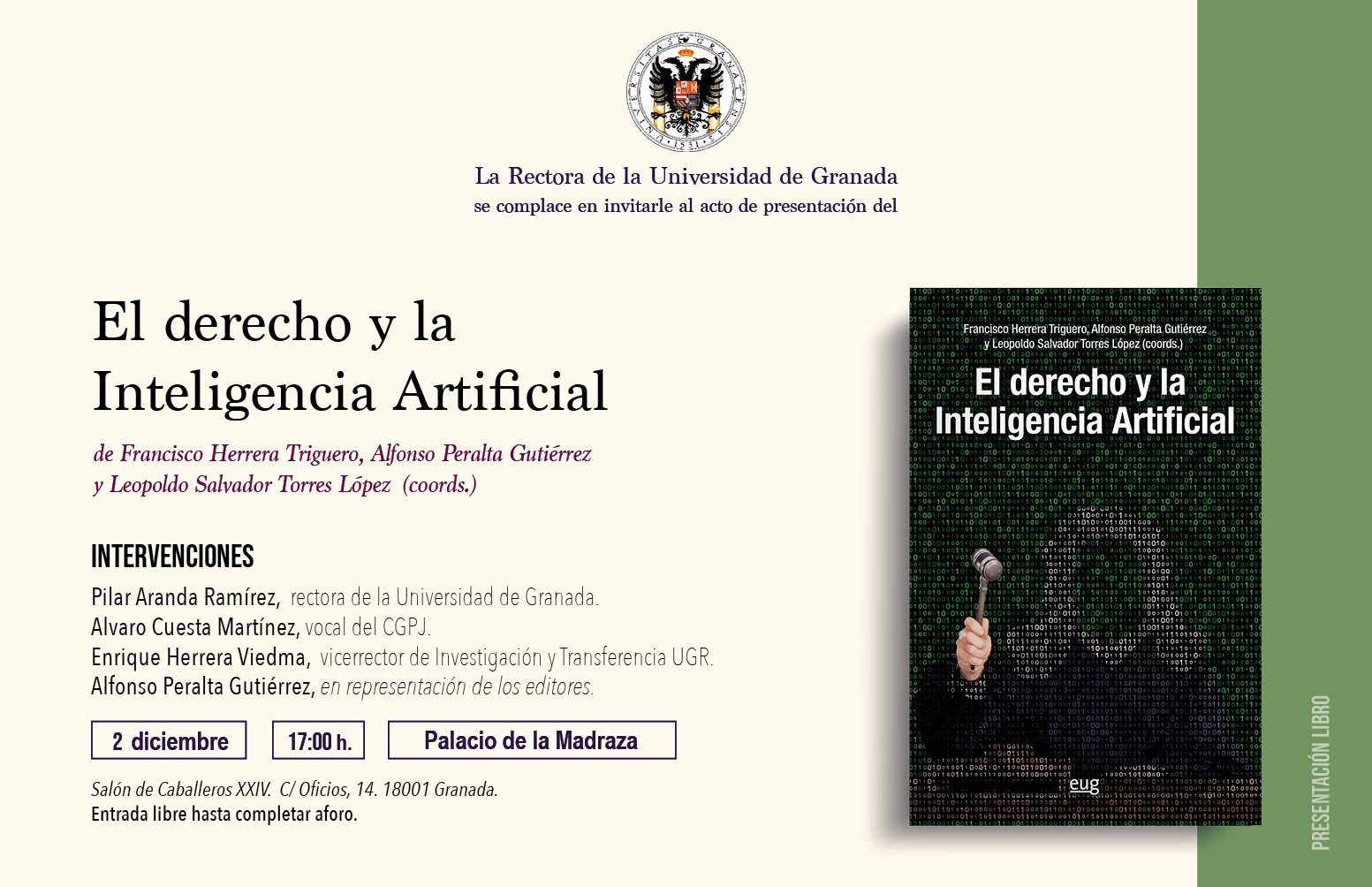
The UGR and the CGPJ present in Granada a book on Law and Artificial Intelligence
2 December, 2022
#News #InMedia
The work that has been prefaced by the Secretary of State for Digitalization and Artificial Intelligence, Carme Artigas.
The text collects the different editions of the course on Law and Artificial Intelligence in which participate, among others, the director of the Institute Francisco Herrera and the researchers Óscar Cordón and María José del Jesus.
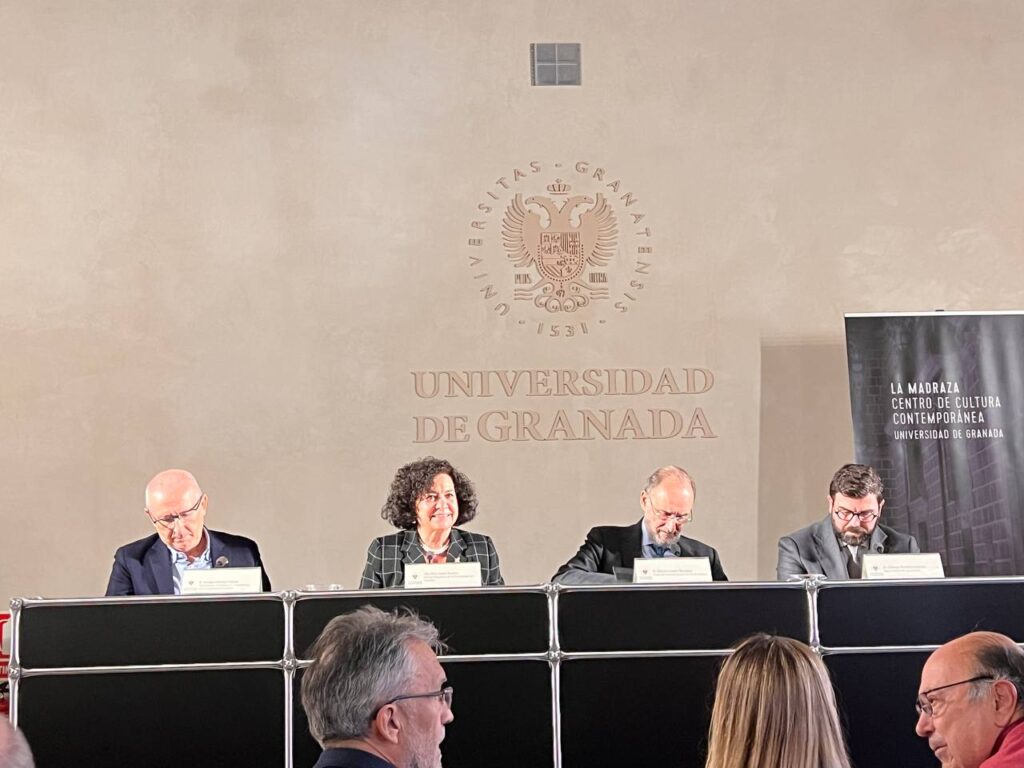
IDEAL de Granada (In Spanish)
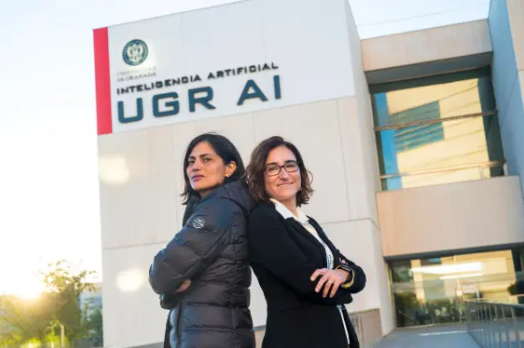
Towards artificial intelligence… and environmental intelligence
1 December, 2022
#News #InMedia
In a joint interview with EFE, Rosana Montes and Siham Tabik, full professors in the departments of Languages and Computer Systems, and Computer Science and Artificial Intelligence at the University of Granada, respectively, give good proof that AI and sustainability already go hand in hand.
In a world increasingly concerned about the consequences of climate change, artificial intelligence (AI) puts all its potential at the service of sustainable development, with algorithms that “jump” from computers and cell phones to nature to contribute to environmental improvement.
These two experts, concerned about issues related to the environment and in favor of promoting interdisciplinarity in science, agree that the revolution represented by AI, must be compatible and is also necessary for sustainable development in general, and for the fight against climate change in particular.
Complete News. EFE COMUNICACIÓN (In Spanish)
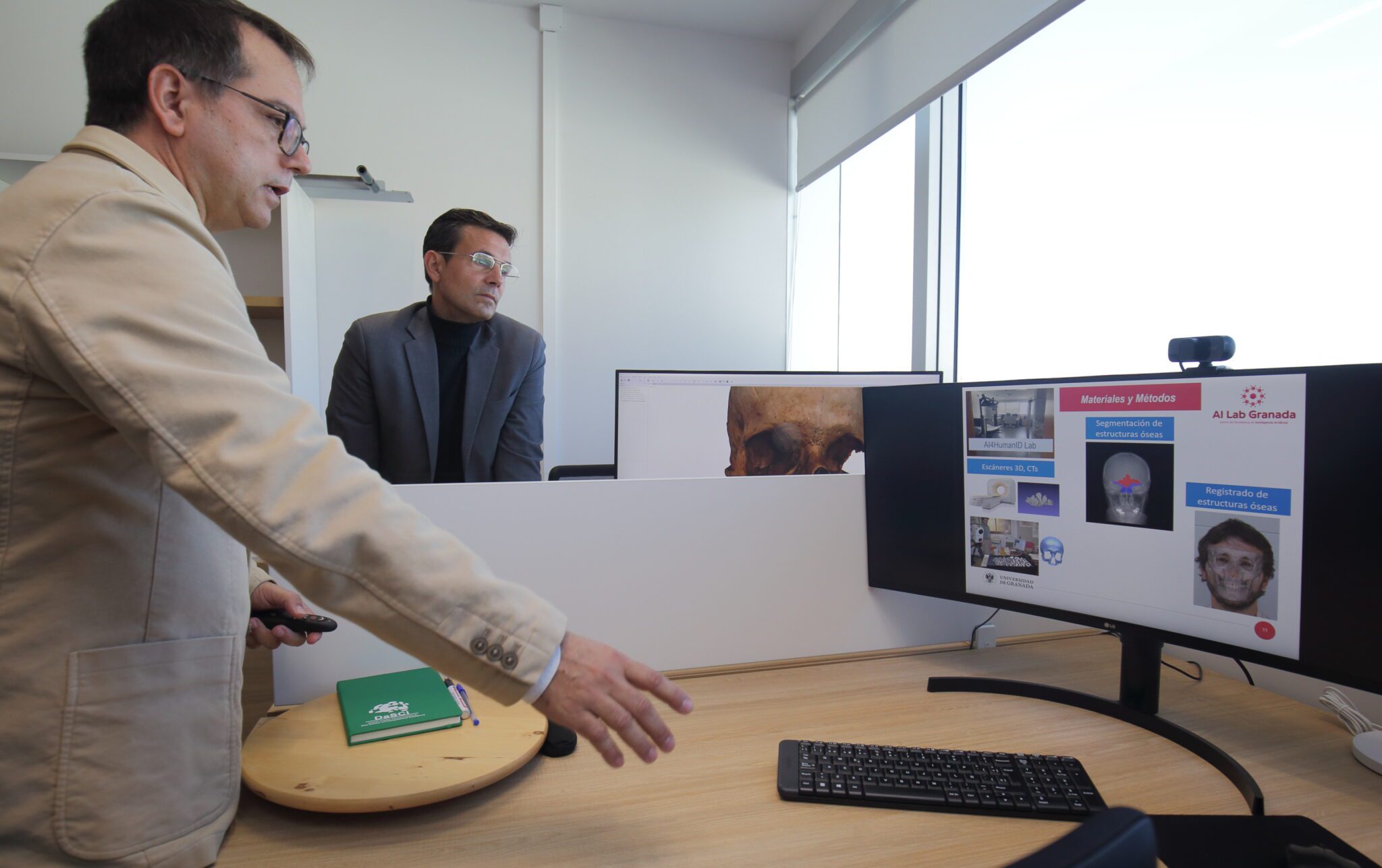
Mayor of Granada visits DaSCI facilities
25 November, 2022
#In press #Nov24
During his visit to the DaSCI Institute facilities in the Health Technology Park, the mayor was able to see the use of the 3D scanner of our forensic laboratory. Professor Sergio Damas, gave a demonstration and explained the uses and applications of this line of research, one of the 33 lines in total that our institute has.
In statements to the press, Mayor Paco Cuenca said: “Granada’s candidacy is not a one-time occurrence, but a definite ambition thanks to the opportunity generated by the University to take advantage of the talent that is developed in the different research frameworks for the transformation and improvement of the productive model in our city” #AESIAgr
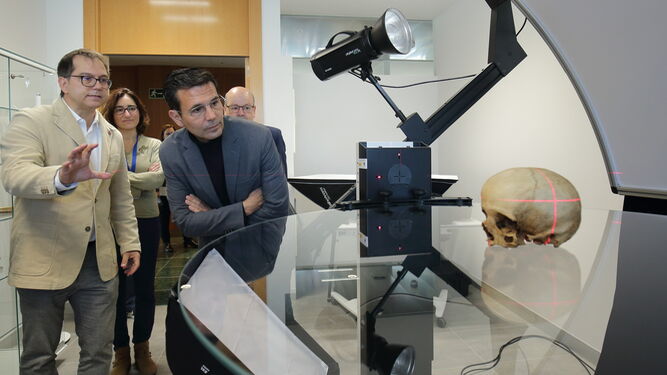
Access to the news in the press:
- Granada Hoy https://www.granadahoy.com/granada/alcalde-Granada-justicia-AESIA_0_1741627035.html
- Granada Digital https://www.granadadigital.es/resumen-semanal-una-estrella-para-granada-y-un-borron-mundial-para-la-humanidad/
- Andalucía Europa Press https://www.europapress.es/andalucia/noticia-alcalde-afirma-justicia-granada-albergue-agencia-estatal-inteligencia-artificial-20221124145753.html
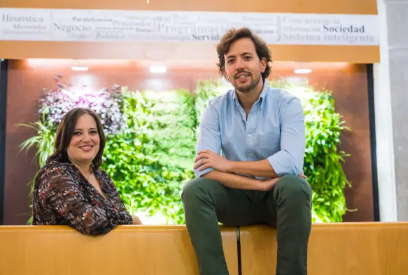
Spanish seeks its place in the challenge of humanizing technology
14 November, 2022
#News #InMedia
UGR Researchers Eugenio Martínez and Zoraida Callejas are interviewed by the EFE news agency and introduce us to natural language processing and its need to humanize technology.
Natural language processing is the set of computational and informatics techniques that enable machines to understand and generate human language, whether spoken or written, in any language. Its potential applications go beyond machine translators or virtual assistants such as “Alexa” and encompass almost all areas of life.
Complete News, EFE COMUNICA (In Spanish)
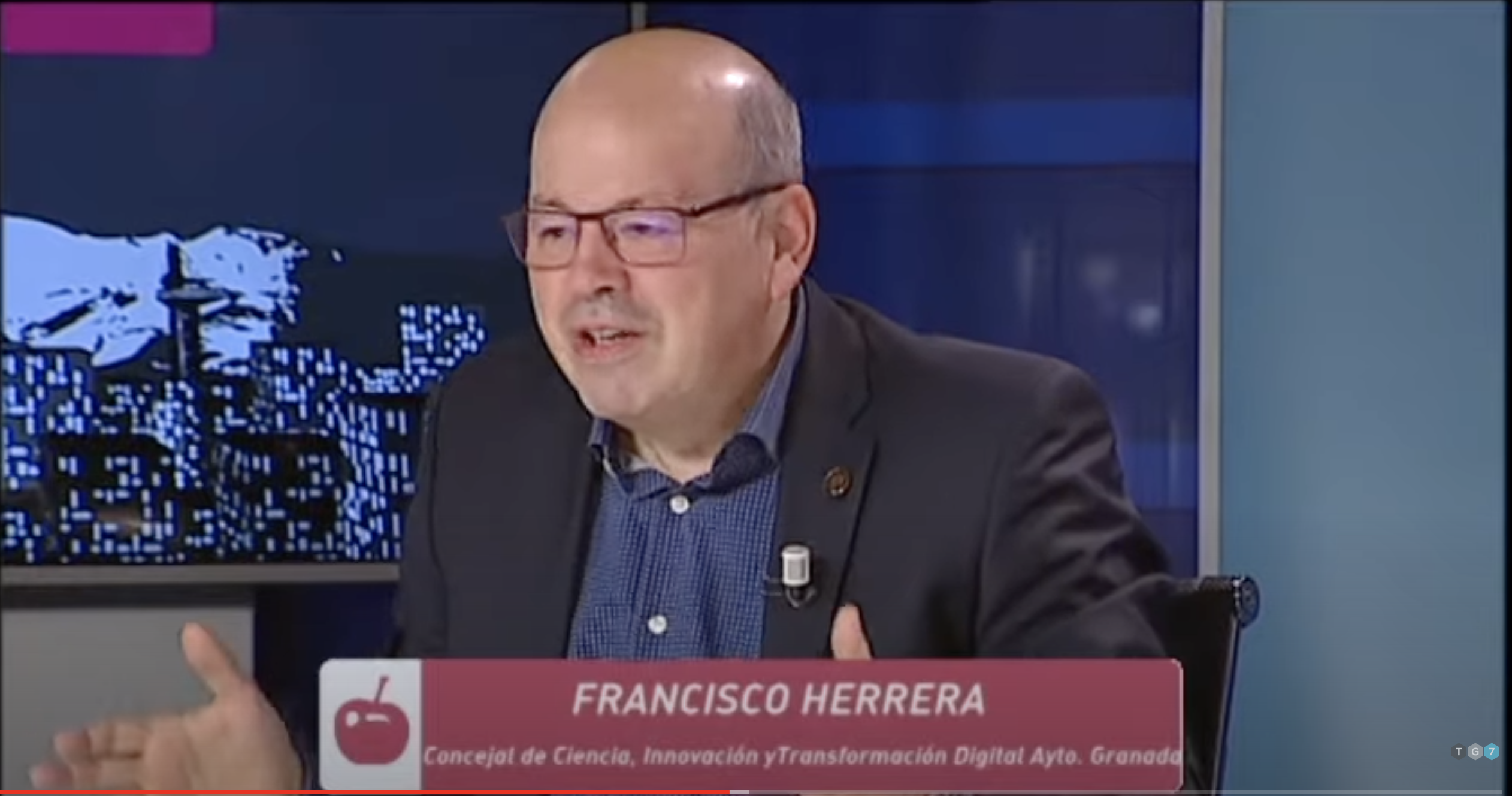
Granada candidate to be AESIA headquarters
10 November, 2022
#TG7 Granada #LaGuinda #Monday November 7, 2022
Panel discussion with representatives of the team work on the preparation of the proposal presented by the City of Granada to be a candidate for the headquarters of the State Agency for the Supervision of Artificial Intelligence. The program La Guinda of the local television of Granada TG7, brought together representatives of the City Council of Granada, the University of Granada, the Technological Park of Health, the Technological Circle and the Chamber of Commerce of Granada.

Coral del Val: Artificial Intelligence and Genetics Research
8 November, 2022
CANAL SUR
A few days ago, the researcher of the Coral del Val Institute, participated in the program Conciencia on Canal Sur to talk about how artificial intelligence has changed what we know about the history of man based on his genetics.

(Minute 12 of video. In Spanish)
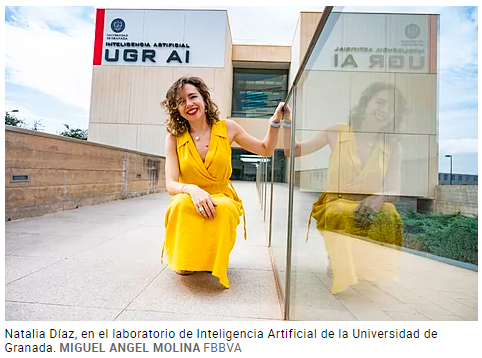
Interview to our researcher Natalia Díaz in the newspaper EL Mundo: “So are the young Spanish ‘brains’ that have not escaped”
7 November, 2022
#News #InMedia
NATALIA DÍAZ: AN ARTIFICIAL INTELLIGENCE THAT WE CAN UNDERSTAND
Artificial intelligence will be increasingly present in our lives thanks to recent advances in machine learning techniques, which allow machines to confront immense data sets and find patterns that a human would be unable to see.
The problem is that these kinds of algorithms work like what experts call a black box, that is, it is not possible to look inside them to understand what they have done and why.
Full article in the newspaper EL MUNDO (In Spanish)
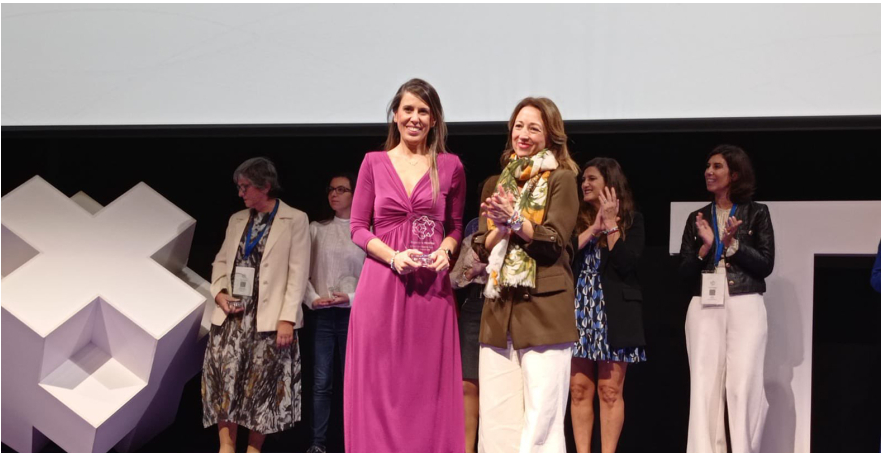
The researcher of the DaSCI Institute, Macarena Espinilla, awarded in the II Margarita Salas Awards for her scientific career
4 November, 2022
#News #InMedia
The researcher of the University of Jaén (UJA) Macarena Espinilla Estévez has been recognized in the II Margaritas Salas Awards for her scientific career, in the framework of Talent Woman Spain 2022, event that has celebrated its fifth edition in the Palace of Fairs and Congresses of Malaga.
All the information in the DIARIO DIGITAL (In Spanish)
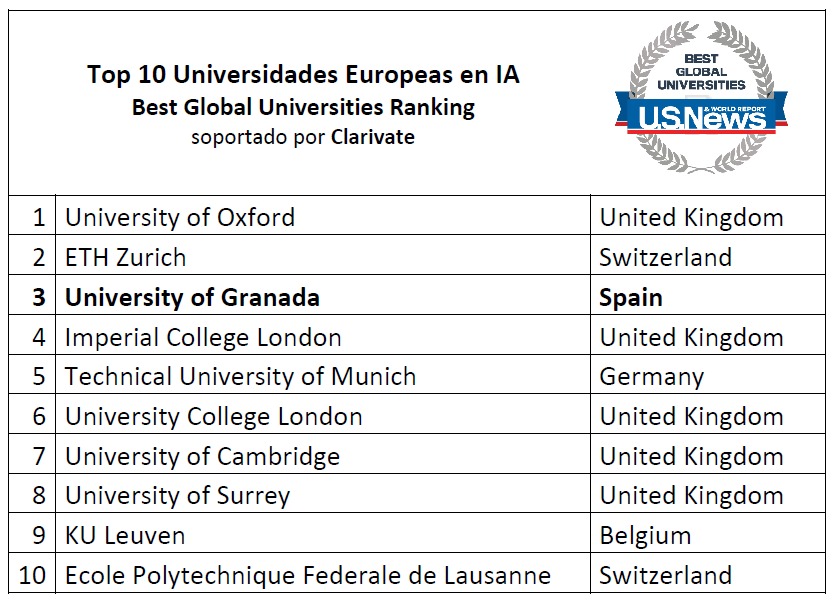
Recognition of talent and excellence in Artificial Intelligence
28 October, 2022
It ends a week of recognition for our researchers that began on Monday 24 with the publication of the “Ranking of the World Scientists: World’s Top 2% Scientists”, prepared by Stanford University, which places 127 UGR researchers among the most influential in the world.
Of that number, a large group of 18 researchers in the area of Artificial Intelligence and Image Processing, are researchers of the DaSCI Institute, which comes to recognize the quality of the research done from our institution.
This ranking, considered one of the most prestigious worldwide, was created by a group of experts from Stanford University, Elsevier and SciTech Strategies. The ranking uses information on the publications of researchers, contained in the Scopus database. To produce it, Scopus data on the number of articles published (1996-2021), the number of times each research has been cited and the length of time researchers have been active were analyzed.
Three days later, the U.S. magazine U.S. News & World Report published the Ranking “2022/2023 Best Global Universities” in which the University of Granada was recognized as the third most important in Europe in Artificial Intelligence (AI).
This ranking evaluates the quality of universities in more than 90 countries, based on 13 indicators that measure their academic performance in research and their global and regional reputation. For this purpose, data from the Clarivate database are used. The result is the 2,000 best universities in the world. Globally, the data place our University in 313th place worldwide and sixth out of 53 nationally.
And all this at a time when Granada left ready the document to be submitted for the candidacy as the headquarters of the Spanish Agency for Supervision of Artificial Intelligence and we can only hope that the great results in both rankings are the necessary impetus to achieve it.
More information: (in Spanish)

Signed a collaboration agreement between CETINIA and DaSCI Institute
23 October, 2022
On October 22nd, the signing of a general protocol of action between the Rey Juan Carlos University (Research Center for Intelligent Information Technologies and their Applications of the Rey Juan Carlos University) and the University of Granada (Andalusian Interuniversity Institute in Data Science and Computational Intelligence), for the realization of joint research and transfer activities, was closed.
These collaborations will be articulated through the signing of more specific agreements that will manage future projects; cooperation in training programs or exchange of research and technical staff; cooperation in technology diffusion and innovation programs; reciprocal sponsorship in conferences, cycles, seminars or events organized by either institution.

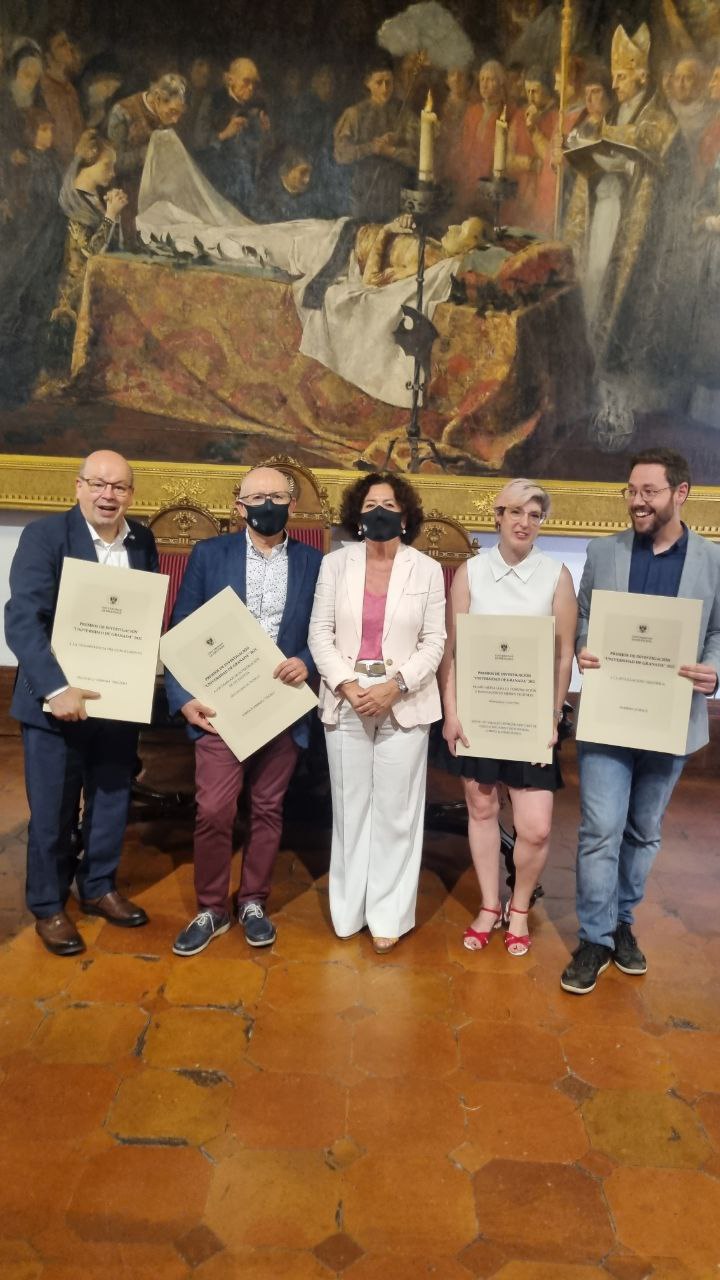
The university recognizes the work of the DaSCI institute in scientific dissemination and in research 2021
13 July, 2022
In the morning of Wednesday, July 7, the UGR Research Awards were presented. The ceremony was led, Pilar Aranda, accompanied at the presidential table by the secretary general, María Asunción Torres, and by Francisco Javier O’Valle, director of Research Centers and Institutes and president of the jury
The University of Granada firmly believes that an effort must be made to transfer to society all the research, teaching and management that is done on a daily basis in the different institutions that make up our university. These awards recognize the value of people and institutions that “help society to understand what we do, how, where and why”.
Our institute has been awarded 4 times in the following modalities:
- UNIVERSITY OF GRANADA AWARD FOR SCIENTIFIC DISCLOSURE, for BARBER’S SCIENCE, of which our colleague Fco. Javier Martínez Murcia.
- UNIVERSITY OF GRANADA AWARD FOR EXCELLENT RESEARCH WORK in the area of Technical Sciences to Enrique Herrera Viedma, Department of Computer Science and Artificial Intelligence, UGR. For the work referred to below: “Consensus Building for the Heterogeneous Large-Scale GDM with the Individual Concerns and Satifactions” Zhang, HJ, Dong, YC, Herrera Viedma, E. IEEE Transactions on Fuzzy Systems, 26,2, 884-898. 2018
- UNIVERSITY OF GRANADA AWARD FOR COMMUNICATION AND INNOVATION IN DIGITAL MEDIA, in its collective modality to the Andalusian Interuniversity Institute in Data Science and Computational Intelligence (DaSCI), Rocio Celeste Romero Zaliz.
- UNIVERSITY OF GRANADA AWARD FOR KNOWLEDGE TRANSFER, to Francisco Herrera Triguero
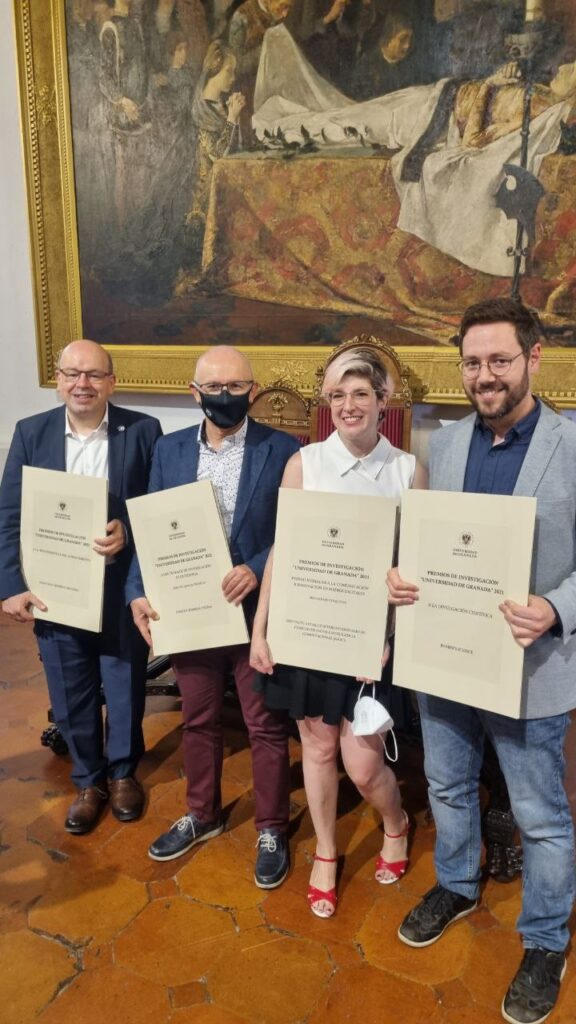
More information (In Spanish):
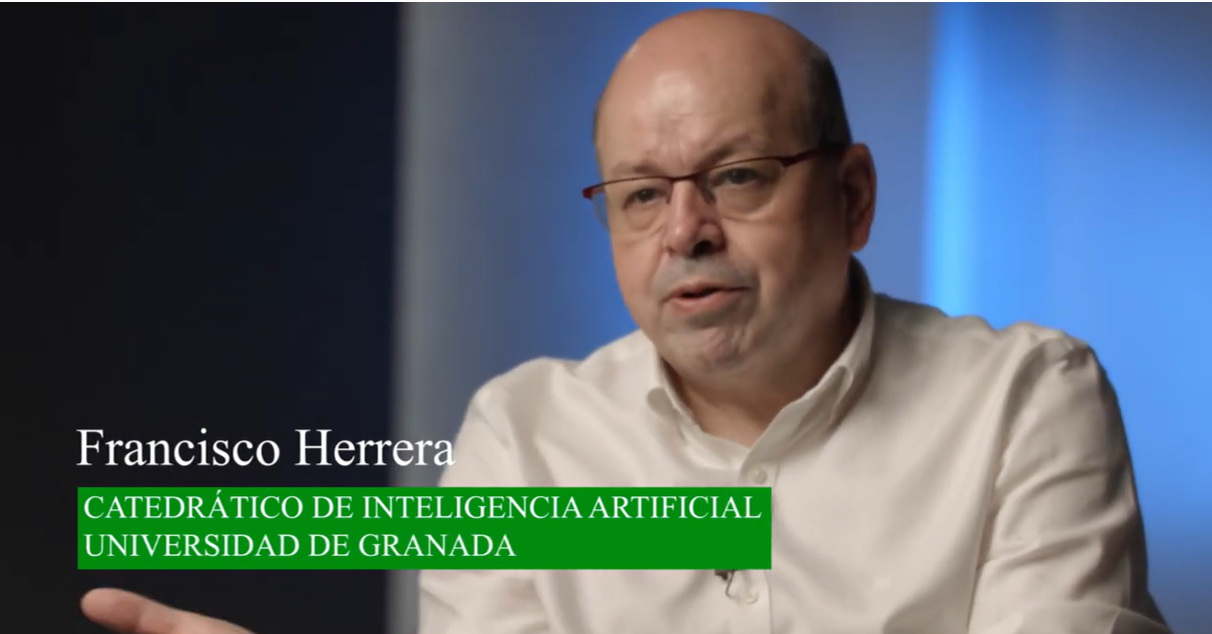
Francisco Herrera, a beatiful mind
6 July, 2022
CANAL SUR TV
A few days ago Canal Sur dedicated a program to the figure of our director Francisco Herrera. Analyzed by those who know him best, Enrique Herrera, Óscar Cordón, Rosana Montes and Nuria Rodríguez, in about half an hour we can get an idea of who is Francisco Herrera.

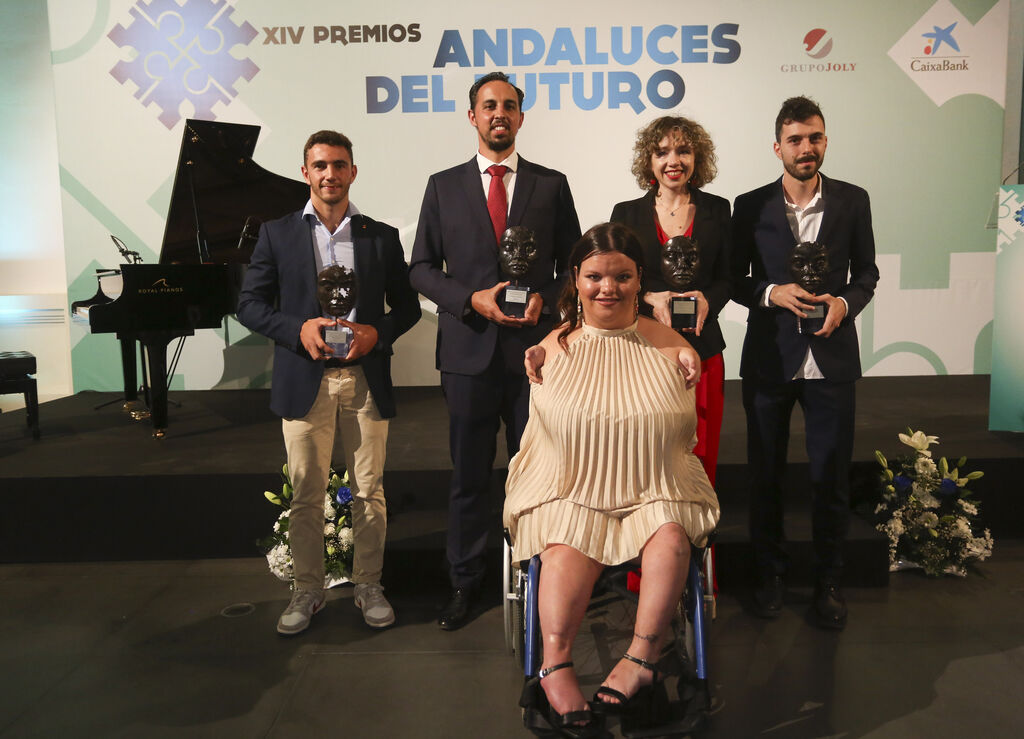
Natalia Díaz, “Andaluces del Futuro” award winner
5 July, 2022
Natalia Díaz, has been awarded in the category of Science of the “XIV Andalusian Future Awards”
Natalia Díaz, DaSCI researcher, has received in Malaga the recognition of her research career. The XIV Andalusian Future Awards, organized by Grupo Joly and Caixabank, have awarded her in the category of Science. More than 200 people attended the Automobile Museum in Malaga to recognize the talent of young Andalusians like Natalia, who are called to be the present and the future of the Andalusian community.
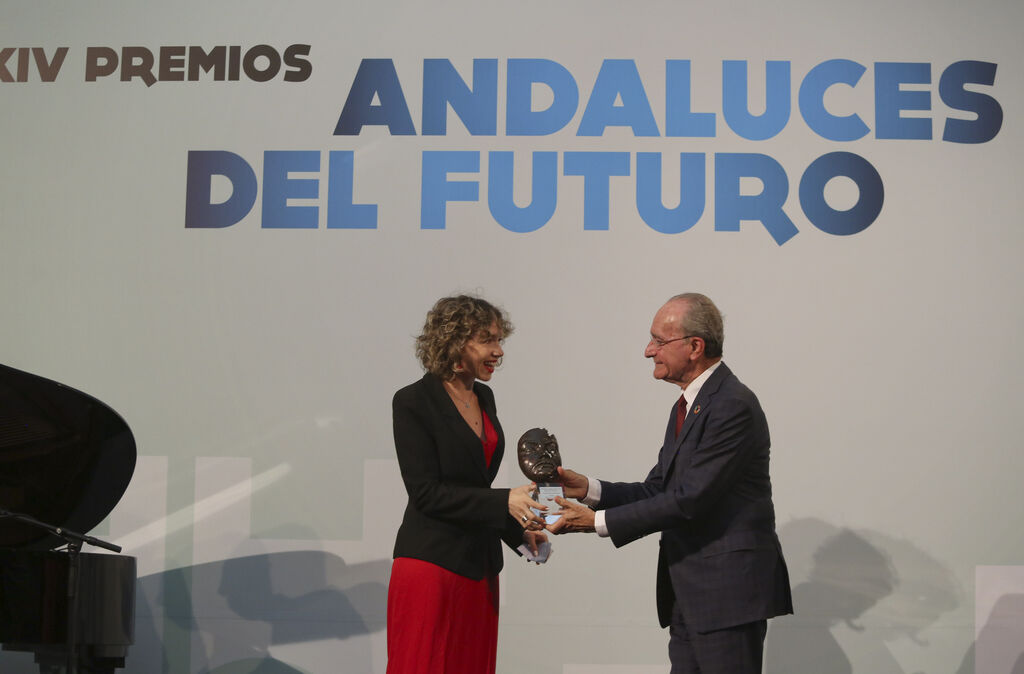
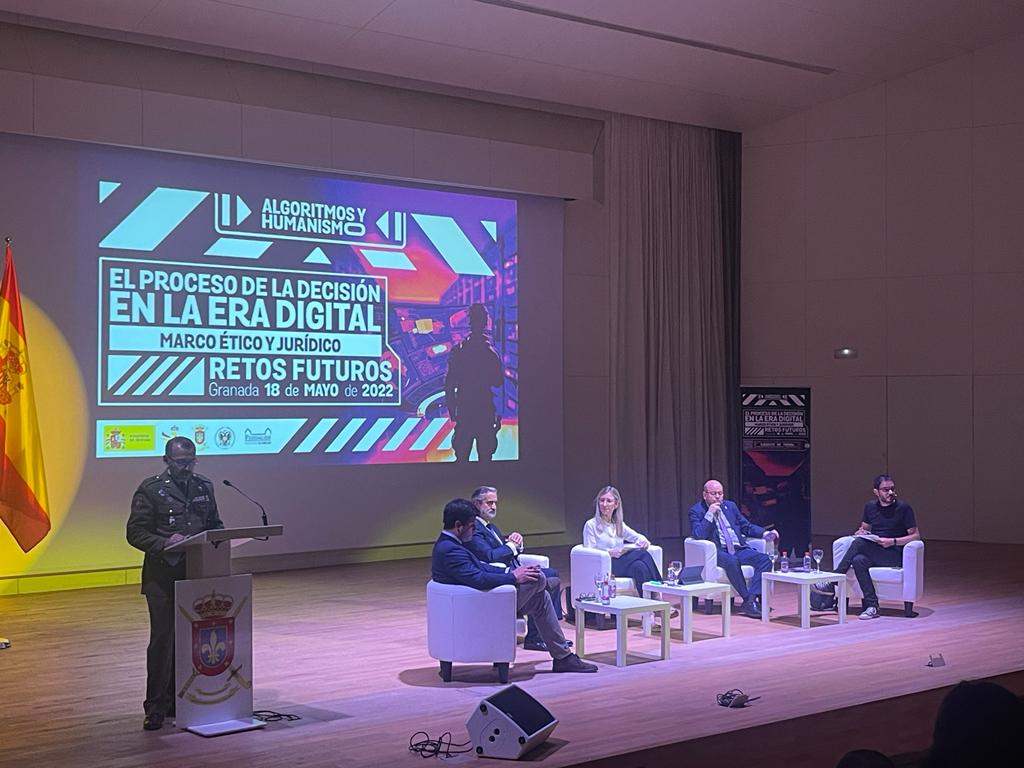
Digital transformation and challenges of Artificial Intelligence in the Spanish Armed Forces.
19 May, 2022
The Spanish Army organizes in Granada a conference on decision-making processes in the digital era.
On the morning of May 18, DaSCI has been present at the conference on digitization in the armed forces organized by the Army. DaSCI researchers attended the event, in the Auditorium of the Campus de las Salud, where Francisco Herrera (Director of the Institute) participated in a round table on Artificial Intelligence and employment.
The event was inaugurated by the Chief of Staff of the Army, Amador Enseñat, and Pilar Aranda, rector of the University of Granada.
The day was divided into three moments, a first conference by the Director of the Center for Information Systems and Technology and Communications of the Ministry of Defense, José María Millán. A round table on Artificial Intelligence and employment moderated by the journalist Marisa Rodríguez and in the afternoon session “Ethical and legal challenges of AI” have been addressed with a panel of experts moderated by Quico Chirino (deputy director of the IDEAL).
All the information about the conference in the following links (In Spanish):
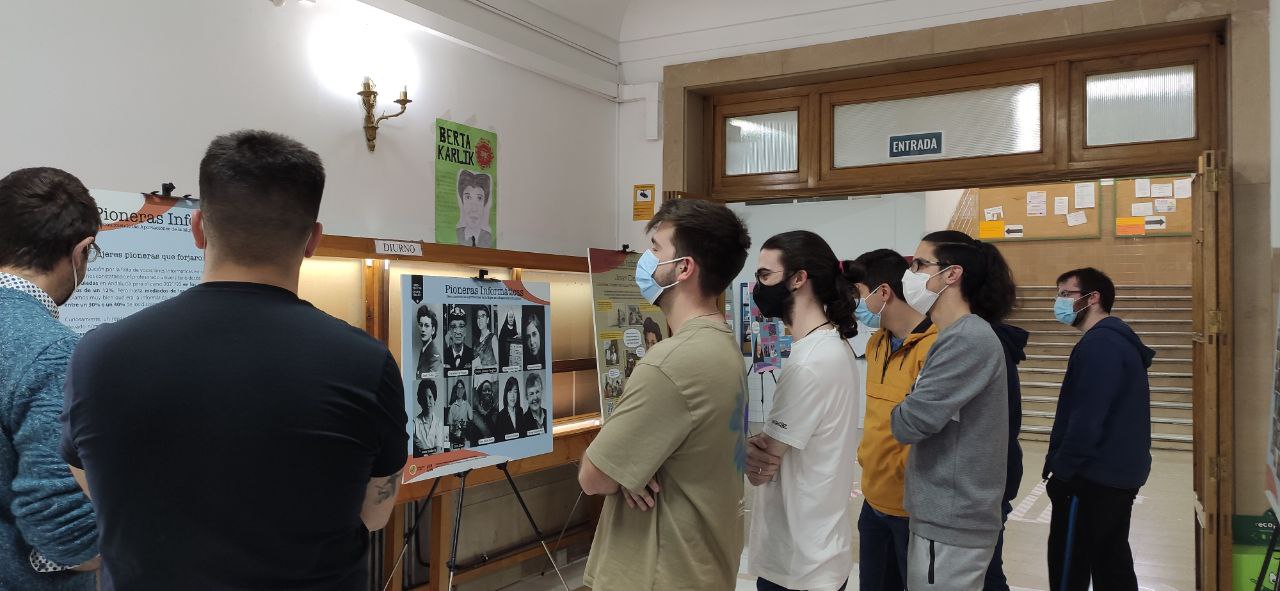
Pioneer Women in IT Exhibition
17 May, 2022
On YouTuve the video that shows us how was the exhibition PIONERAS INFORMÁTICAS. Recognizing the contributions of women in computer engineering.
This is a Cultural Project coordinated by Lina García Cabrera, José Mª Serrano Chica (University of Jaén) and Irene Pedrosa García (IES Auringis) and that has been carried out in the exhibition hall of the Zabaleta building of the University of Jaén between March 3 and April 7, 2022.
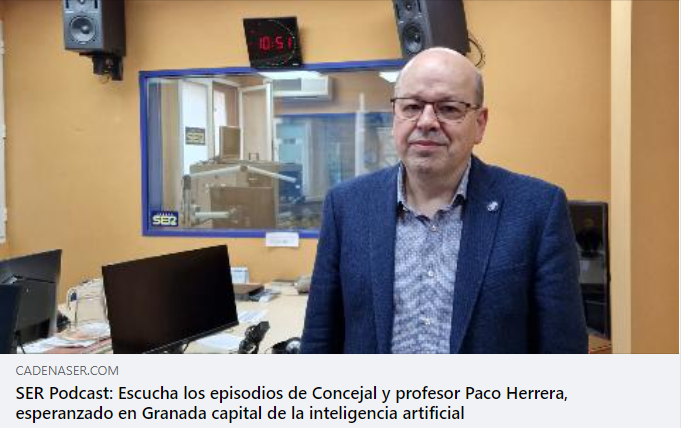
Interview with Francisco Herrera in Cadena SER
5 May, 2022
On the morning of May 4, Francisco Herrera, director of the Institute, was interviewed on Cadena Ser in Granada. He has talked about digital transformation, cybersecurity, digital twins and the commitment of companies like Ghenova for Granada. Also about #aiMPULSA and our desire that Granada becomes the new headquarters of the Spanish Agency for Artificial Intelligence Supervision.
You can listen to the complete program in this link (In Spanish)
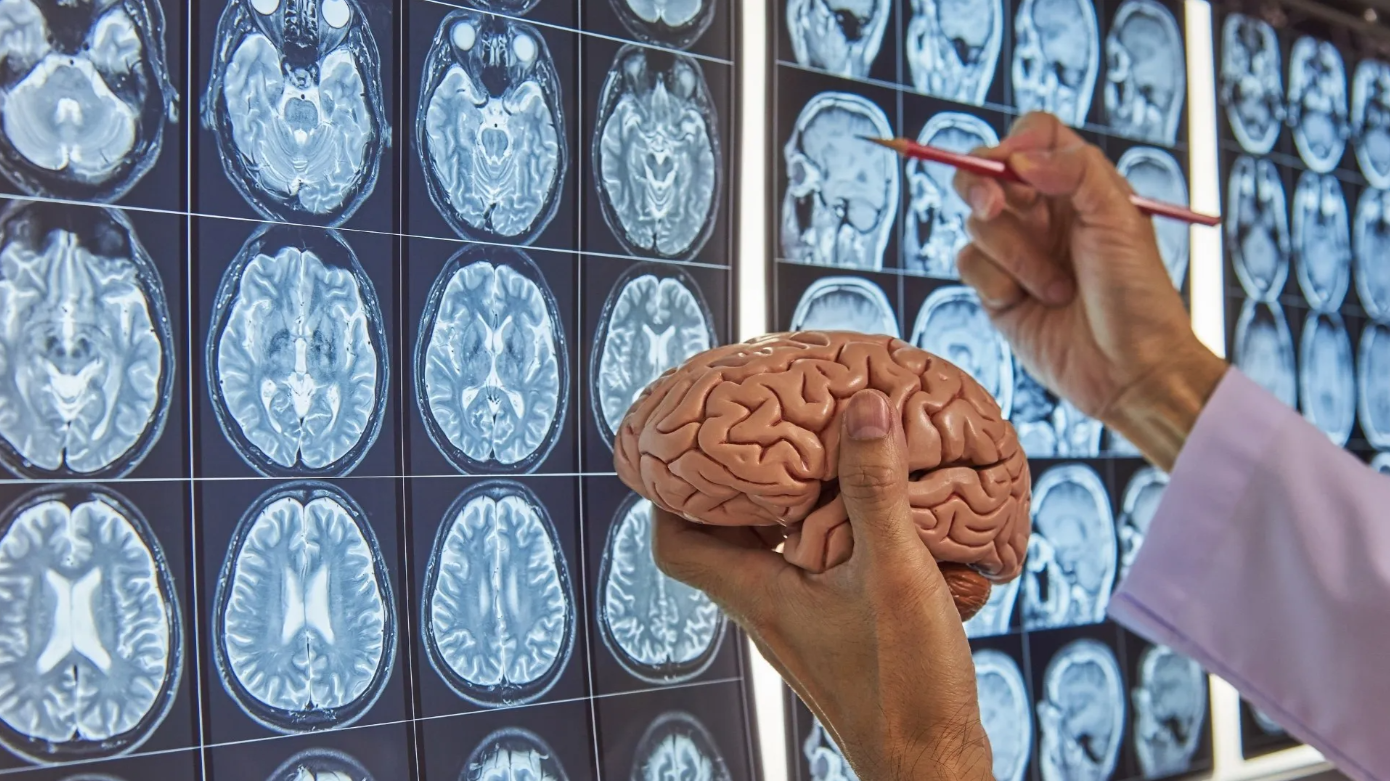
An application designed at the UGR helps the study of the brain using Artificial Intelligence
21 April, 2022
A multidisciplinary scientific team at the University of Granada (UGR) has designed the MVPAlab application, which thanks to programming and artificial intelligence (AI) offers an intuitive and easy-to-use tool for the analysis of brain electroencephalograms, key explorations in human neuroscience. This work exemplifies the existing collaboration between university institutes of the UGR that unite AI with the study of the human brain.
The group of researchers leading this advance is formed by David López and José M.G. Peñalver, from the Mind, Brain and Behavior Research Center (CIMCYC), Juan Manuel Górriz Sáez, from the Andalusian Research Institute in Data Science and Computational Intelligence (DaSCI), and María Ruz Cámara, director of CIMCYC.
More information in the following links (In Spanish):
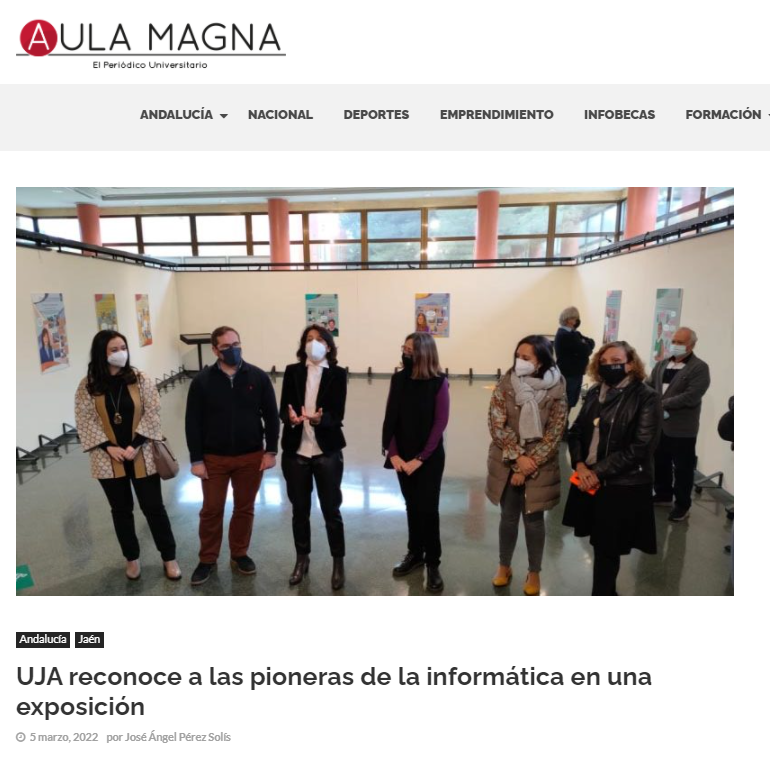
University of Jaén recognizes the pioneers of computer science in an exhibition
29 March, 2022
Until April 7, the exhibition ‘Pioneras informáticas: reconociendo las aportaciones de la mujer en la Ingeniería Informática’ can be visited at the University of Jaén in the Exhibition Hall of the Zabaleta building (D 1) of the Campus Las Lagunillas of the UJA.
The exhibition is coordinated by the professors of the Department of Computer Science of the University of Jaén Lina García Cabrera (DaSCI Researcher) and José Mª Serrano Chica, and the teacher of the IES Auringis Irene Pedrosa García, the exhibition arises as a result of the Call for Cultural Projects of the Vice-rectorate of Projection of Culture and Sport, and has been coordinated by Lina García Cabrera and José María Serrano Chica, and Irene Pedrosa García.
All information in AULA MAGNA, El Periódico Universitario (In Spanish)
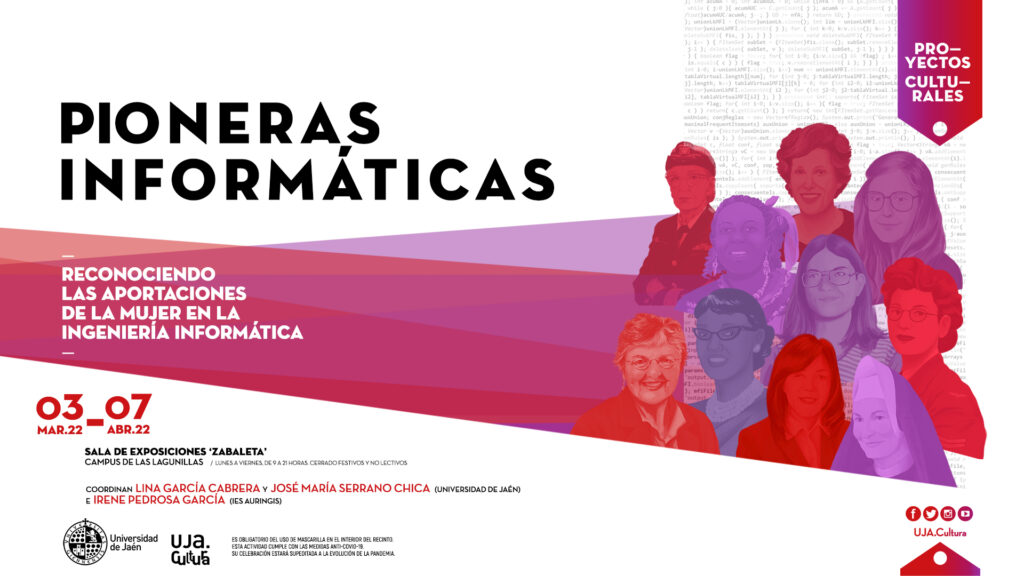

Granada touches the sky with AI (Artificial Intelligence)
8 March, 2022

The city of Granada is gaining momentum to host the National Artificial Intelligence (AI) Centre and Agency, which would turn the historic city into the most important technological and scientific reference point in Spain. Granada already has the Ifmif-Dones particle accelerator and a quantum supercomputer.
We analyse the relevance of this initiative and the immediate future of AI with Javier Martínez, head of the Google Cloud pre-sales team; José Luis Florez, director of Plaiground, the business unit of Minsait (Indra) specialising in AI, and Enrique Herrera Viezma, vice-rector for research and transfer at the University of Granada.
Enjoy the programe (In Spanish)
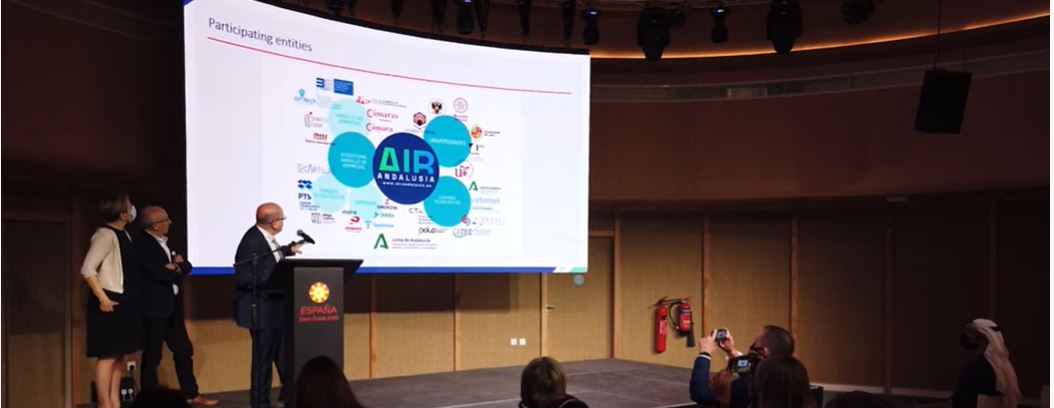
DaSCI is present at Dubai Expo
15 February, 2022
During the 14th, 15th and 16th of February, a delegation of representatives from different sectors of our city, including Enrique Herrera (Vice Chancellor and member of DaSCI) and Francisco Herrera (Director of the Institute) traveled to the Dubai Expo where they presented the programs and strategic projects of the UGR. Among others, AIRAndalusia and the DaSCI Institute.
The Vice Chancellor for Research and Transfer of the UGR, Enrique Herrera, has valued the visits and meetings developed as “very rewarding”, since they have dealt with relevant aspects such as “the regulation of artificial intelligence at international level, in which the UGR can make great contributions, especially in Dubai, where the full potential of this technology has not been implemented yet.
All information in CANAL UGR
Local Media (in spanish):
La Universidad de Granada presenta sus proyectos estratégicos en Dubái
Gastronomía, inteligencia artificial y turismo, las bazas de Granada en la Expo Dubái 2020

The importance of teaching programming
10 February, 2022
The University of Jaén brings computer science to schools through the ‘Hour of Code’ initiative.
“Programming is easy, fun and creative and has a very important future” says DaSCI researcher Lina García.
In the following video they encourage us to also be part of the Hour of Code initiative.
The following image shows how the Scientific Culture and Innovation Unit of the Vice-Rectorate for Communication and Institutional Projection and the Department of Computer Science of the University of Jaén are offering a one-hour introduction to Computer Science, designed to show that everyone can learn to program and thus understand the basic fundamentals of the discipline.
The activity in figures:
– Participating researchers: 1
– Participating students UJA: 12
– Number of code hours: 88
– Participating educational centres: 13
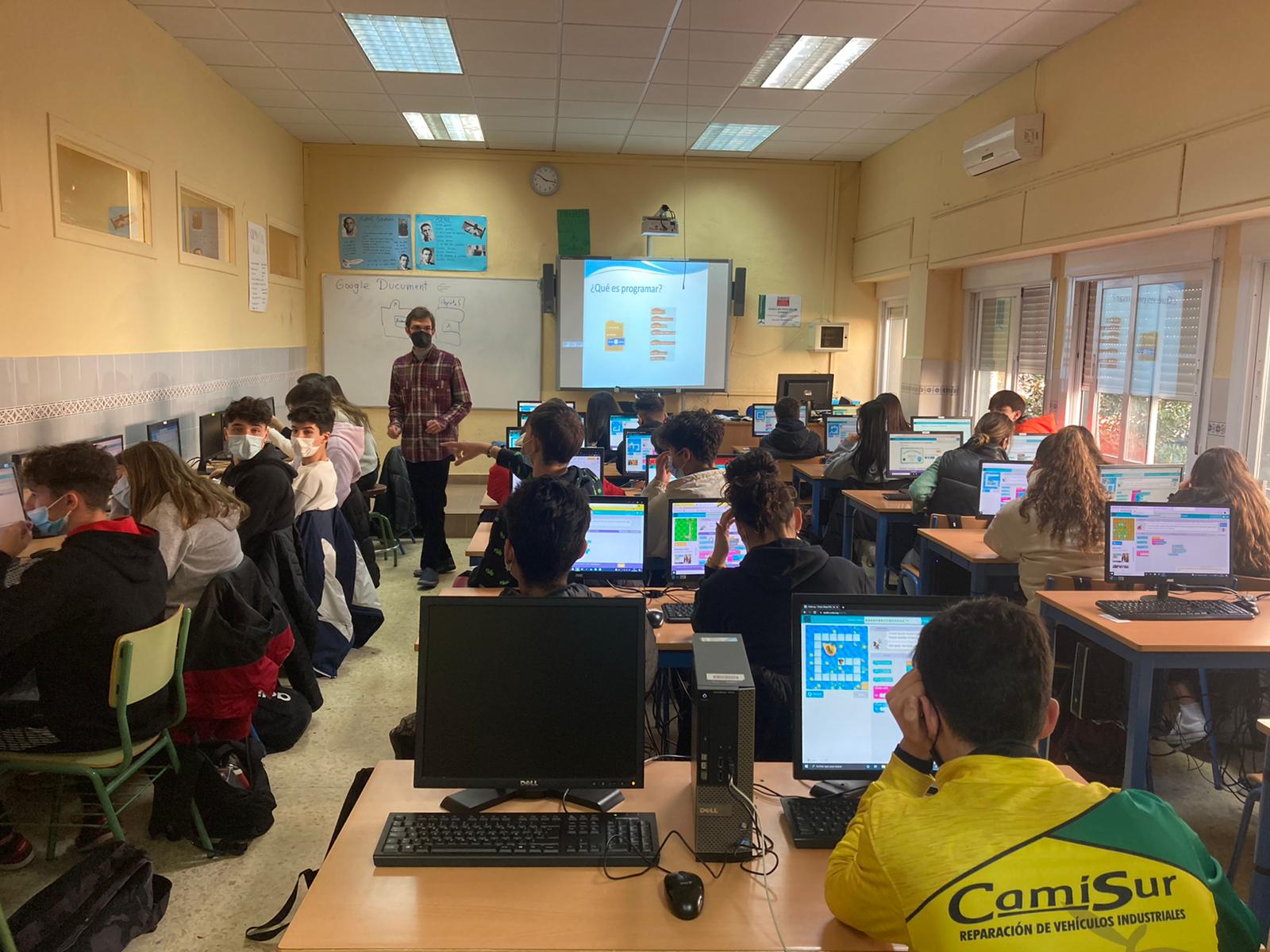

Francisco Herrera interviewed on Radio Nacional de España
17 January, 2022
#podcast #EL PLACER DE ADMIRAR
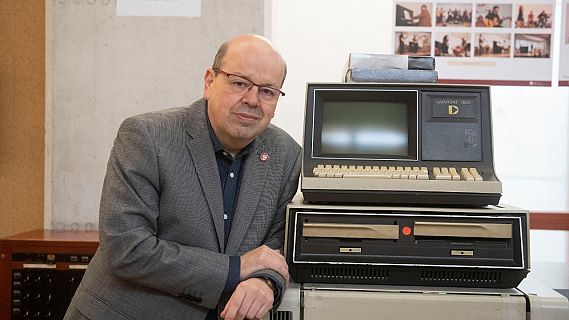
Paleontologist Juan Luis Arsuaga talks on Radio Nacional de España with Francisco Herrera, in a conversation in which he discusses how he sees the future of society in a highly technological world in which Artificial Intelligence (machines, robots, intelligent systems) plays a fundamental role. For example, repetitive tasks are likely to be done by machines.
Part I – January 8th https://www.rtve.es/play/audios/el-placer-de-admirar/francisco-herrera-trigueros-08-01-22/6251845/
Part II – January 15th https://www.rtve.es/play/audios/el-placer-de-admirar/francisco-herrera-trigueros-ii/6251858/
Francisco Herrera, director of the DaSCI Institute participates in the radio show “Hoy por Hoy” and highlights Granada’s plans to host the National Centre and the State Agency for the Supervision of Artificial Intelligence
13 January, 2022
Enrique Árbol has talked to Francisco Herrera, director of the DaSCI Institute and councillor of the Granada City Council about the news published these days in different media of the province about the intention of making Granada the next host of the National Centre and the State Agency for the supervision of Artificial Intelligence.
You can listen to the hole interwiew, at the following link (in Spanish)
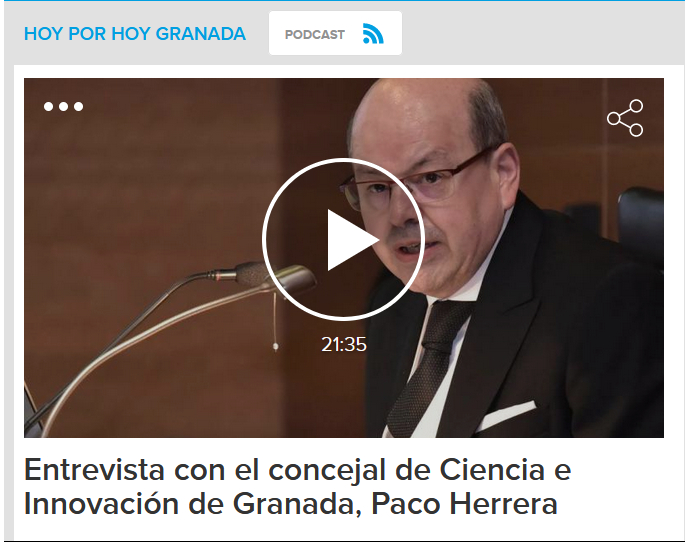
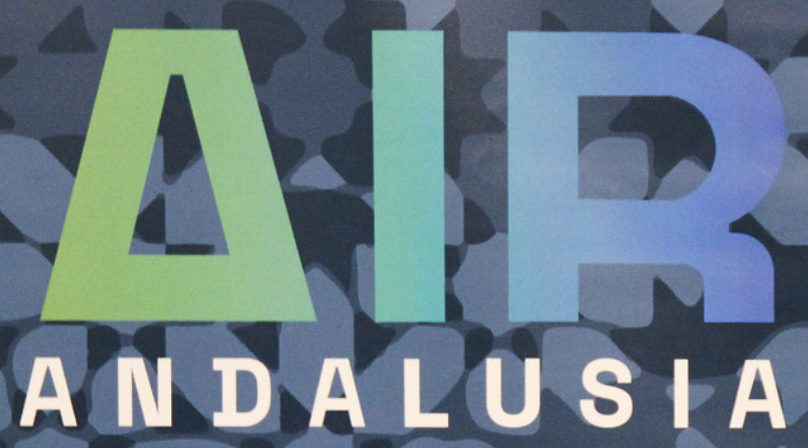
AIR-Andalusia is presented at the University of Granada as a centre for transfer and training in artificial intelligence and robotics
10 December, 2021
News #Press Release
The rector of the University of Granada, Pilar Aranda; the Minister of Economic Transformation, Industry, Knowledge and Universities of the Junta de Andalucía, Rogelio Velasco; the mayor of Granada, Francisco Cuenca, and the president of the Spanish Confederation of Small and Medium Enterprises (CEPYME), Gerardo Cuerva, have presented this morning the Andalusian Digital Innovation Center AIR-Andalusia, together with representatives of all the entities that make up the consortium.
AIR-Andalusia is a center specialized in artificial intelligence and applied robotics. This organization was created as a support tool for small and medium-sized enterprises (SMEs) and public administrations to improve their efficiency and competitiveness, providing them with access to different digitization services focused on the optimization of business/production processes, products or services using digital technologies.
- Its objective is to be a support tool for SMEs and public administrations in the field of technology and innovation.
- This consortium is constituted as a representation of the entire Andalusian ecosystem: from universities or research centers, to business associations, chambers of commerce, parks, European Business and Innovation Centers (CEEIs/BICS), companies and technology clusters.
AIR-Andalusia official website: https://www.airandalusia.es/
Photo gallery of the presentation: https://www.flickr.com/photos/canalugr/sets/72157720226324531/
Video of the presentation
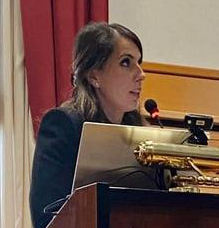
The number of professors of the DaSCI Institute grows with the incorporation of Macarena Espinilla as a Professor at UJA
25 November, 2021
Thursday 25th of November of 2021, Macarena Espinilla Estevez, DaSCI researcher, passed the exams for the access to Professors at the University of Jaén. She defended this position with a research project “Recognition of activities in intelligent environments” and a teaching project “Computer architecture in the Degree of Computer Engineering“.
The main strength of our institute lies in our researchers and this recognition of Macarena’s career is a source of joy for all of us, our most sincere congratulations!
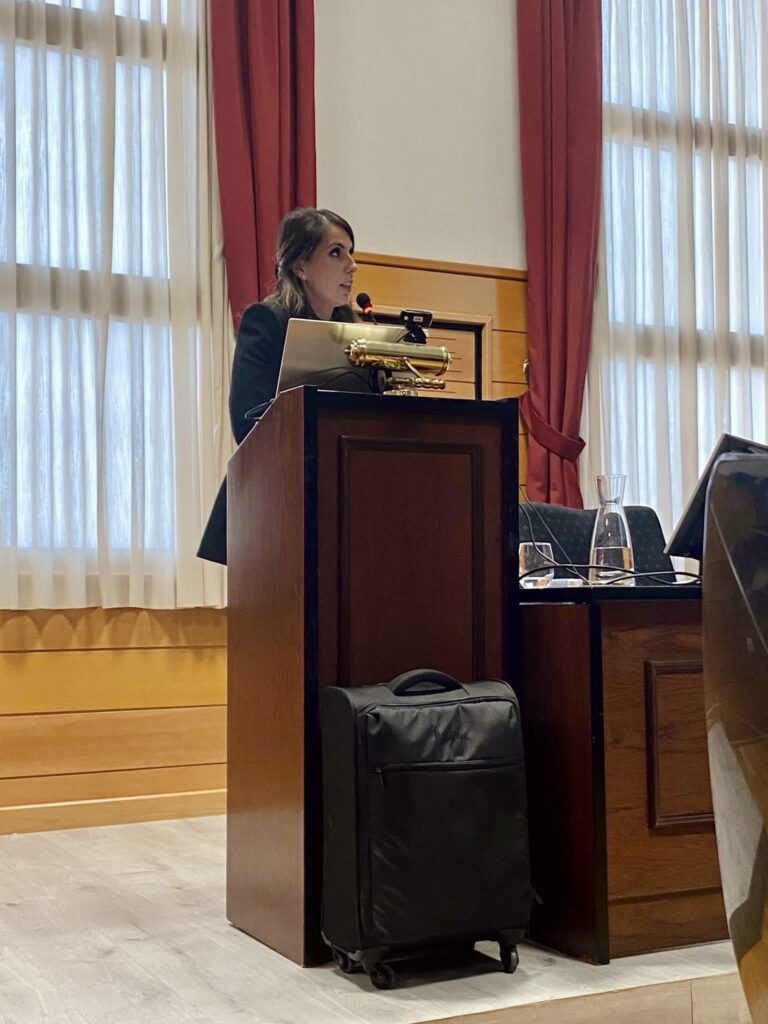
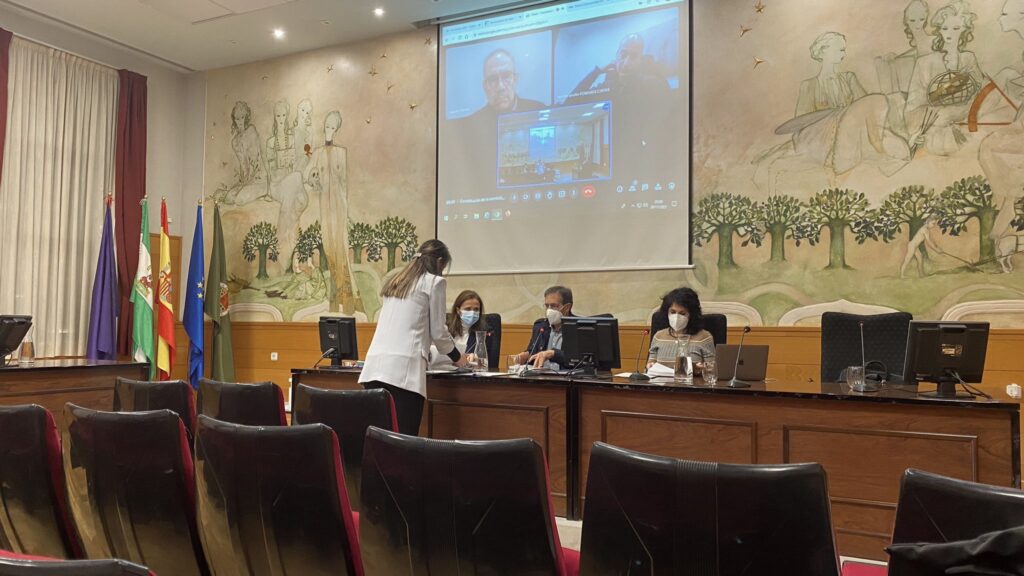
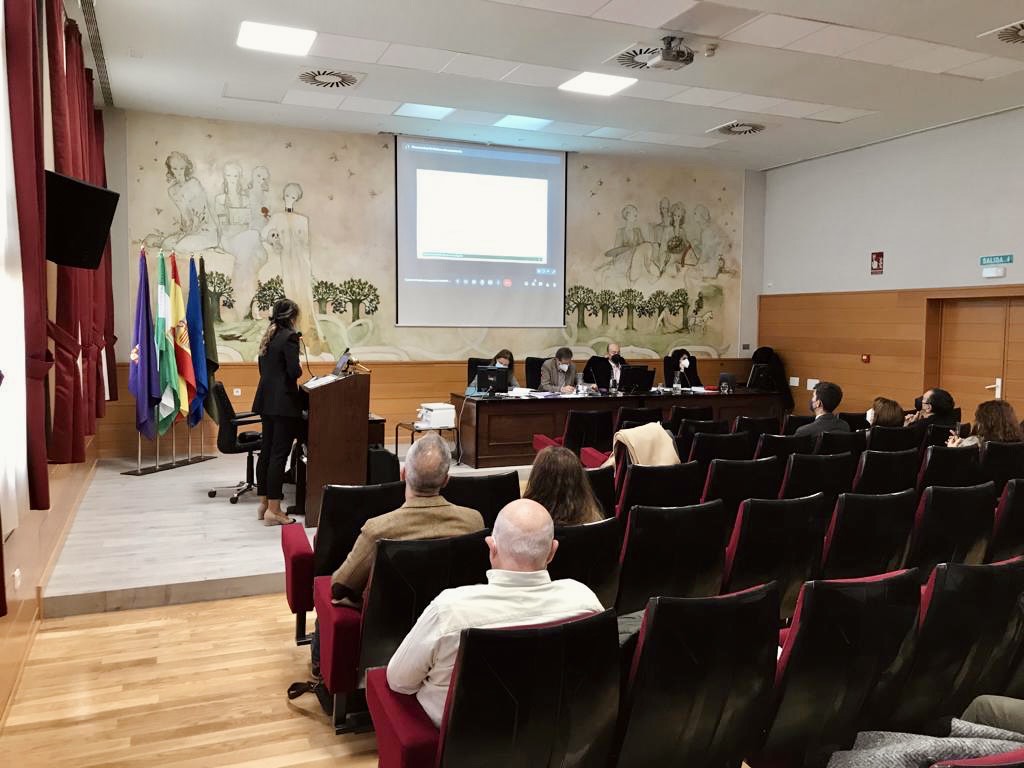
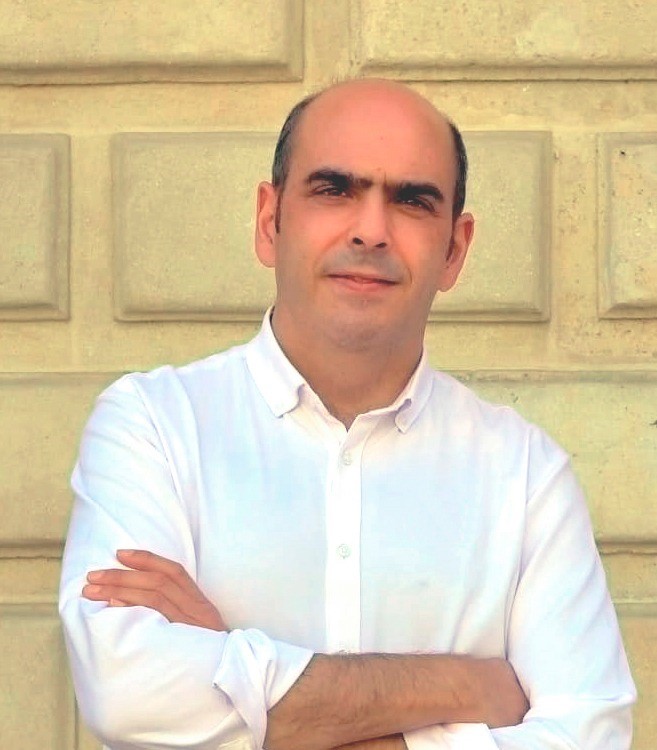
Javier Melero participates in the Webinar: Artificial Intelligence and its application in companies. AIRANDALUSIA the Andalusian AI digital hub
25 November, 2021
#Webinar Thursday
AIRANDALUSIA is the Andalusian eDIH in which DaSCI collaborates so that SMEs and freelancers can find services that facilitate innovation. An innovation based on Artificial Intelligence, Robotics and associated Disruptive Digital Technologies, innovating and transferring technology to society and industry.
Artificial Intelligence has established itself as one of the technologies with the greatest transformative power in society and business. Therefore, it is essential to know the latest trends around it and the fundamental role played by the European Union to promote it as a differential element in the digital transformation of companies.
That is why Javier Melero, Deputy Director of Strategic Area of DaSCI, presented the following talk:
HOW SMES CAN TAKE ADVANTAGE OF ARTIFICIAL INTELLIGENCE / EDIH AIRANDALUSIA.
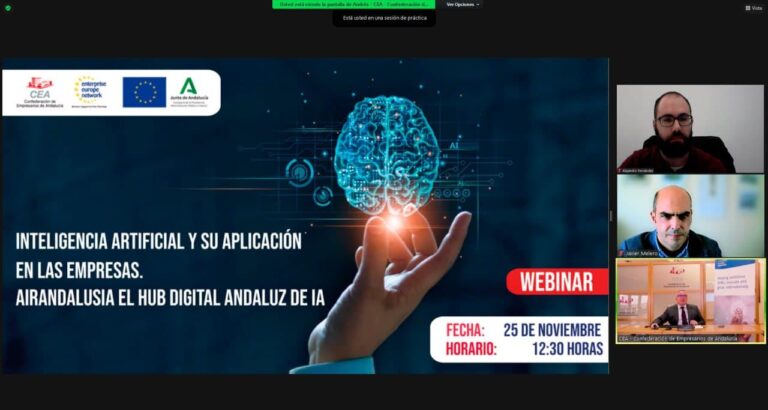
More information: https://www.cea.es/webinar-inteligencia-artificial-y-su-aplicacion-en-las-empresas-airandalusia-el-hub-digital-andaluz-de-ia/
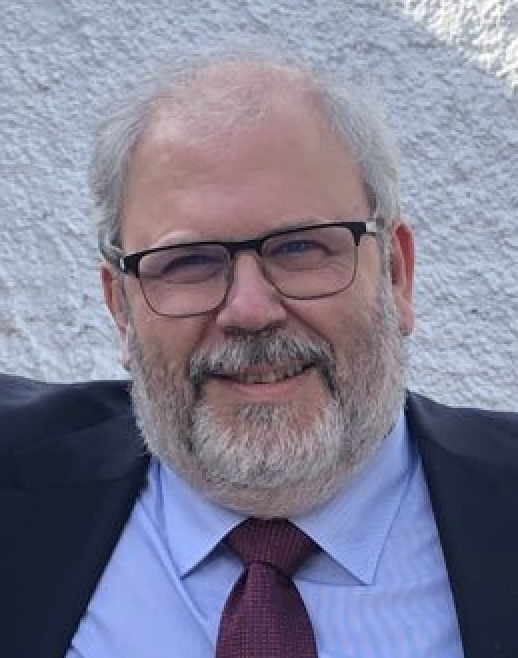
Significant increase of UCO researchers in the well-known list of the world’s most influential researchers
10 November, 2021
#InTheMedia #UCO Wednesday, November 10, 2021
A post in the Diario de Córdoba comments on the results of the Stanford University ranking associated with the impact of research in various areas, based on metrics of impact of researchers’ publications worldwide. This list identifies the top of the world’s research in their respective areas, and is prepared annually.
In this particular case, DaSCI’s Deputy Director, Sebastian Ventura appears in the ranking prepared by Professors Baas, Boyack and Ioannidis, from Elsevier B.V., SciTechStrategies Inc. and Stanford University, respectively.
See which other DaSCI researchers are in world rankings.
Source: Diario de Córdoba
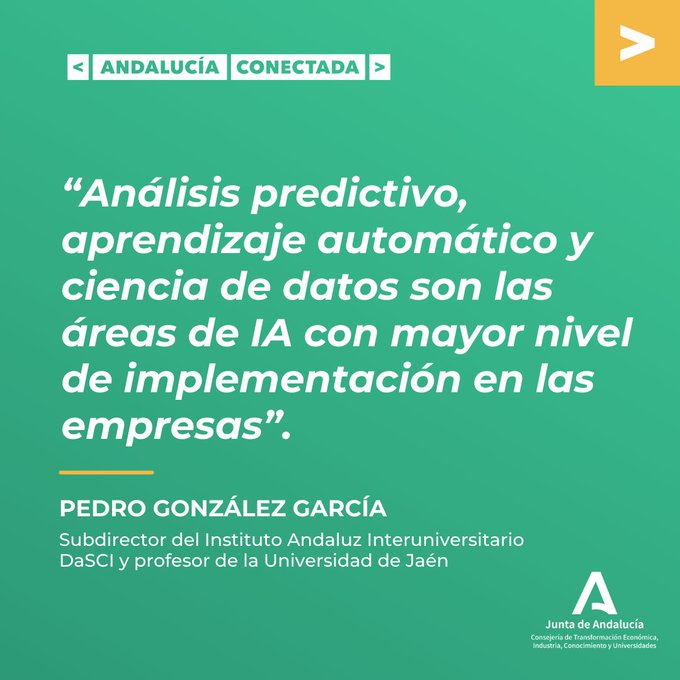
Andalucía Conectada now knows the capabilities of Andalusian research centers and groups with Pedro González García
19 October, 2021
#networking
The Andalucía Conectada platform offers a virtual training space associated with emerging technologies. Thanks to its catalog, you can locate the best training offer according to the level or competence that the content covers. Focused on the ICT sector, we know from the Ministry of Economic Transformation, that Andalusian companies are betting on AI as a differential value.
For this reason, the webinnar held on October 19 at 10 am was attended by the deputy director of DaSCI, Pedro Garcia, who had the opportunity to talk about the level of development of Artificial Intelligence in Andalusia.
In his words, predictive analytics, machine learning and data science are the areas of Artificial Intelligence with the highest level of implementation in companies.
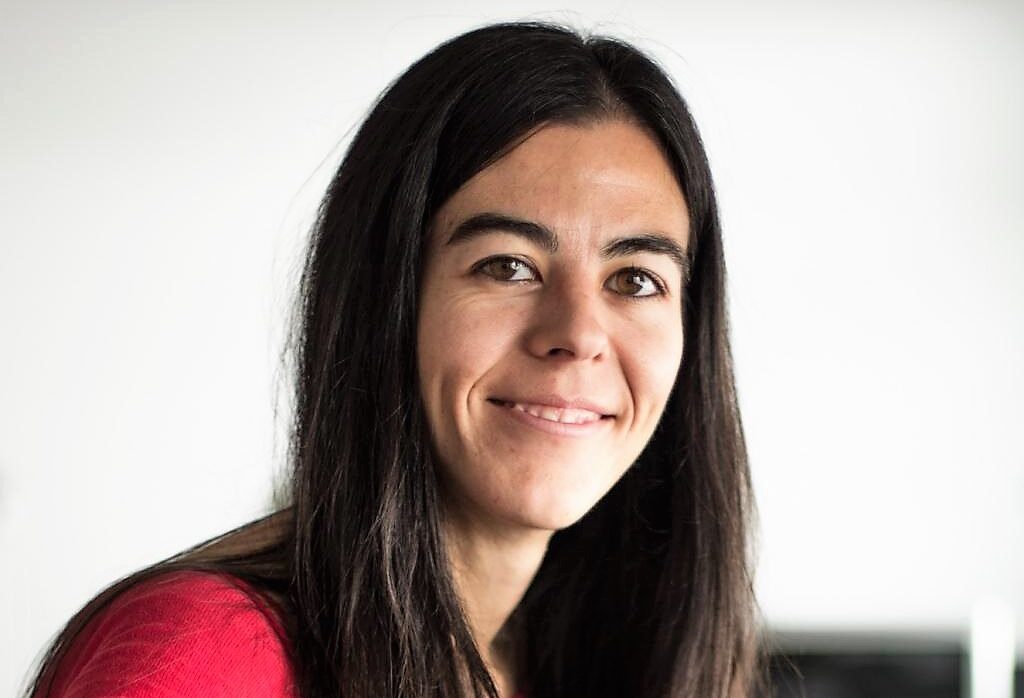
The City Council of Guarroman is inspired by the efforts of our researcher Rosa María Rodríguez Domínguez to create an extraordinary award for high school students in the province of Jaén
7 October, 2021
#recognition
This city council sees in the word Effort a more than necessary value in the educational world. Therefore, it has created the Rosa Rodríguez Extraordinary Award for Compulsory Education at provincial level to the best academic record of the course. In this way it wants to recognize the most diligent secondary school student in the province during the year.
The award, whose rules were approved in the plenary last September 2021, bears the name of the researcher from Guarromanense of the University of Jaén, Rosa María Rodríguez Domínguez, an example of personal and academic improvement. “It represents tenacity, perseverance and dedication to a dream. It is our small tribute to a great woman and neighbor,” says the mayor, Alberto Rubio.
More information: El Observador – At the center of the news.
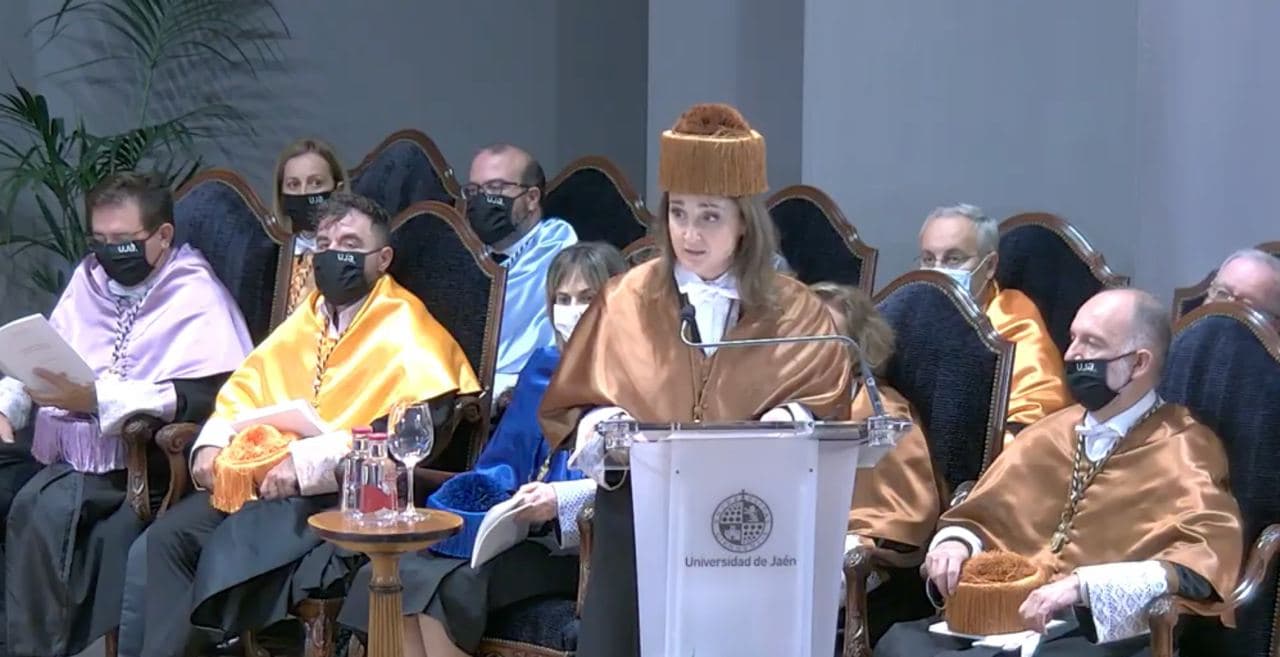
Inaugural lecture of the Academic Year 21/22 at the University of Jaén given by Mª José del Jesus Díaz
30 September, 2021
#Conference
The professor of Computer Science and Artificial Intelligence of the UJA, and DaSCI researcher M.ª José del Jesus Díaz, gave in her institution the master lecture entitled ‘Artificial Intelligence and data for society’. The event could be followed live on YouTube.
This lecture presented a reflection on the benefits that Artificial Intelligence, through machine learning and the ethical use of data, brings to society. To do this, it briefly reviewed its history and milestones, analyzed some of its applications, especially in the field of health. It also identified the challenges to be addressed to continue advancing in the development of a reliable and human-centered artificial intelligence.
More information about the event and its content, in the Digital Journal of the UJA: Artificial Intelligence and data for society.
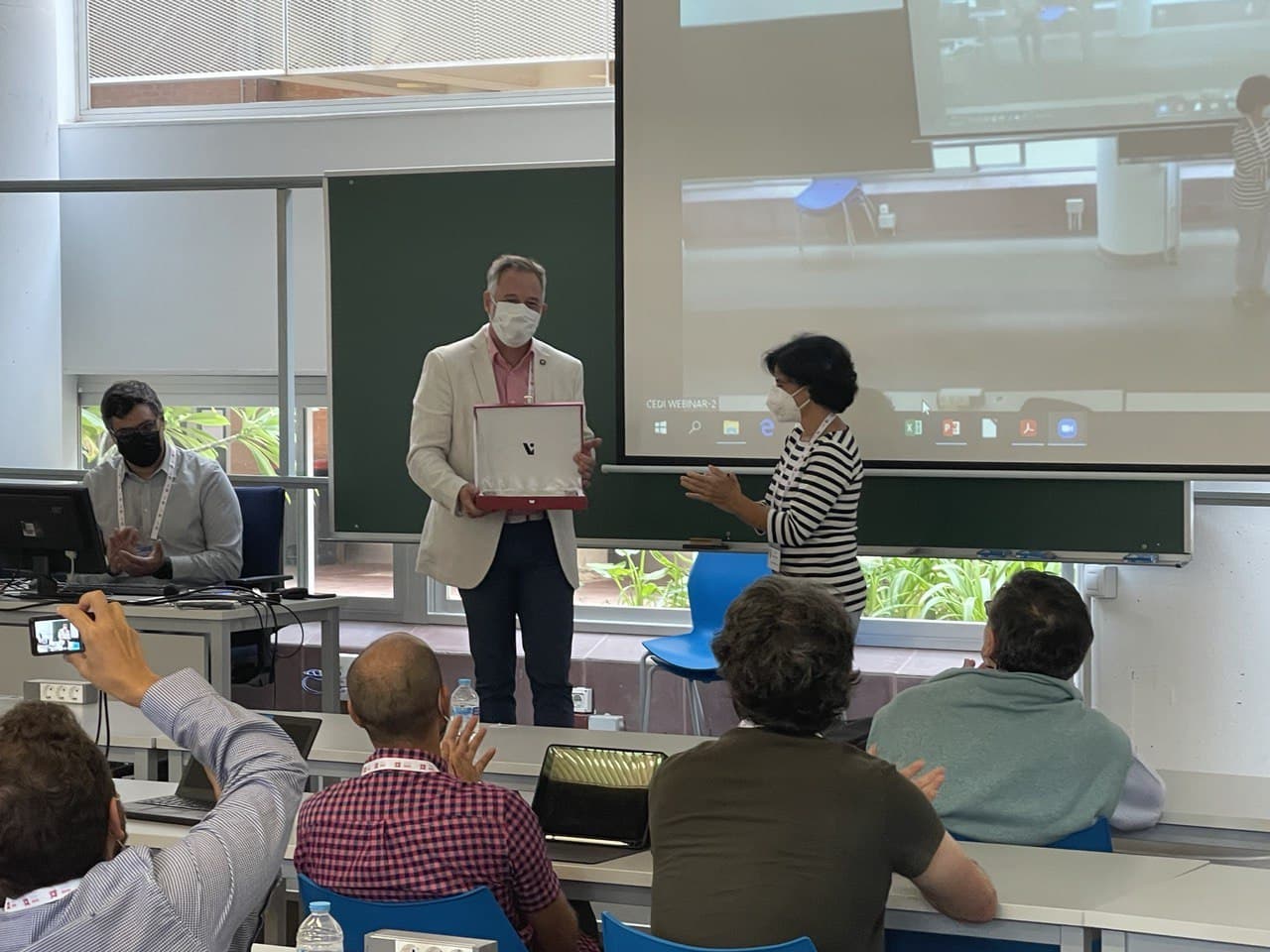
Prof. Oscar Cordón was awarded by the Spanish Association of AI (AEPIA) for his activities and his promotion of AI
28 September, 2021
DaSCI Researchers participate in the XIX Conference of the Spanish Association of Artificial Intelligence (CAEPIA).This year CAEPIA is being held in the context of the 6th Spanish Congress on Computer Science (CEDI 2020), which includes many events and activities related to Computer Science, with greater visibility and social impact.
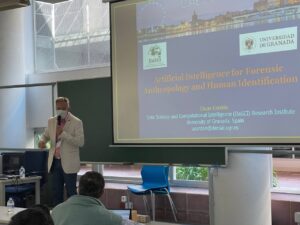
The Conference of the Spanish Association of Artificial Intelligence (CAEPIA) is a biennial forum open to researchers from all over the world to present and discuss their latest scientific and technological advances in Artificial Intelligence (A.I.).
On this occasion, one of the two Plenary Lectures at CAEPIA 2021 was given by Óscar Cordón, (researcher of the DaSCI institute) titled “Artificial Intelligence for Forensic Anthropology and Human Identification”. Prof. Oscar Cordón was also awarded by the Spanish Association of A.I. (AEPIA) for his activities and his promotion of A.I.
More information (In Spanish)
La Guinda, a TV program commenting on the European Researchers’ Night 2021
27 September, 2021
#TV #Granada #Science
Participating in this debate are three leading figures. The director of the DaSCI institute, Francisco Herrera, the director of the Fundación Descubre, Teresa Cruz and the director of the Participation and Social Innovation unit, MediaLab, of the Vice-rectorate of Institutional Policy and Planning of the University of Granada, Esteban Romero.
You can watch the full content of the program (50 minutes)
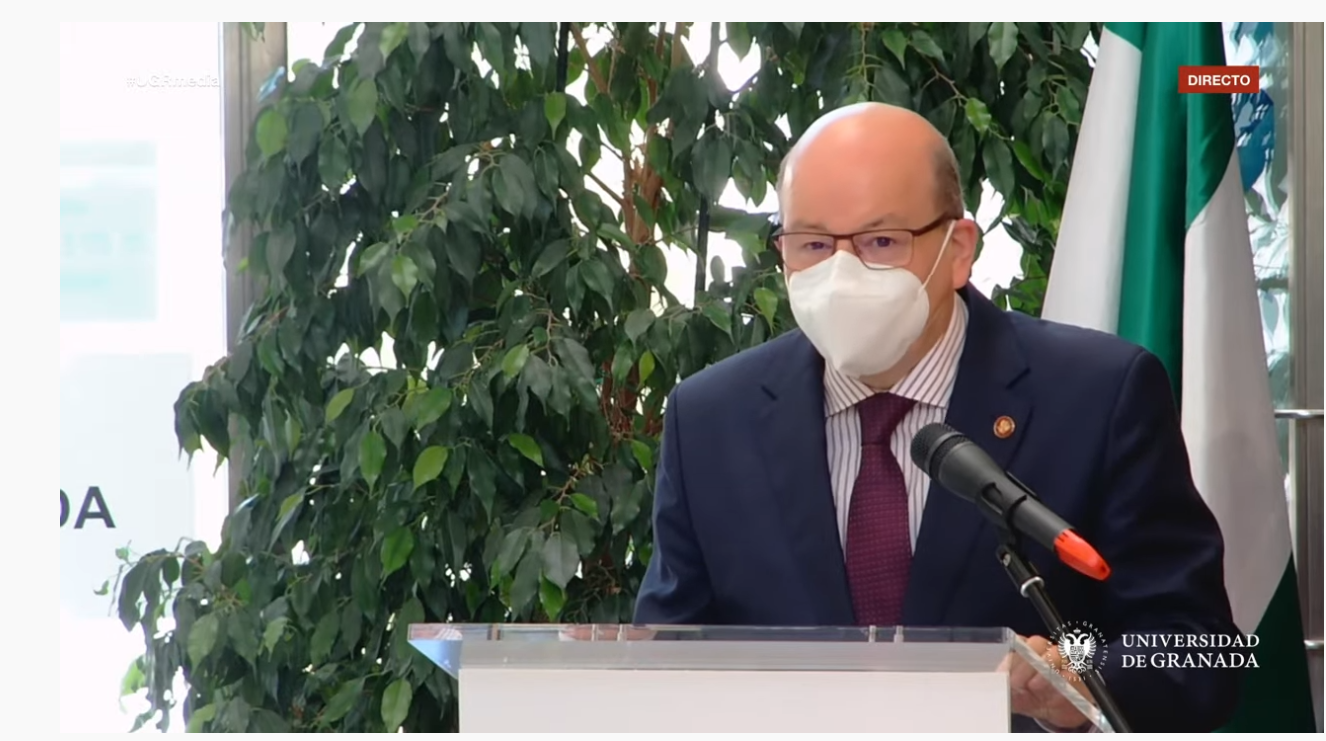
With the creation of AI Lab Granada, our city is confirmed as one of the major national and international benchmarks in Artificial Intelligence.
19 July, 2021
The creation of “AI Lab Granada” is the result of the efforts of the University of Granada, Indra and Google Cloud to make Granada and the PTS Foundation – Parque Tecnológico de la Salud a leading space in research and knowledge transfer.
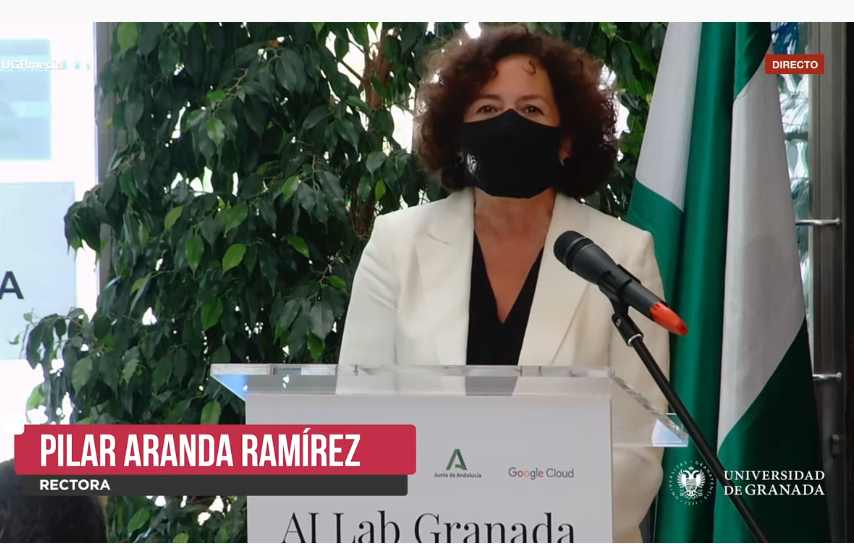
The agreement signed by Pilar Aranda, rector of the University of Granada (UGR), Isaac Hernández, Google Cloud’s country manager, and Cristina Ruiz, Indra’s CEO, marks the beginning of this great project. This public-private collaboration, which in the words of Rogelio Velasco, Minister of Economic Transformation of the Regional Government, is essential in order to have the necessary resources for digitalisation to reach everyone.
The Centre will have more than 100 PhDs in AI and 165 consultants, developers and researchers and an ecosystem of startups and entrepreneurs. It will develop artificial intelligence solutions that will increase the efficiency and sustainability of businesses, public administrations and society. Promoting an inclusive, sustainable and focused AI to improve people’s quality of life.
You can find all the information by clicking on the following links (in spanish)
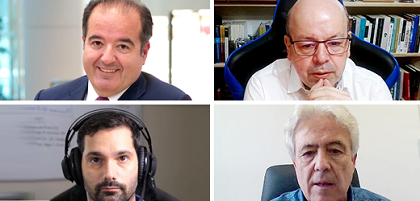
Artificial Intelligence will be key to the future of preventive and predictive medicine
6 July, 2021
At the proposal of the Pfizer Foundation in its latest meeting with the evolution that does not cease, a session was organised to analyse the transition “from Big Data to Medicine on Demand”.
In this session, moderated by Sergio Rodríguez, President of the Pfizer Foundation, different experts, including our director Francisco Herrera, analysed from different perspectives how AI will be an essential tool for Preventive and Predictive Medicine in the next 10 years.
You can read the full article at the following LINK
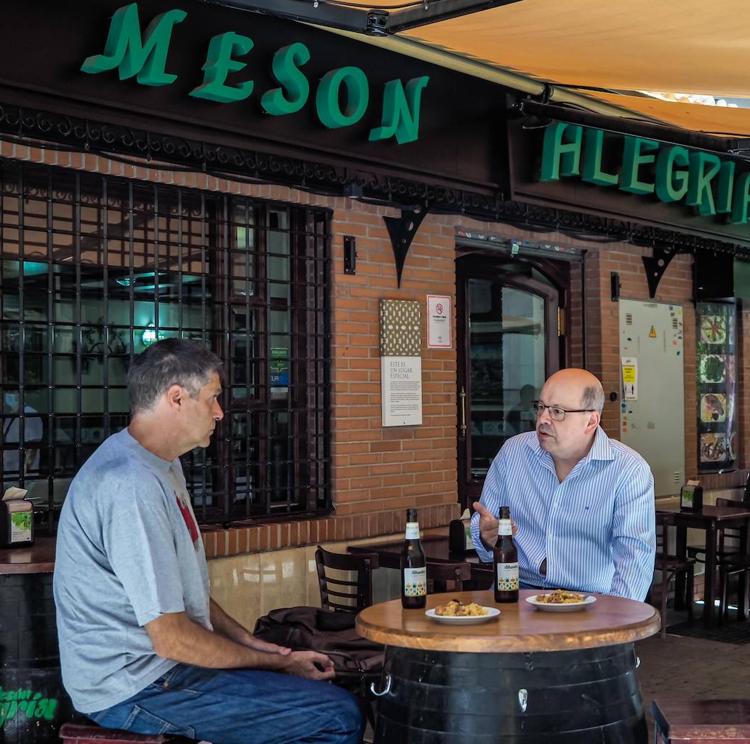
Artificial Intelligence and Gastronomy, a good pairing
2 July, 2021
On Friday the 2nd of July, the IDEAL newspaper dedicated its Gourmet space to talk to Francisco Herrera, our director, about digitalisation in the hotel and catering industry and what Artificial Intelligence can do for gastronomy and restaurants. A fundamental sector for the economy of our region.
All the information in the IDEAL newspaper (In Spanish)
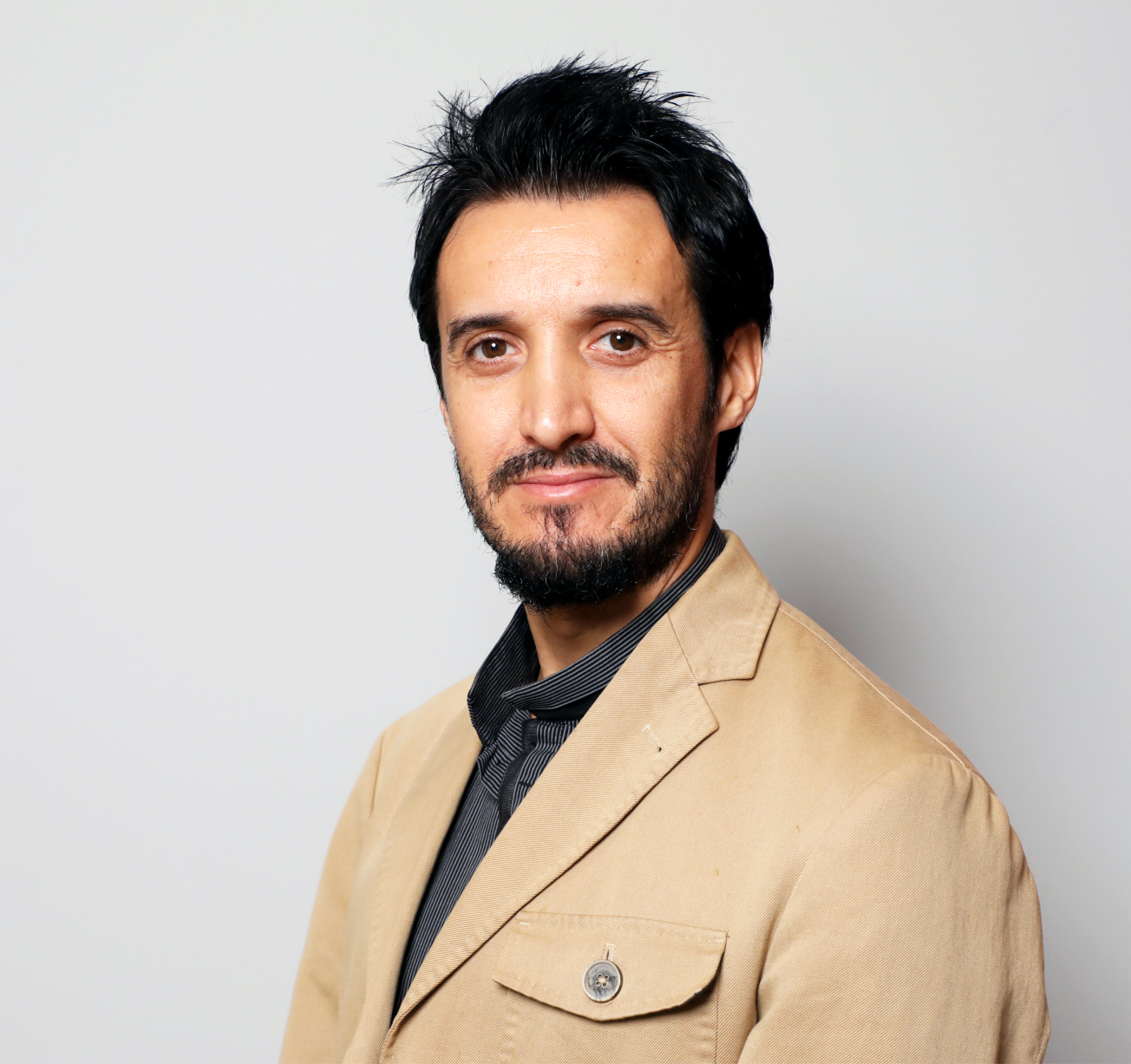
Juanma Górriz, Researcher at DaSCI Institute, is recognised with the “Hojjat Adeli Award for Outstanding Contribution in Neural Systems”
30 June, 2021
The Hojjat Adeli Award for Outstanding Contribution in Neural Systems, established by World Scientific in 2010, is awarded annually to the most innovative article published in the previous volume/year of the International Journal of Neural Systems.
The award, which is endowed with a plaque and a cash prize of $5000 this year, goes to the following publication:
M. Leming, J.M. Gorriz, and J. Suckling, Ensemble Deep Learning on Large, Mixed-Site fMRI Datasets in Autism and Other Tasks, International Journal of Neural Systems, 30:7, 2020, 2050012 (16 pages).
The author is Juanma Górriz, a researcher at the DaSCI Institute with an extensive research career in the field of biomedical signal processing and the diagnosis of neurological disorders such as Alzheimer’s and Parkinson’s disease. In 2015 his work was recognised with the medal of the Royal Academy of Engineering in the category of Young Researcher and since the birth of the Institute in 2018 his research group Signal Processing and Biomedicak Application is part of it.
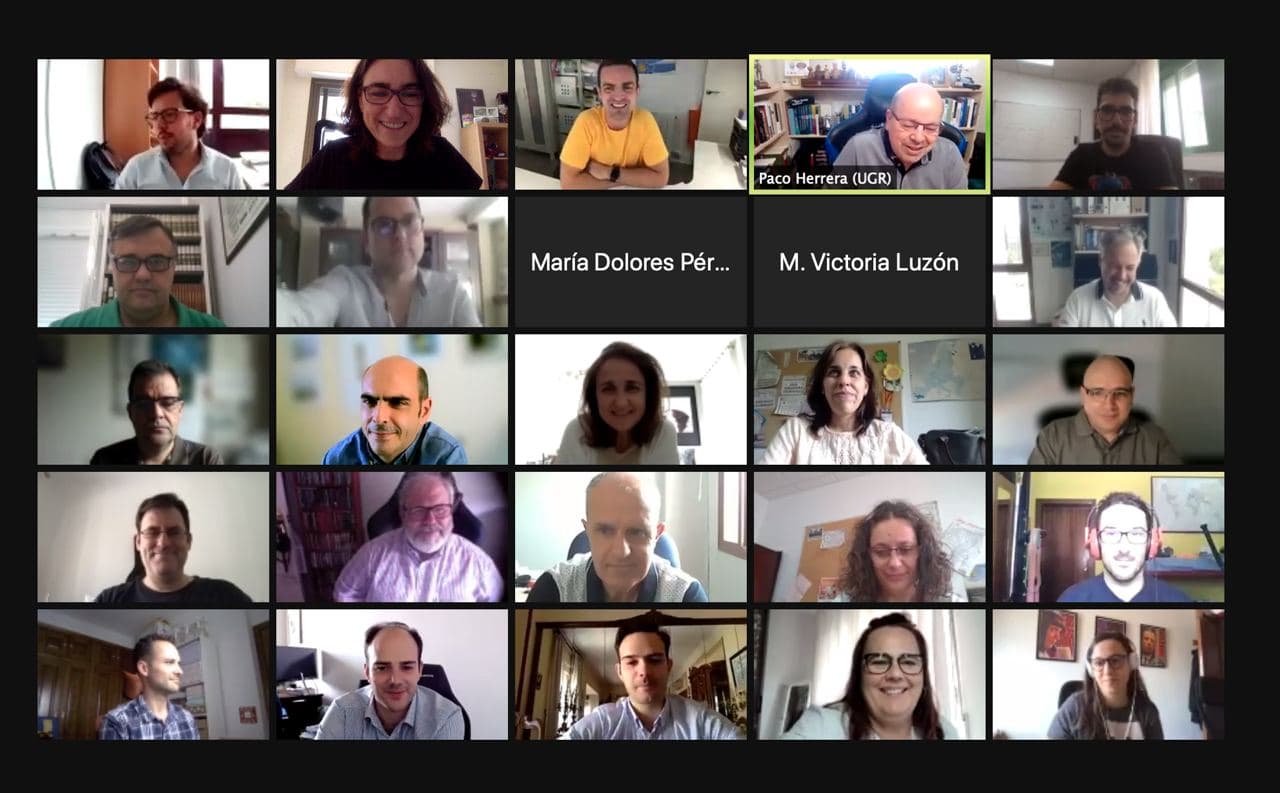
The Institute celebrates its first “DaSCI Day”
18 June, 2021
Last Friday, 18 June 2021 and coinciding with the Institute’s Council Celebration, a large number of DaSCI researchers gathered in a virtual meeting to celebrate the DaSCI Day.
This year we have been working intensively on improving communication and dissemination aspects in the Institute. In this process we have been advised by the “Fundación Descubre” and one of their proposals was to find a space and a time for all members of the Institute to celebrate and take the pulse of our activities. Over the last few years, the number of researchers and students at DaSCI has not stopped growing and there are now more than 140 of us who have never had the opportunity to meet together before.
This year, since we were not all vaccinated yet, it didn’t seem sensible to have a physical meeting, so we had a virtual meeting in which we shared an “aperitif”. We had a very pleasant time with a lot of laughs, a contest and even a raffle with two brand new winners.
We are determined that this will be the first of many physical meetings that will take place every June 14th, the date on which the Institute is officially born and on which we hope to continue celebrating the growth of our project.

SintonIA, a podcast for the Andalusian Research Institute in Data Science and Computational Intelligence (DaSCI)
14 May, 2021
The podcast sheds light into the technologies used in the processing and analysis of information. Hosted by Rocío Romero and Francisco Jesús Martínez, both researchers at the DaSCI institute, the podcast deals with the latest advances in these technologies and their future prospects in simple language and for all audiences. The podcast is a biweekly series and each episode deals with a different area of the field, including short news items, radio fiction and interviews with experts.
SintonIA – Artificial Intelligence (AI) on air. This is the title of the new podcast of the Andalusian Research Institute in Data Science and Computational Intelligence (DaSCI), launched on 15 March, 2021. The programme is part of the institute’s communication and dissemination strategy and, according to its authors, aims to bring to the general public what lies behind the technologies that are shaping the present.
Hosted by computer scientists Rocío Romero and Francisco Jesús Martínez, SintonIA talks about statistics, neural networks, data science, practical applications and the latest advances at the institute in a friendly and light-hearted way. Each episode includes references to short news items, an in-depth topic and interviews with experts in the field.
The first episode was dedicated to women in computer science, and featured several guests at different stages: a female undergraduate student, a PhD student and an engineer from a large IT company.
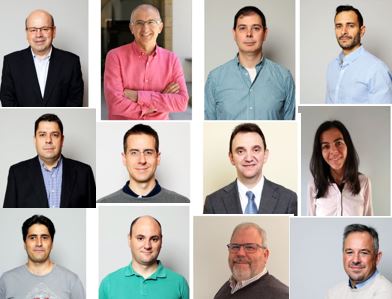
12 DaSCI researchers have been included in the Ranking of scientists who are among the top 2% of the world’s leading scientists
18 March, 2021
The “World Scientist: World’s Top 2% Scientists” is a list created by a group of researchers coordinated from Stanford University, which has been recently published in the prestigious journal Plos Biology, and in which the world’s elite in the world of scientific research is included.
Among the authors recognized in the area of Artificial Intelligence and Image Processing are Francisco Herrera, Director of the Institute (among the 300 best in the world in this area) and other members of the Institute such as Enrique Herrera-Viedma, Luis Martínez, Salva García, Cristóbal Romero, Rosa M. Rodríguez, Óscar Cordón, Sebastián Ventura, Francisco J. Cabrerizo, Jesús Alcalá, Julián Luengo and Javier Ramírez.
The research was carried out by a group of experts formed by John Loannidis (Stanford University), Jeroen Baas (Elsevier B.V.), Kevin W. Boyack (SciTech Strategies), and Richard Klavans (SciTech Strategies).
From Scopus data, they have created a database that collects more than 100,000 scientists with standardized information on their citations, the h-index (an index to measure an individual’s scientific research output), the co-authorship-adjusted hm-index, citations of articles in different authorship positions, and a composite indicator (with metrics with and without self-citations).
The database collects 22 scientific fields and 176 subfields, in addition to allowing to know the results of researchers throughout their career or in the year 2019.
For us, this list represents the enhancement of the work done every day by DaSCI researchers and we are happy to have 12 of the greatest among “ours”.
Artificial Intelligence in Andalusia by Francisco Herrera and Enrique Herrera-Viedma
4 March, 2021
The program Conciencia of CanalSur has dedicated its space this week to Artificial Intelligence and has done so with two members of DaSCI who are world leaders in this area: Francisco Herrera (director of our Institute) and Enrique Herrera-Viedma (Vice-rector of Research and Transfer of the UGR)
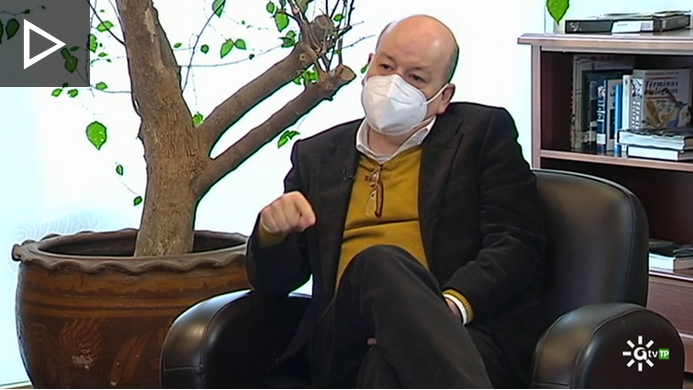
In Spanish
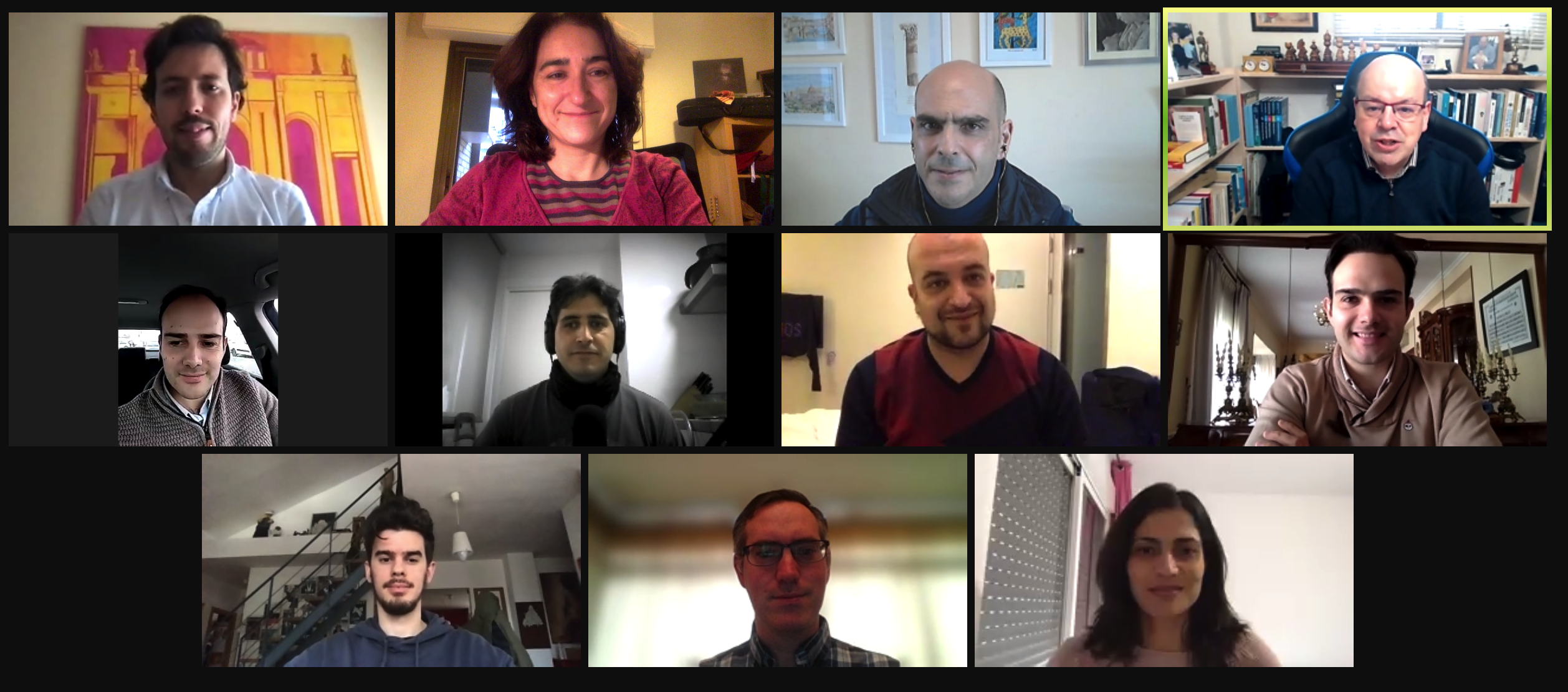
Study examines Artificial Intelligence as a means to achieve the Sustainable Development Goals
9 February, 2021
Ferrovial has partnered with Spain’s Royal Academy of Engineering (RAI) and the University of Granada (UGR), through the DaSCI Research Institute, to examine the 17 Sustainable Development Goals (SDGs) with a view to understanding how engineering and the technology solutions strongly anchored in Artificial Intelligence (AI) can help attain the goals.
The UN established the 17 Sustainable Development Goals (SDGs) to protect the planet and ensure prosperity for all. The goals signal a paradigm shift in the way companies and governments design new business models and public policies based on sustainability. Governments, the private sector and civil society all have an important role to play in this regard.
The project, entitled “Engineering as a Path to the SDGs: Artificial Intelligence and Disruptive Digital Technologies” was launched in March 2020 and focused on studying artificial intelligence and digital technologies and their application to the 17 goals of the 2030 Agenda. The result is a 465-page book, with original illustrations by Pablo García-Moral, written by a team of 16 people coordinated by Rosana Montes (UGR), Francisco Herrera (UGR and RAI), Javier Pérez de Vargas (RAI) and Rosario Marchena (Ferrovial).
The book, entitled “Inteligencia Artificial y Tecnologías Digitales para los ODS” (Artificial Intelligence and Digital Technologies for the SDGs), by Rosana Montes and co-authors, published by Real Academia de Ingeniería, is organized into three parts: an introduction to artificial intelligence and digital technologies, an analysis of their application in achieving the SDGs, and a set of recommendations on actions that may lead to the execution of projects and contribute to the attainment of the associated targets. In this connection, specialist scientific literature was reviewed, including more than a thousand bibliographic references on the 169 targets that are proposed in order to achieve the SDGs.
The book concludes with a brief discussion revolving around five key lessons learned, which are outlined in the graphic below:
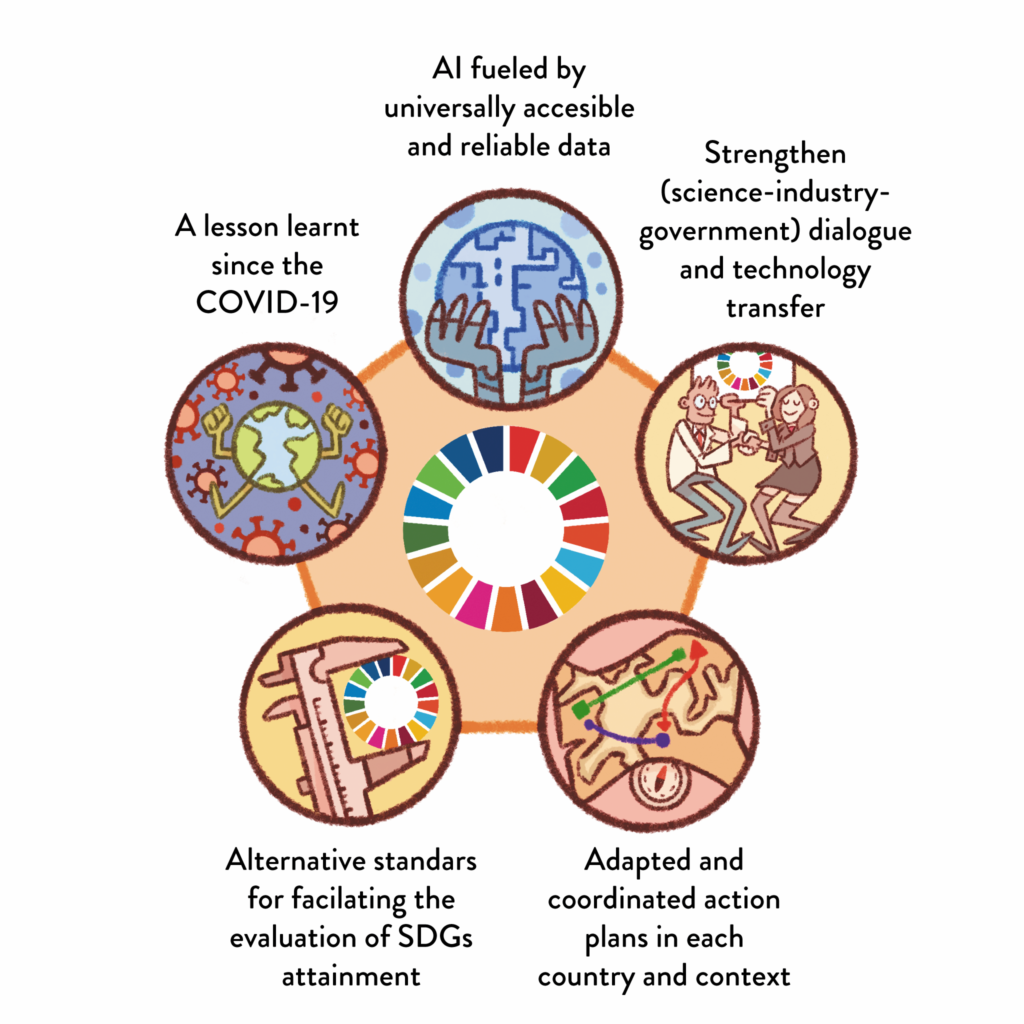
The study can be consulted and downloaded through the following link:
http://www.raing.es/es/publicaciones/libros/inteligencia-artificial-y-tecnolog-digitales-para-los-ods
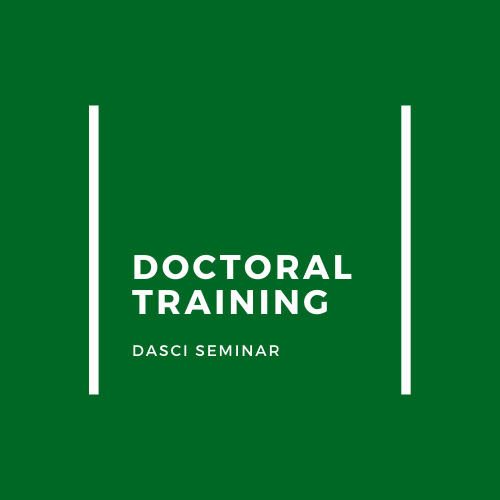
HINTS FOR YOUR RESEARCH CAREER
15 September, 2020
In September we are launching a cycle of seminars especially designed for those PhD students who are just starting out their research career. This series of seminars will take place every Monday at 16.30 and will last approximately 1 hour. The first speaker will be Francisco Herrera, director of the Institute. His first three seminars will be focused on:
- What is a doctoral thesis?
- Research and Creativity
- Communicating the Research
If you are interested in participating in these events, please contact Nuria Rodríguez Barroso who will provide access details.

The Government of Mexico invites Oscar Cordón, professor at the University of Granada, to give a talk on artificial intelligence in forensic science.
1 August, 2020
Professor Oscar Cordón, member of the Andalusian Research Institute in Data Science and Computational Intelligence, has made a dissertation at the request of the Mexican Government’s Directorate-General for Public Policy on Human Rights.
The online talk, entitled ‘Artificial intelligence applied to forensic science’, was given as part of the seminar ‘Forensic science from a human rights perspective’.
More info in IDEAL de Granada (In Spanish)
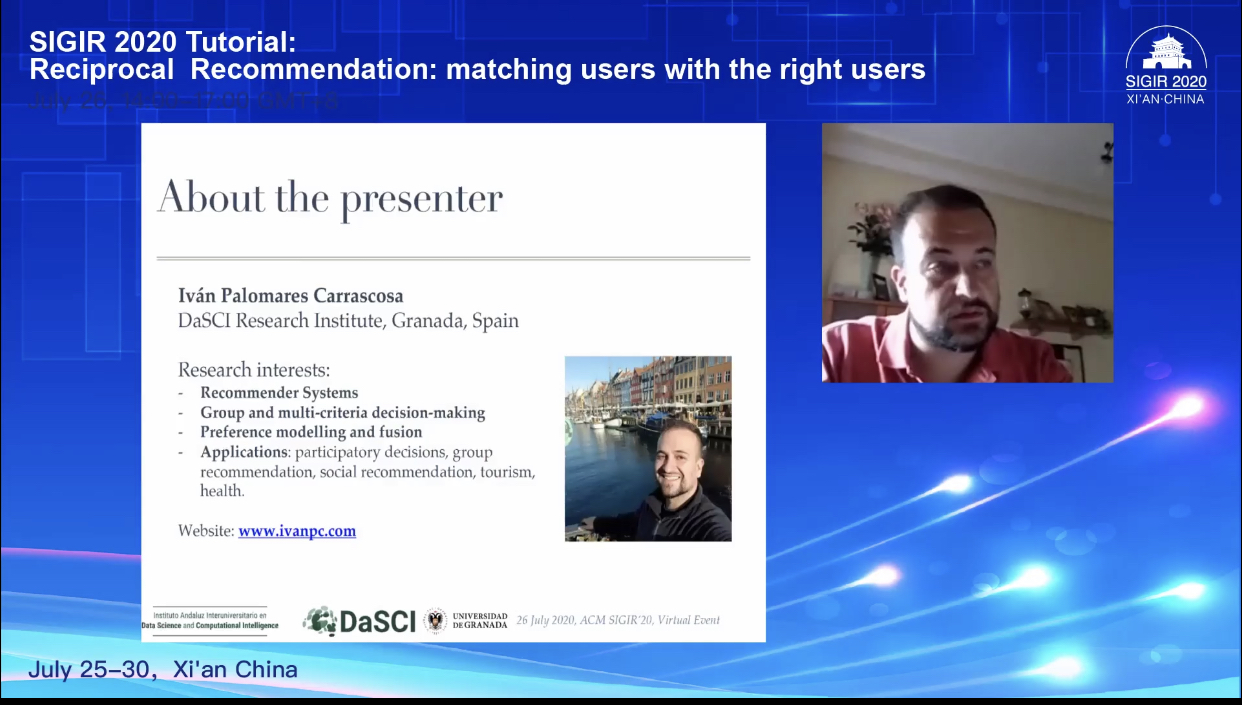
New international contribution by one of our researchers.
28 July, 2020
Ivan Palomares presented a tutorial in the SIGIR 2020 ACM Congress on Information Retrieval.
“Reciprocal Recommendation: matching Users with the Right Users” aims to bring the youngest scientific community closer, the so-called reciprocal SRs that are characterized by recommending users to each other in a personalized way to connect or establish some kind of relationship (either personal, professional or academic).
Their range of real applications is currently increasing: from online dating apps to job search platforms, online learning, shared economy and social networks.
If you are interested in the topic click here to download all the slides of the presentation

The DaSCI Director, Francisco Herrera will be a member of the Spanish Government’s Advisory Board on Artificial Intelligence
21 July, 2020
Formed by outstanding personalities from the scientific, economic and educational fields, it is an advisory body for analysis, advice and support to the Government in the field of Artificial Intelligence.
Francisco Herrera, Professor of the Department of Computer Science and Artificial Intelligence at the University of Granada and Director of the Andalusian Research Institute in Data Science and Computational Intelligence, has been selected as one of the members of the new Advisory Board on Artificial Intelligence of the Spanish Government.
More Information in Canal UGR, El Independiente de Granada and Ministerio de Asuntos Económicos y Transformación Digital (In Spanish)
How can artificial intelligence help in the pandemic and in managing the future?
26 May, 2020
Cultural activity within the framework of the virtual conference cycle “After Covid-19, what?” organized by La Madraza. Centre of Contemporary Culture. University of Granada.
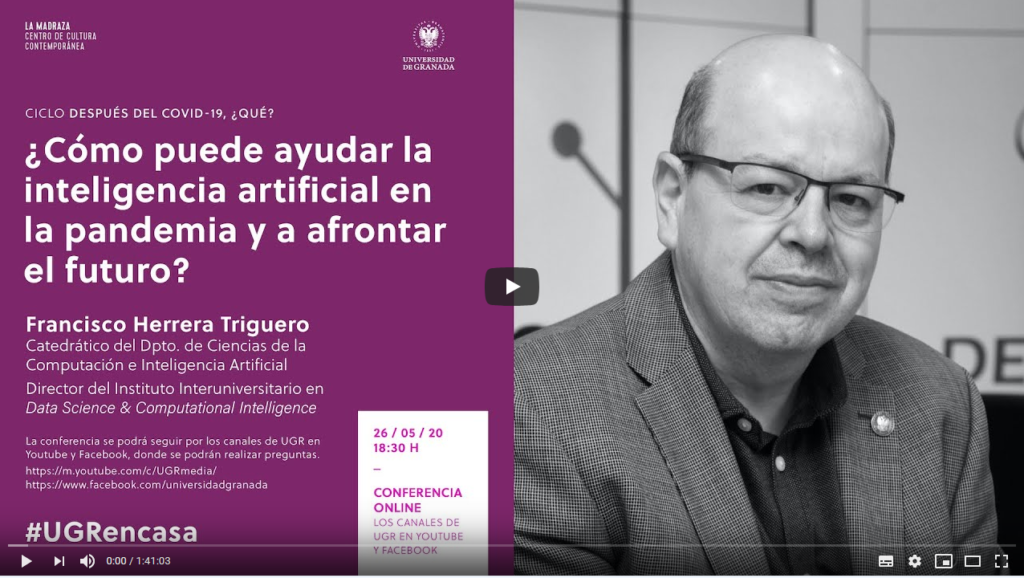
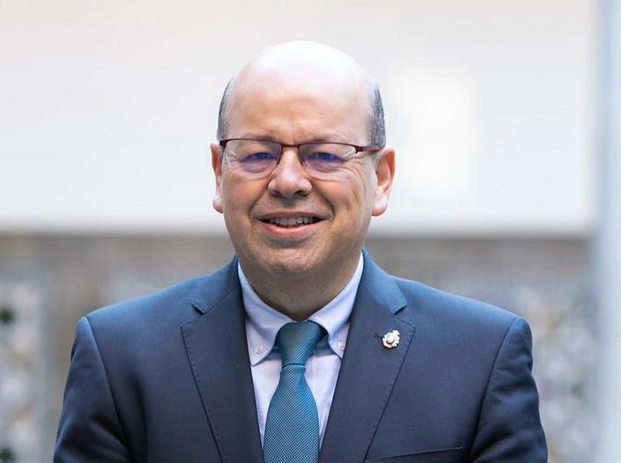
Francisco Herrera calls for the creation of “intelligent territories” to combat future viruses that “isolate” cities
1 May, 2020
The director of DaSCI defends that science will be the one to allow us to get out of the health crisis and that should be used in the economic field “as an engine of development”. He also urges the “digital transformation” of the city councils
The Digital Transformation of the city councils and the commitment to make cities and their metropolitan areas an Intelligent Territory can give us a boost in the Digital Economy Era, its penetration in society will accelerate in the coming times.
“Thanks to science we will get out of the crisis”
More information in LARAZON.ES (In Spanish)
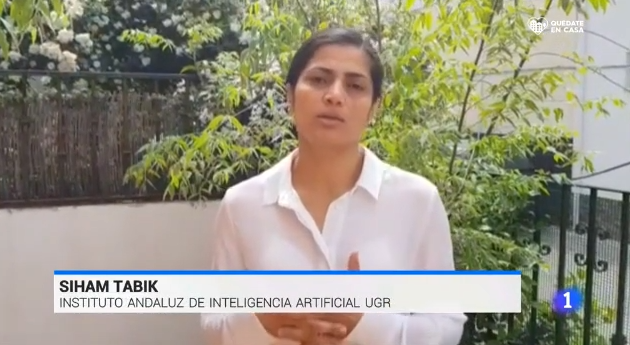
Diagnosing the COVID-19 only with X-rays
18 April, 2020
The Andalusian Research Institute on Data Science and Artificial Intelligence of the University of Granada (UGR) and the Radiodiagnostic Service of the San Cecilio Clinical University Hospital have developed an automatic system that allows the detection of Covid-19 through patients’ chest X-rays.
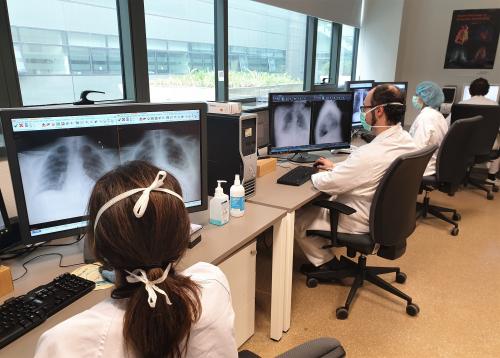
New Artificial Intelligence model has been developed in Granada to determine whether a patient suffers from COVID-19
16 April, 2020
The Andalusian Research Institute on Data Science and Artificial Intelligence of the University of Granada (UGR) and the Radiodiagnosis Service of the San Cecilio University Hospital are working on the development of an automatic system to detect the pulmonary affectation produced by Covid-19 through the patients’ chest X-rays.
With a reliability of 80% we are currently working to further increase this percentage in the coming weeks.
Ideal de Granada (in Spanish)
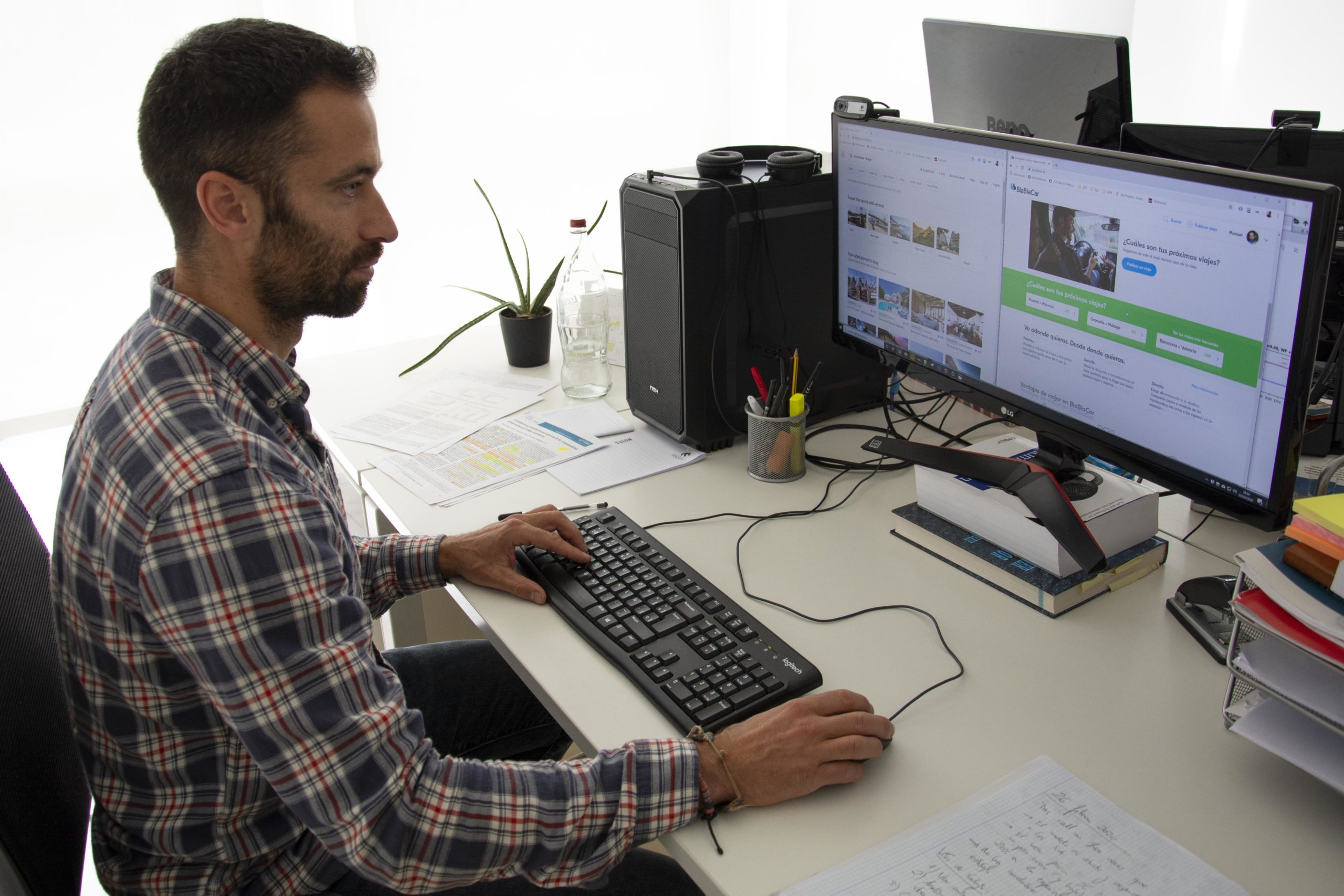
Researchers from the UGR apply AI techniques for the sharing economy platforms to find out how they manage user trust
11 March, 2020
A group of researchers including Manuel Chica, a researcher at the Institute, has published “Nature Scientific Reports” an article in which they develop their research by applying artificial intelligence techniques to collaborative economy platforms such as Airbnb or Blablacar in order to understand the mechanisms that govern them.
Researchers from the University of Newcastle (Australia) and the Technischen Universität Berlin (Germany) have also participated in this work.
In recent years the number of collaborative economy platforms such as Airbnb or BlaBlacar has increased enormously, changing the way we travel, go on holiday or stay. So much so that the collaborative economy (‘sharing economy’ in English) has shaped our current society and influenced government and business decisions. The Internet and the use of mobile apps have facilitated the development of the collaborative economy, increasing the number of users and existing applications and platforms.
More info (In Spanish)
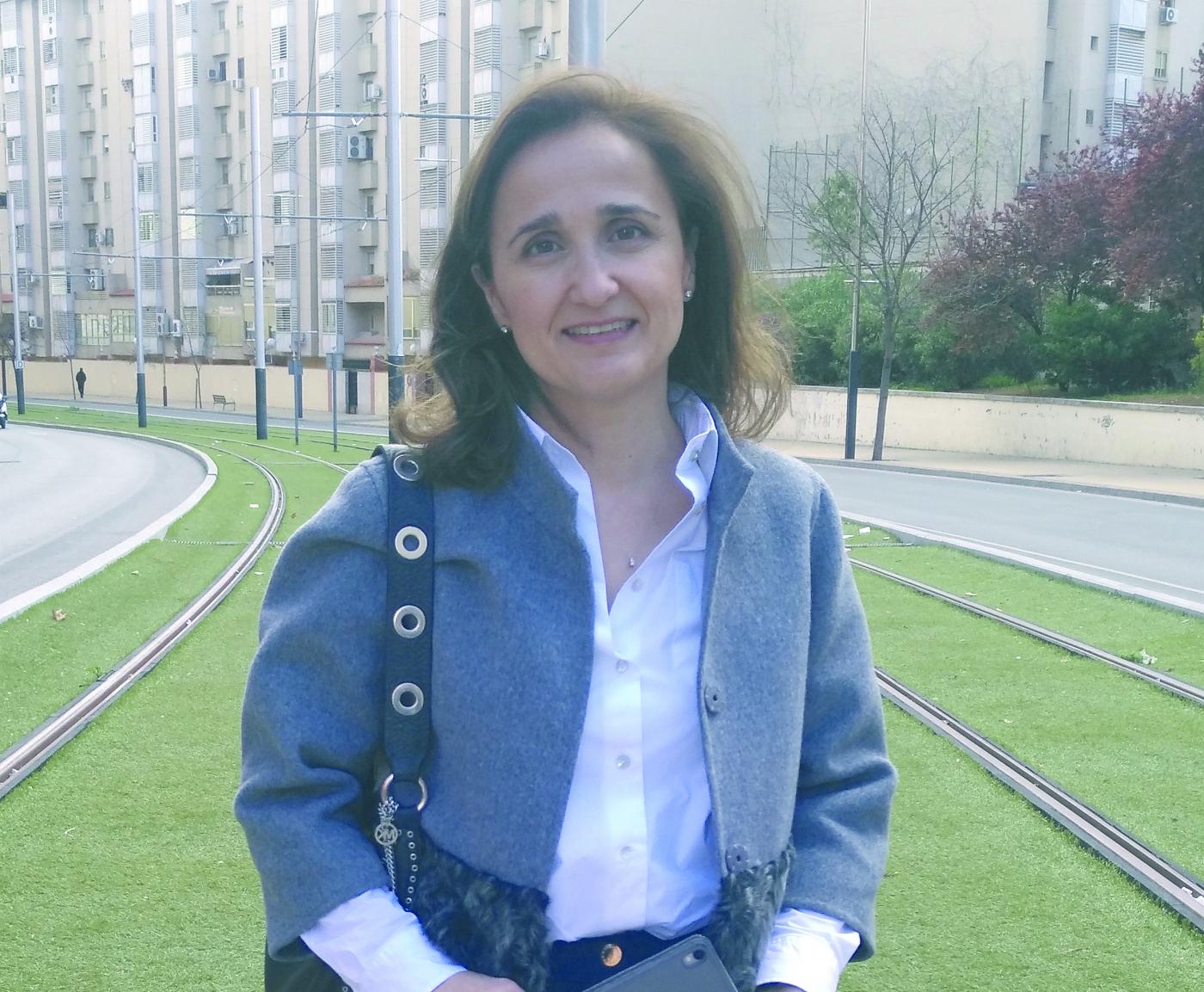
“Women need to be part of the digital transformation as well”
10 March, 2020
María José del Jesus Díaz, the only professor of the Area of Computer Science and Artificial Intelligence at UJA, and a founding member of the DaSCI Institute.
“Currently there is a very low percentage of students in degrees linked to engineering, and the percentage is even lower than when I was studying. I think this is a major problem because all fields should benefit from the female and male perspective. Women must be part of the digital transformation and the AI momentum in which we are immersed.”
Read the full article in the Andalusian digital newspaper Información (In Spanish).
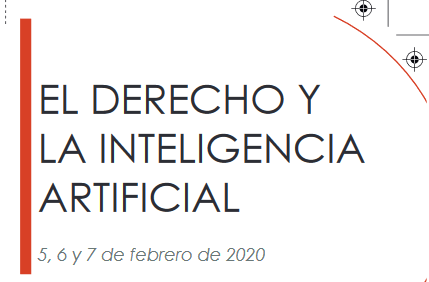
Researchers of DaSCI Institute participate as speakers in the Course on Law and Artificial Intelligence organized by the University of Granada and the Superior Council of the Judiciary
5 February, 2020
During these days the Law School will host important references from the world of Law and Artificial Intelligence (AI) in a course that will last until next Friday, February 7.
The course is called “Law and Artificial Intelligence”. Francisco Herrera, and Oscar Cordón , both leading researchers of AI in Spain and DaSCI .
The ETS of Computer and Telecommunications Engineering of Granada is ranked in the fifth position in the world of research in AI. On the other hand, Granada is currently the judicial capital of Andalusia and one of the most important and oldest Spain’s law schools is in Granada. In this context, this event aims to be a national and international reference.
More information Canal UGR and Canal Sur News (in Spanish, startin at minute 8)
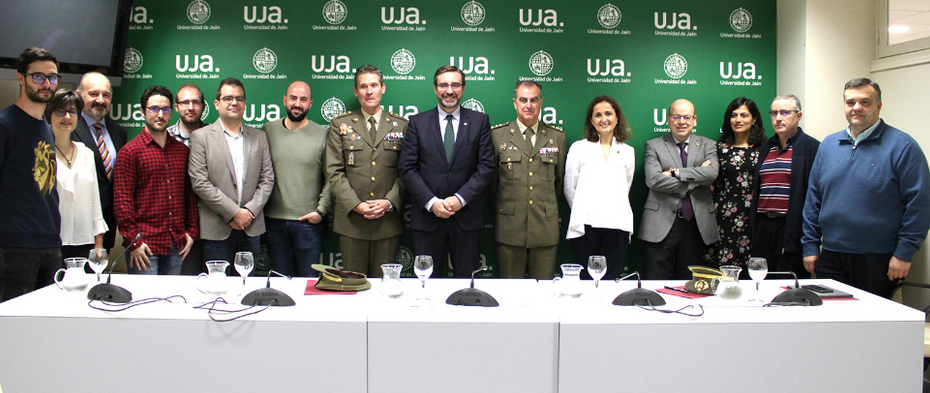
The project “CUSTODES. Intelligent systems for image processing and threat detection in conflict scenarios” is presented in Jaén
5 February, 2020
Led by researchers from the Institute, this project aims to develop software that will enable the Ministry of Defence to have Artificial Intelligence systems for decision-making.
The project will be led by María José del Jesus and Francisco Charte as co-directors of the University of Jaén and Francisco Herrera and Siham Tabik as co-directors of the University of Granada. The rest of the research team is composed of six members of DaSCI.
The tool to be developed with Artificial Intelligence techniques aims to identify significant elements and anomalies in conflict scenarios from images from different sources and with different typology. In the words of María José del Jesus “”we propose a project centred on one of the R+D themes contemplated in the call for proposals from the Ministry of Defence. “The project tries to contribute to give an answer to some of the needs of the 2035 Brigade of the Spanish Army. In this scenario, Defense can benefit from the development of tools that integrate and merge this information and optimize the management of these large volumes of data and learn models to have complete knowledge of what is happening in a given area and help in the decision making process”
Without a doubt, this is a new challenge for the Institute that will allow us to continue researching and finding synergies with sectors that are a priori as distant as the military.

Artificial Intelligence to identify human remains
18 December, 2019
Óscar Cordón, Professor of Computer Science and Artificial Intelligence at the UGR and meber of the DaSCI Institute, has been working since 2005 with a group of researchers from different disciplines such as anthropology or forensic medicine, in the automation of the process of identifying human remain by applying Artificial Intelligence techniques. More details in regional TV News “ConCiencia” (Canal Sur)
Full story in Canal UGR (in Spanish)
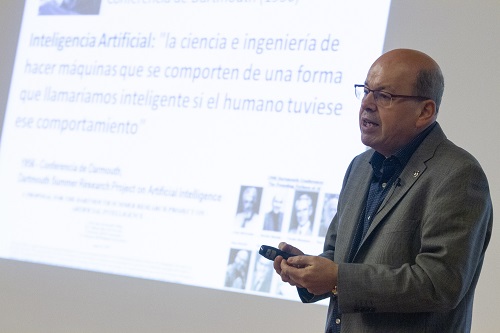
Challenges of Artificial Intelligence in the framework of South Tech Week 2020
18 December, 2019
The “South Tech Week 2020” will take place in Granada 11-12th March 2020. This event will bring together more than 1000 people. The venue will be the “Palacio de Congresos” of our city. This event was announced on Tuesday at the Computer Science and Telecommunications Engineering building of the University of Granada.
After the presentation of the event Francisco Herrera (director of our Institute) gave a lecture on “Challenges of Artificial Intelligence”.
For Francisco Herrera, “AI is a technology that will transform our society and will have an impact on all areas of knowledge. It will mean a revolution similar to the one that provoked the Internet”. In DaSCI we focus our efforts in three areas of Artificial Intelligence (AI): Data Science, Computational Intelligence and technological applications based on AI.
More info in canal UGR and Periódico Ideal (in Spanish)
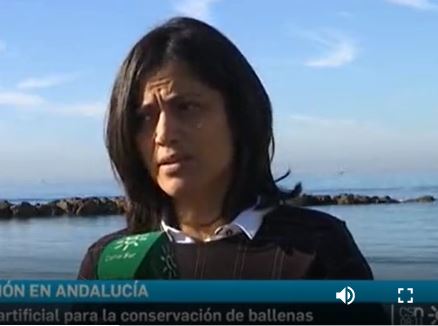
Artificial Intelligence to locate and count whales
3 December, 2019
Researchers from the Institute in collaboration with researchers from Almeria have developed a tool that allows us to locate and count whales.
Canal UGR (In Spanish)
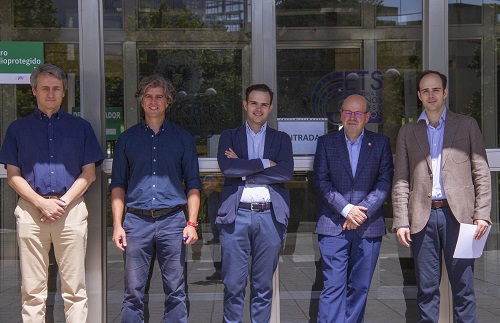
UGR will lead a European Project for the creation of ultra-light intelligent structures for use in aircraft and wind turbines
24 September, 2019
The ENHAnCE project, in which 9 European institutions are participating, has been financed with 2.67 million euros.
The coordination of a European project of the H2020 programme is a success for the University of Granada (UGR) and for the DaSCI Institute to which some of its principal researchers are affiliated. The consortium will be led by Professor Manuel Chiachío and made up of 9 top-level scientific and technological institutions: University of Granada (Spain), German Space Agency (Germany), University of Nottingham (UK), University of Strathclyde (UK), Milan Polytechnic (Italy), Delft University of Technology (Netherlands), CEA-Tech Institute (France), Belgian Centre for Aeronautical Research, Cenaero (Belgium), Foundation for Research, Development and Application of Composite Materials, FIDAMC (Spain).
The project will start on 1 January 2020 and will have a duration of four years and a funding of 2.67 million euros to be distributed among the different members of the consortium.
The principal objective of the ENHAnCE project is the development of technology for the creation of intelligent ultralight structures. These structures will have self-diagnostic and prognostic capacity in the form of cyber-physical systems, and will be applicable to aerospace structures, wind turbine blades, as well as other civil engineering structures such as bridges, towers, and so on.
More information in: IDEAL, LA VANGUARDIA, 20 MINUTOS y NOTICIAS UGR (In Spanish)
Agreement to launch the TECNALIA Endowed Chair in Artificial Intelligence at the UGR in the Andalusian News
19 September, 2019
Canal Sur News (In Spanish):
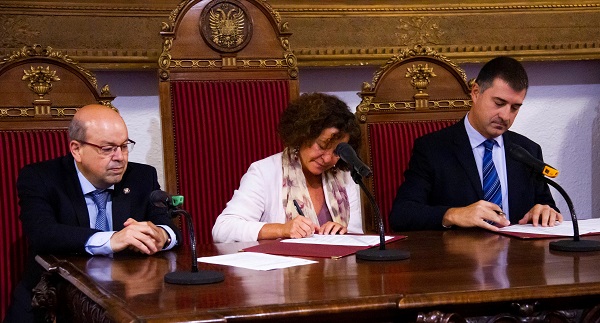
Agreement to launch the TECNALIA Endowed Chair in Artificial Intelligence at the UGR
17 September, 2019
The rector of the University of Granada (UGR), Pilar Aranda and TECNALIA’s Deputy Director General of Technology, Jesús Valero, have signed a collaboration agreement for the creation of the “TECNALIA Chair in Artificial Intelligence” which will be endowed with 50,000 € per year.
For more information: Actualidad Canal UGR , IDEAL (In Spanish)

Rioja wineries miss out on Twitter communication possibilities, according to a study by UNIR and the University of Granada
22 July, 2019
A study focusing on the Rioja Qualified Designation of Origin (DOCa) carried out by UNIR Marketing professor Carmen Zarco and the expert from the University of Granada, Óscar Cordón, shows that only around 32% of the wineries affiliated to this Designation have a Twitter profile, although not all of them develop active and direct communication.
View in Europa press (content in spanish)
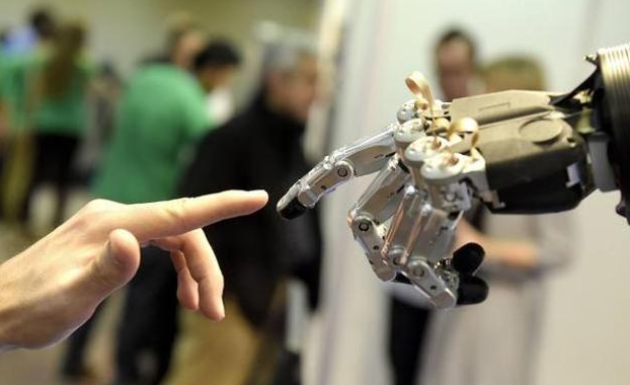
The Andalusian Council of Universities (CAU) has approved the creation of s the Andalusian Research Institute on Data Science and Computational Intelligence, by the Universities of Jaén (UJA) and Granada (UGR).
5 June, 2019
According to a press release from the Delegation of the Regional Government of Andalusia in Jaen, this institute will research in two major fundamental areas, Data Science and Computational Intelligence, two areas of great projection in the field of international research and with scientific recognition at the universities of Jaen and Granada.
For more information: 20minutos, IDEAL, and esandalucia (in Spanish)
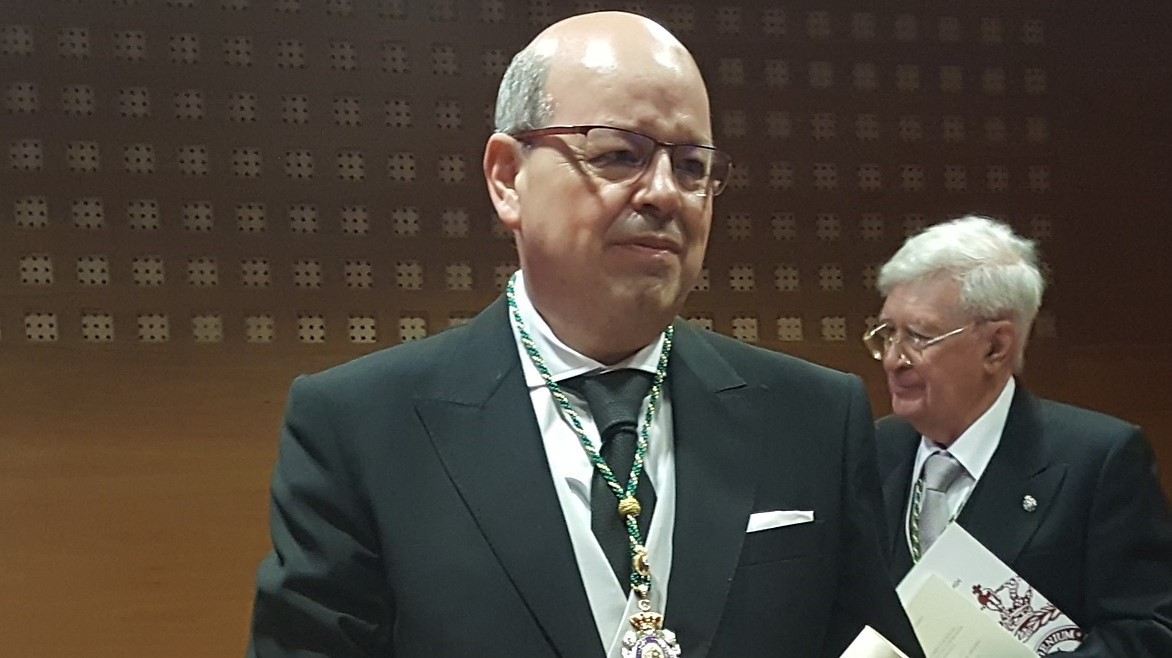
The director of the DaSCI Institute, Francisco Herrera becomes a member of the Royal Academy of Engineering of Spain
22 May, 2019
Francisco Herrera Triguero, Professor of Computer Science and Artificial Intelligence at the University of Granada (UGR), joined the Royal Academy of Engineering of Spain yesterday as a full member of the academy, in an event that took place at the headquarters of the institution in Madrid and was attended by the rector of the UGR, Pilar Aranda.
More information in Noticias UGR (in Spanish)
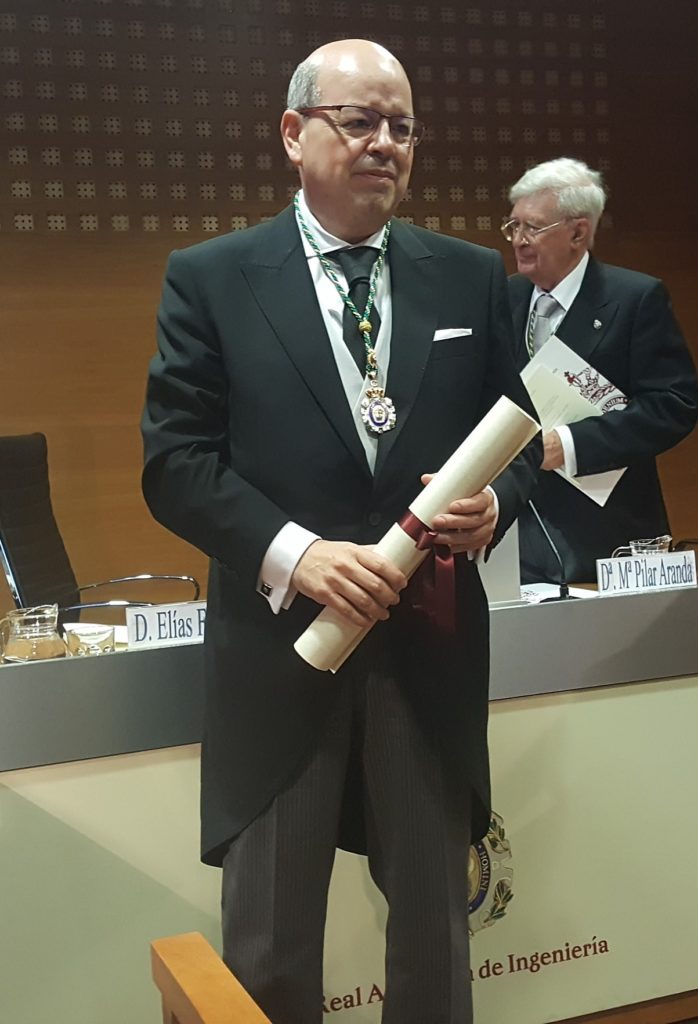

A UGR Study on the use of algorithms for security and ecology granted by BBVA Foundation
17 May, 2019
The BBVA Foundation grants with 100,000 euros a research project at the University of Granada (UGR) called ‘Deep Learning’ applied to Security, Ecology and Natural Language’, coordinated by Francisco Herrera Triguero, professor of the Department of Computer Science and Artificial Intelligence.
The aim of this project is to generate high quality data for Deep Learning models, obtain algorithms that improve the understanding of these models and apply this knowledge in areas such as Security, Ecology and Language.
More information in NovaCiencia (In Spanish)
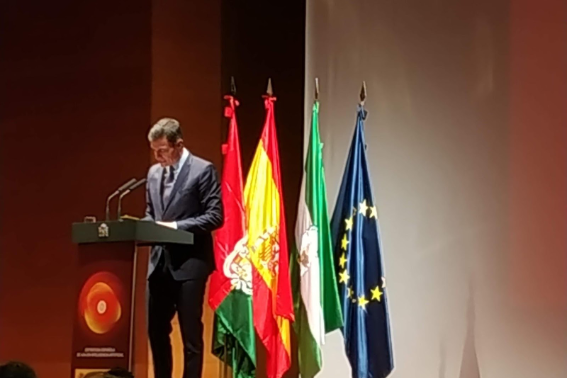
Presentation in Granada of the Spanish R+D+I Strategy in Artificial Intelligence
4 March, 2019
On Monday 4 March, 2019 the Spanish Strategy for R+D+I in Artificial Intelligence was presented in Granada.
The event, took place in the Palacio de Exposiciones y Congresos, was presided over by the Minister of Science, Innovation and Universities, Pedro Duque, and closed by the President of the Government, Pedro Sánchez.
More information (in spanish):
Coral del Val explains “the identification of genes related to human personality” in ‘InquietaMENTE’ by RNE-5
7 February, 2019
Go to https://dasci.es/mediateca/coral-del-val-explica-la-identificacion-de-genes-relacionados-con-la-personalidad-humana-en-inquietamente-de-rne-5/ (in Spanish)
The occult face of big data: from prediction to social manipulation
29 January, 2019
Go to https://dasci.es/mediateca/la-cara-oculta-del-big-data-de-la-prediccion-a-la-manipulacion-social/ (in SPanish)
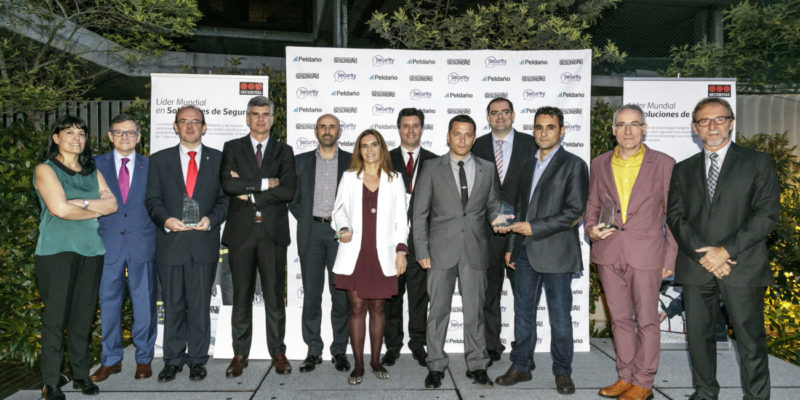
First prize CAEPIA 2018 in Competition of Apps based on Artificial Intelligence by the App MonuMAI
1 January, 2019
First prize: Francisco Herrera, Álvaro Martínez-Sevilla, Siham Tabik, Rosana Montes, Alberto Castillo Lamas, Teresa Cruz Sánchez, José Policarpo Cruz.
MonuMAI: an app to increase the social value of Andalusian architectural heritage.
MonuMAI is a mobile application (app) that is developed within the framework of a Citizen Science project of the same name. The aim of the app is to develop an intelligent system to recognize the different artistic styles and provide information and relationships on the proportions and ‘other geometric elements in art …

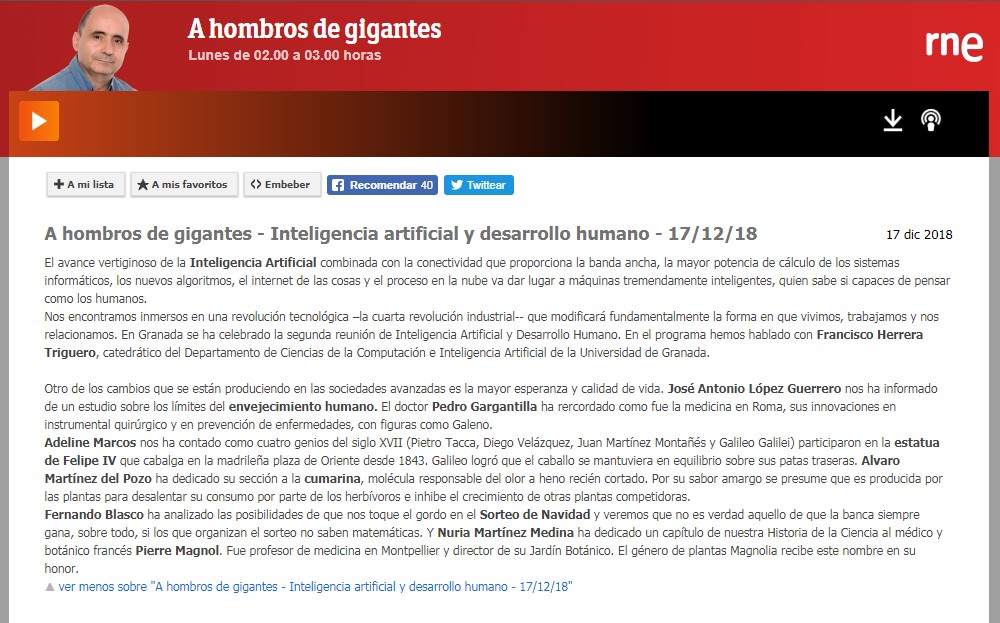
Francisco Herrerra in “A Hombros de Gigantes”, National Radio of Spain
1 January, 2019
Go to https://dasci.es/mediateca/francisco-herrerra-en-a-hombros-de-gigante-de-radio-nacional-de-espana-17-de-diciembre-de-2018/ (in Spanish)
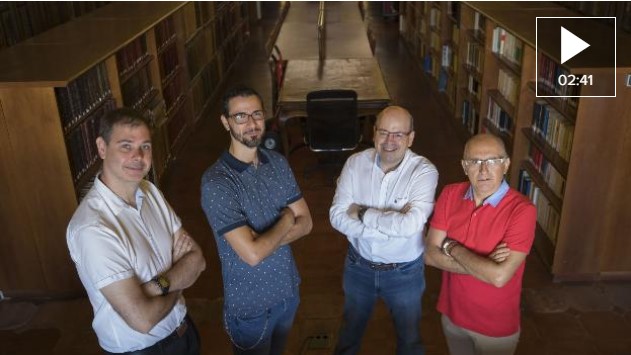
The highly cited professors Francisco Herrera, Enrique Herrera, Salvador García and Alberto Fernández are key players in the raise of the University of Granada in the Shanghai Ranking
28 October, 2018
Links to IDEAL, a spanish Newspaper:
Vídeo en Ideal: https://www.ideal.es/miugr/prestigio-ranking-proyeccion-5841464313001-20180928100925-vi.html
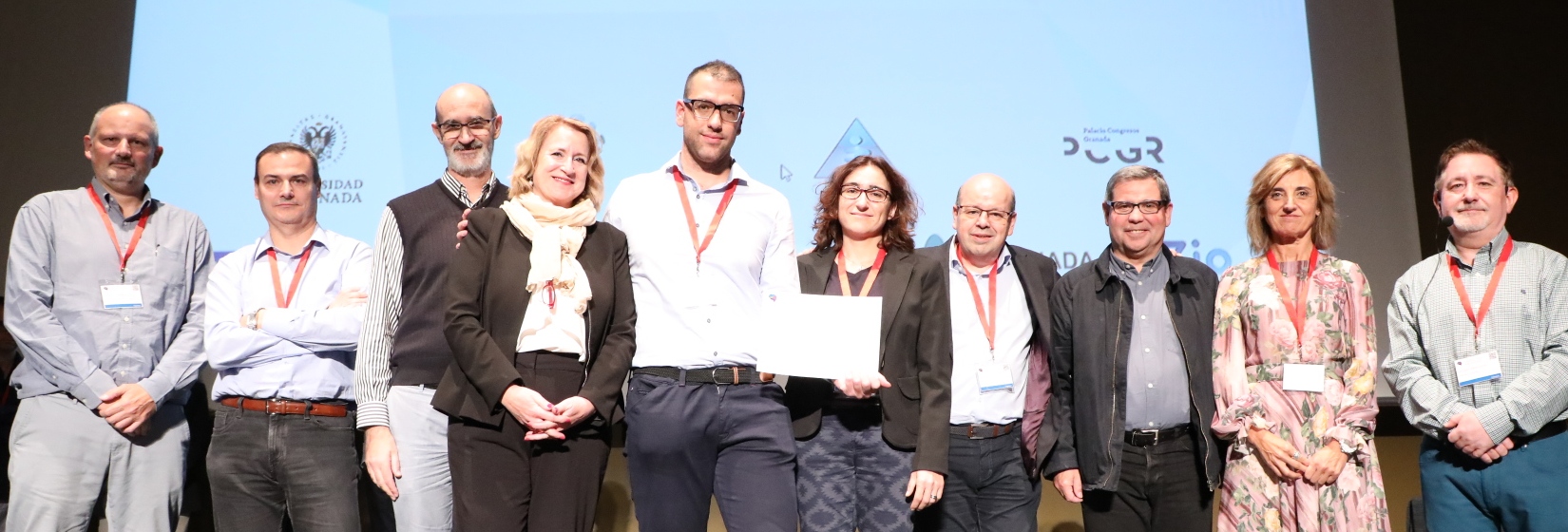
CAEPIA 2018 Awards
27 October, 2018
First prize of the CAEPIA 2018 Competition of Apps based on Artificial Intelligence by the App MonuMAI Francisco Herrera, Álvaro Martínez-Sevilla, Siham Tabik, Rosana Montes, Alberto Castillo Lamas, Teresa Cruz Sánchez, José Policarpo Cruz. MonuMAI: an app to increase the social value of Andalusian architectural heritage
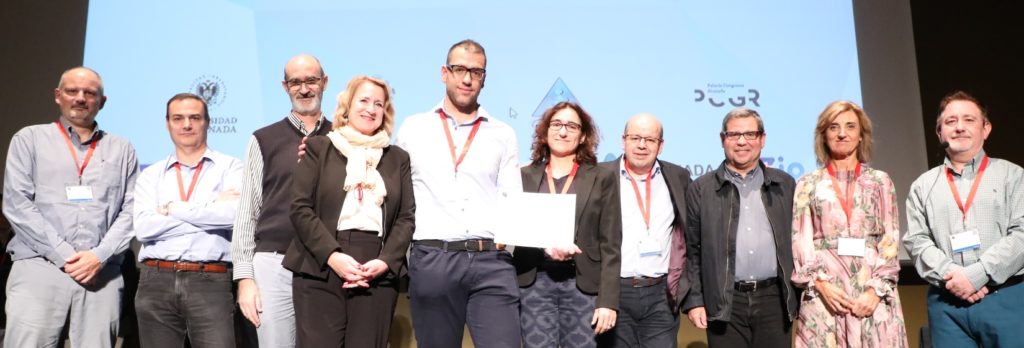
https://sci2s.ugr.es/caepia18/premiados.html#apps (Link a Spanish Media)
This is how MonuMAI’s app looks like
26 October, 2018
Go to https://dasci.es/mediateca/asi-se-ve-la-app-de-monumai/ (in Spanish)
CAEPIA 2018
25 October, 2018
Go to https://dasci.es/mediateca/caepia-2018/ (in Spanish)
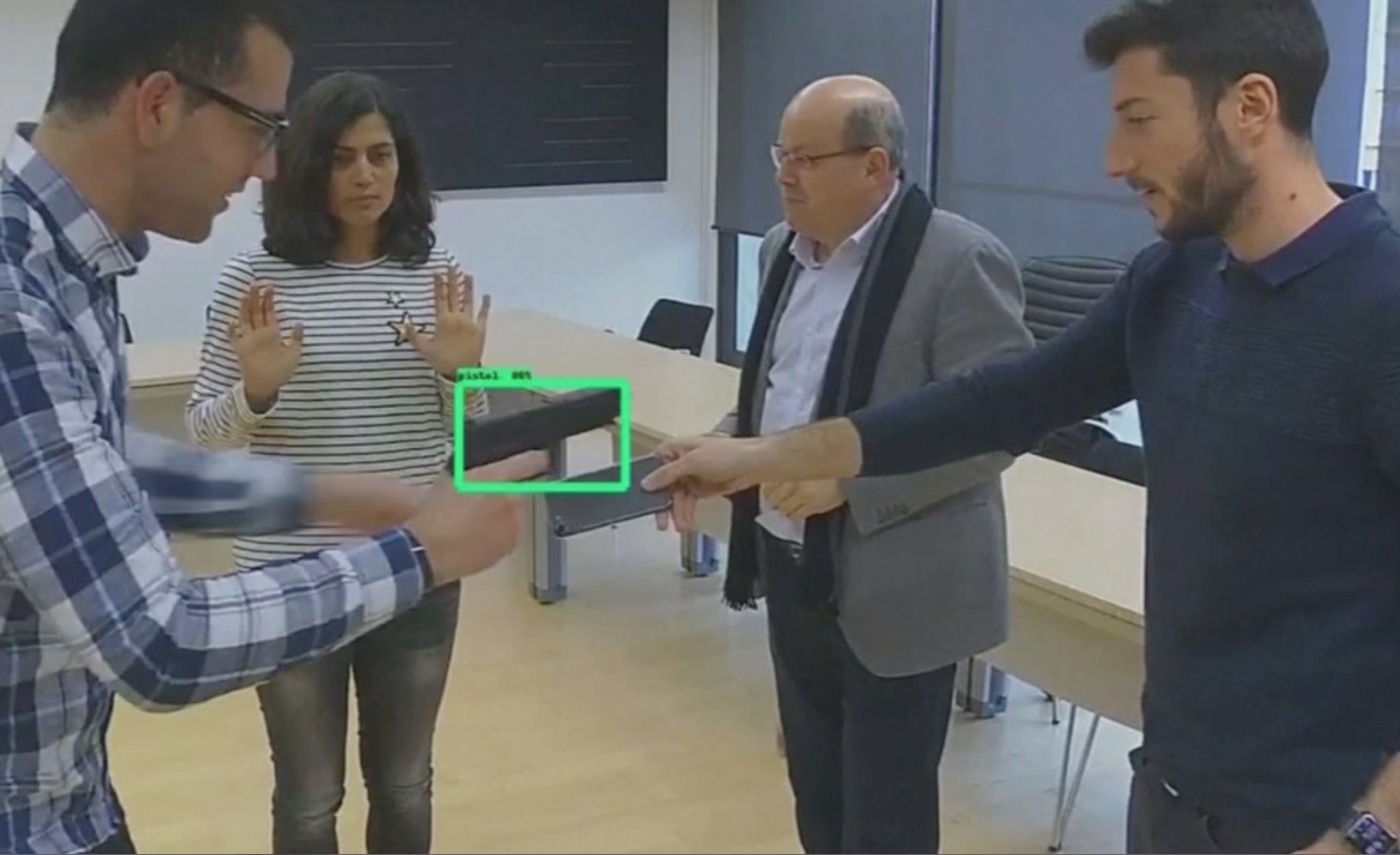
REUTERS: AI system that spots guns in real-time video could help airport security
27 March, 2018
University of Granada (UGR) researchers have designed a computer algorithm that automatically recognises guns on video in real-time, as Jim Drury reports.
Videos Conference Future Challenges 2018
14 March, 2018
“Artificial Intelligence in Defense Technology”
http://www.ejercito.mde.es/multimedia/Videos-2018/RRFF/05-factor-ind-tec.html (Link to video in Spanish)
Coffeeversity: “Artificial Intelligence: Reality and Fiction”
7 March, 2018
Go to https://dasci.es/mediateca/coffeeversityinteligencia-artificial-realidad-y-ficcion/ (in Spanish)
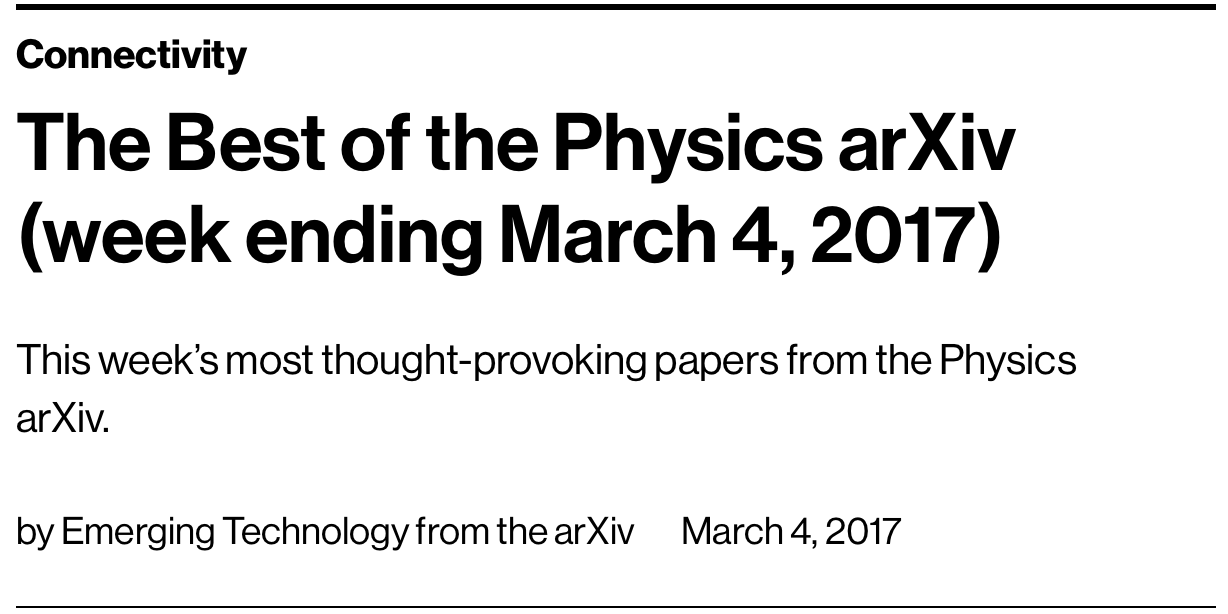
Featured from MIT in its technology review portal “The Best of Physics arXiv”: Automatic Handgun Detection Alarm in Videos Using Deep Learning
16 February, 2018
https://arxiv.org/abs/1702.05147
Current surveillance and control systems still require human supervision and intervention. This work presents a novel automatic handgun detection system in videos appropriate for both, surveillance and control purposes. We reformulate this detection problem into the problem of minimizing false positives and solve it by building the key training data-set guided by the results of a deep Convolutional Neural Networks (CNN) classifier, then assessing the best classification model under two approaches, the sliding window approach and region proposal approach. The most promising results are obtained by Faster R-CNN based model trained on our new database. The best detector show a high potential even in low quality youtube videos and provides satisfactory results as automatic alarm system. Among 30 scenes, it successfully activates the alarm after five successive true positives in less than 0.2 seconds, in 27 scenes. We also define a new metric, Alarm Activation per Interval (AApI), to assess the performance of a detection model as an automatic detection system in videos.


